- Our Approach

Metasearch And Travel: What You Need To Know

The core of the internet is based on the amount of information generated each day. There is hardly anything that can’t be researched using the various search engines at our disposal.
Metasearch engines act as a middle platform. They are available as separate websites that take queries from the visitors. These queries are then used to produce search results that are based on data from another search engine. Metasearch engines are also known as aggregators. They work the same ways normal search engines do but the accuracy of the results can often be not as good. These engines merely take input from the users and send them to third-party search engines. The data obtained from the third-party engines is formatted and ranked accordingly to be presented to the users.
Advantages of Metasearch Engines
Metasearch engines have a few advantages due to which they are rapidly gaining popularity in the internet world.
Metasearch engines don’t merely use one source as their third-party search engine. The queries are sent out to several search engines. Therefore, a single and specific topic can be covered more widely. As a result, the researcher will have more information at their disposal, increasing the chances of finding what they are looking for.
On the other hand, these results are obtained with less amount of exertion. Instead of searching one single search engine to find a specific link or browsing through several, the right amount of information can be obtained through one platform.
The metasearch engine trend has been around for a while. However, it has been recently gaining momentum in the travel and hospitality industry.
More and more people prefer making plans on the go. As a result, internet research for travel options is very common. According to a web analytics firm, a trip planner will visit a travel website an average of 21 times before booking a trip. We can safely say that this new trend is disrupting the travel industry.
Commercial travel companies like Priceline and Expedia find an ideal opportunity with this trend to increase customers and help them book trips faster. Without a metasearch engine, booking trip normally can be a tedious task. Travel metasearch engines make it easier to compare options and find what suits the requirements of the traveler in the best possible way.
The trend seems to be lucrative as far as commercial travel companies are concerned. This can be proven by the fact that Priceline acquired Kayak and Expedia bought Trivago.
How does Metasearch Work in The Travel Industry?
In terms of the travel industry, a metasearch engine is used to compare Online Travel Agencies or OTAs. Metasearch engines like TripAdvisor and Kayak make money by the fee paid to them by the OTA. Let’s say that an online trip planner booked a certain OTA through TripAdvisor. This will result in payment to TripAdvisor by the OTA that was booked.
Users input queries based on their requirements in these travel metasearch engines. Results will be provided filtered according to rates parity, the length of the trip, location, check in date, etc.
In other cases, a metasearch engine may also be paid by a hotelier to promote their brand. Elite SEM can work with each of these metasearch engines to manage ongoing promotion of your hotel brand.
Why is Metasearch a Booming Trend in the Travel Industry?
As mentioned before, booking a trip manually can be tedious. When planning to travel, people have different requirements part from what their budget is. They may have different goals like a romantic weekend, Honeymoon trip, corporate trip, a casual escape, a family vacation or wedding destination. Metasearch engines for travel industry make it easy to narrow down your options for finding the best choice meeting the requirements of the user.
Metasearch engines will produce results for hotelier brands and locations that not only fit your travel budget but meet specific requirements as mentioned in the above requirements. It is fairly easier to put in the requirements because one does not have to find appropriate keywords or key phrases at most times. Instead, these metasearch engines provide categories that can be chosen before hitting the search button.
Apart from that, these platforms are also a great source for marketing and promotion purposes. They post information and reviews for specific locations and hotelier brands. These posts are focused on highlighting the travel aspects and attracting the right target audience. On the other hand, customer reviews are beneficial for potential trip planners.
Google and Metasearch for Traveling
In an attempt to dominate the hotel finder sector as well, Google has introduced its very own metasearch, Google Hotel Ads. Google has many developments underway that will be ultimately beneficial for their hotel finder.
Their biggest rival as of now is TripAdvisor. TripAdvisor has the ability to attract 60 million unique visitors on a monthly basis.
The advantage comes to TripAdvisor because they are providing far more categories for metasearch to their users than any other similar platform. With TripAdvisor, it is far easier to narrow down search results according to the narrowest of specifications from the users. Furthermore, the platform also provides a massive amount of review data, which is quite useful for potential trip planners.
Metasearch for the travel industry is highly positive. The benefits not only come for OTAs, hotelier brands and tourism departments but for the travel enthusiasts as well. In a world where the market is saturated and enough time is not available for users to compare the best deals, metasearch provides an easier solution. Moreover, many such platforms are also available in forms of smartphone applications. Therefore, it has become possible for people to compare suitable deals and trips on the fly.
Want to learn more about Search? Read our case study on how Paid Search and Shopping helped Barneys.com see a ROAS increase of 30% .
You Might Be Interested In

How to Prepare for Amazon Prime Day 2024: Seller’s Guide

Tinuiti Marketing Analytics Recognized by Forrester
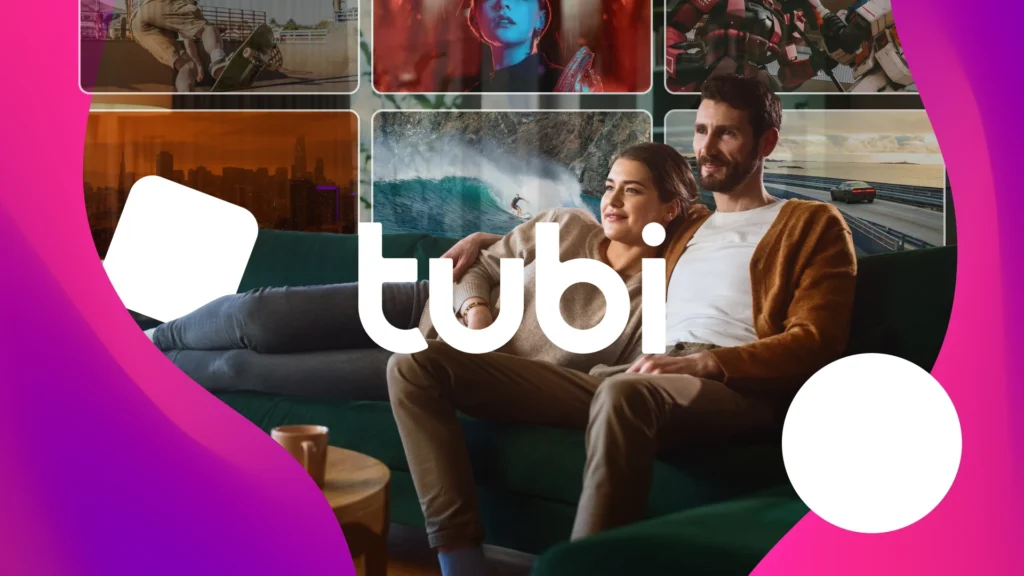
Tubi Advertising Guide: How it Works & Ad Costs

Roundel Media Studio: What to Expect From Target’s New Self-Service Platform

What’s Advertising Video on Demand (AVOD) & How Does It Work?

What’s Media Mix Modeling? [Marketer’s Guide with Examples]

What Are Free Ad Supported TV (FAST) Streaming Services?

Amazon Trends & Industry Predictions for Sellers
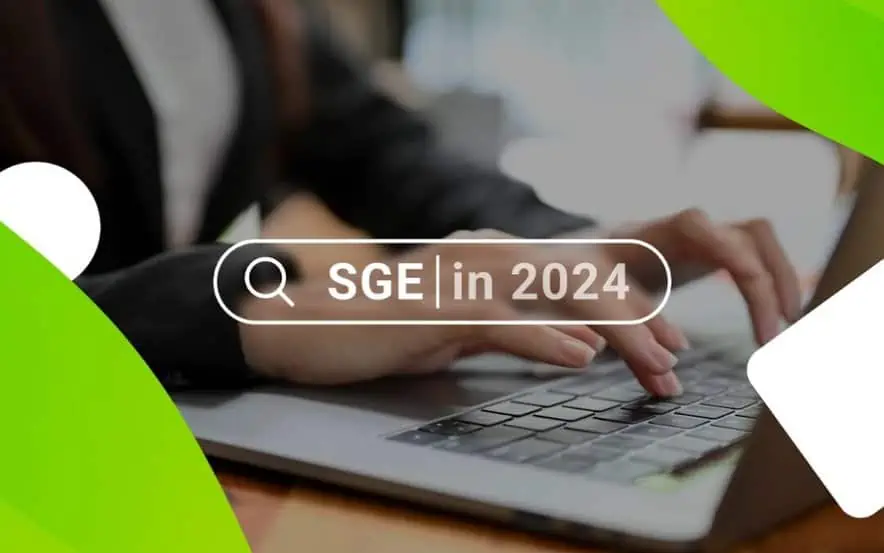
The Current State of Google’s Search Generative Experience [What It Means for SEO in 2024]

Creative Strategy Guide: Best Practices for Business Growth
*By submitting your Email Address, you are agreeing to all conditions of our Privacy Policy .

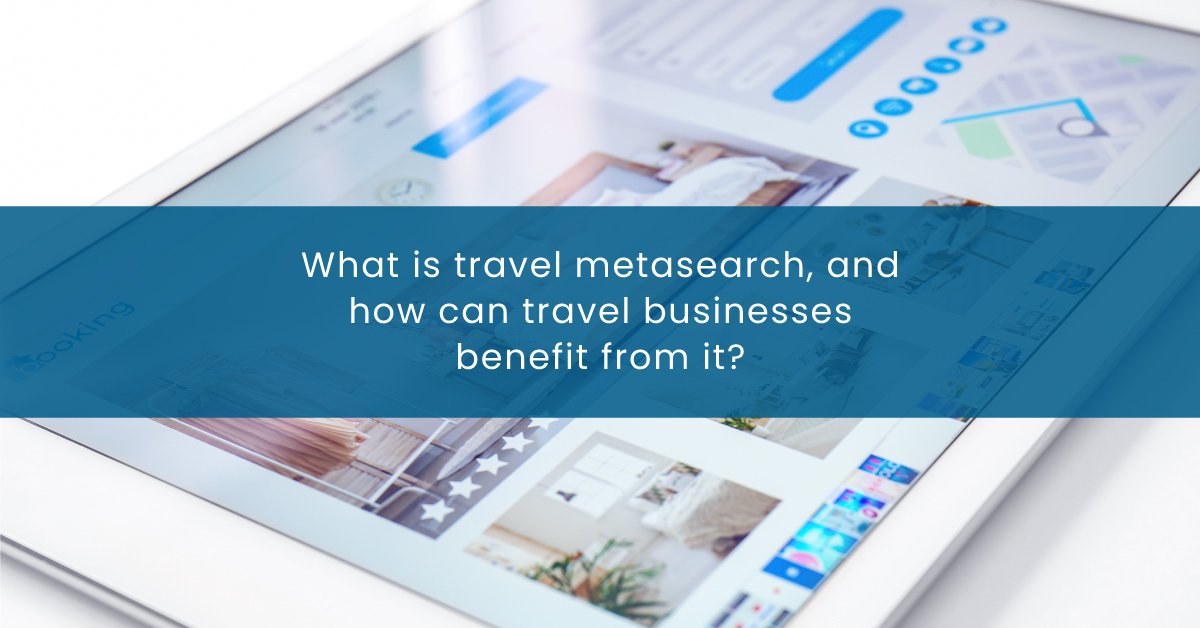
What is a travel metasearch engine, and how can travel brands benefit from it?
Travel brands are always on the hunt for new ways to attract travelers and direct bookings. They use display ads, search engine ads, native videos, and social media to drive engagement. An ideal marketing strategy would be to use a good mix of all these marketing channels. However, in today’s travel marketing scene, travel metasearch is emerging as a big platform to market. Metasearch advertising generated an economic value worth 6 billion USD in the last decade. As many as 60% of independent hoteliers consider metasearch the most effective marketing channel.
Here in this article, we dissect travel metasearch for you, what it is, how your brand can benefit from it, and conclude by listing major engines.
What is a travel metasearch engine?
For travelers, metasearch is a platform where they can get an aggregated list of available rooms and their respective rates, saving them the trouble of visiting every travel website individually and checking for rates.
Travel businesses see metasearch as a platform to market their brands and bring direct or sales-qualified leads to their website. Therefore, it also works as an acquisition channel. But please note metasearch is not a booking engine. It is a platform that pulls room rate and availability data from multiple sources on the internet. The bidding metasearch engine works on conventional CPC (Cost per click). You or your marketing representative will bid for your brand, and every redirection to your website will have a cost similar to how Google AdWords works.
How travel brands can benefit from metasearch engines
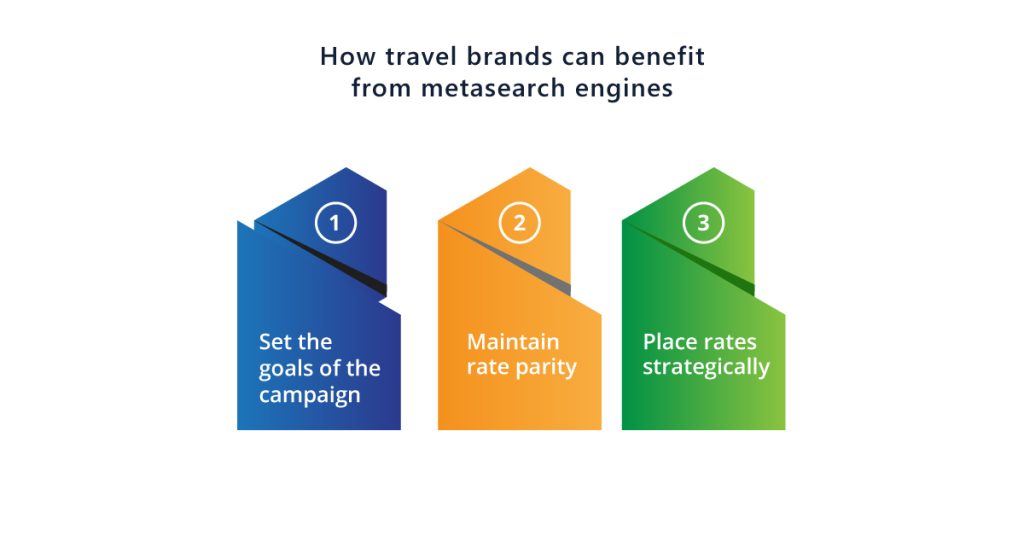
Metasearch can help travel brands in many ways. The brand can lift the conversion numbers without doing anything disruptive. Triptease report says “If your metasearch rates are accurate, your conversion rates can increase up to 300%”. It was about the ultimate outcome, but how do you activate it? As someone who’s just starting to use metasearch, what’s the ideal strategy to go ahead with? We are breaking it down for you in a three-tier approach, which will help you effectively get started with travel metasearch.
- Set the goals of the campaign
Implementation of metasearch certainly boosts direct booking numbers, yet to make it a success, you have to set realistic expectations and plan your future budgets accordingly. For instance, if you are 10% direct booking, with metasearch, you can aim around 13-14%, take 5-7x return on ad spend for metasearch. Then, start the campaign. Once your campaign matures, you will have a clearer picture of how to adjust the budget.
- Maintain rate parity
Travel metasearch engines optimize the rate to the user’s location and currency. Therefore, the odds of rate differentiation go higher, and if you are not keeping rate parity, you are giving your competition free winning edges. That’s why you must maintain rate parity across your distribution channels.
- Place rates strategically
Placements of rates can have significant impacts on conversion. Only the advertisement competitive rates on metasearch will not be enough. When potential travelers land on your page, you must ensure that the first rate they see matches your advertised rate. The pricing technique is also famous with the name BAR (Best available rate) – always show BAR first.
What are major travel metasearch engines, and who owns them?
If we talk in terms of crude numbers, there are five major metasearch engines, Google Hotel ads planner, Tripadvisor, Skyscanner, kayak, and Trivago. Let’s look at them objectively one at a time.
- Google Hotels
Google Hotels is arguably the market leader. The metasearch engine leverages google maps and Gmail to offer personalized recommendations to travelers. Google Hotels delivers travelers price tracking and deals directly to their inboxes.
- TripAdvisor
TripAdvisor is also a well-known travel metasearch engine. You should have your TripAdvisor account up and running as soon as your hotel starts accepting bookings. The existence of your hotel brand on Tripadvisor gives you wider reach and acceptability. TripAdvisor Metasearch offers travelers direct booking and allows comparison shopping.
- Skyscanner
Skyscanner is both a metasearch engine and travel agency. The booking tool is quite popular among gen-Z and millennials. Skyscanner offers its users’ destination research and booking travel products like flights, hotels, and cabs.
- Kayak
Kayak is also both an online travel agency (OTA) and a metasearch engine. Kayak is a part Booking.com group, the group wholly owns the platform. Therefore, it’s not easy for other hotels to get ad placement on this metasearch engine. Though, hotels can get into partnerships with airlines and place packaged offerings on Kayak to derive the most value out of the metasearch engine.
- Trivago
Trivago is a proper metasearch engine that fetches room rates and availability from different booking sites and shows it in one place. It has a revenue model like Google Hotels, booking sites have to pay a fee every time a potential customer clicks on a specific offering.
Recommended: What Is Hotel Upsell Software? And How To Choose One?
Ownership of metasearch engines matters a lot. Apart from Google Hotel and Tripadvisor the other three engines, Skyscanner, Trivago, and Kayak, are retailer-owned, so they send the major share of direct traffic to their own website. At the same time, media-owned travel meta-search engines are democratic and run transparent bidding systems.
Metasearch is a powerful medium to get quality direct traffic to your travel website. Ideally, go with media owned metasearch engine and use the implementation strategy we mentioned earlier in this article. You will be all set to benefit from travel metasearch engines.
About Vervotech:
Vervotech is a leading Hotel Mapping and Room Mapping API that leverages the power of AI and ML to quickly and accurately identify each property listing through the verification of multiple parameters. With one of the industry’s best coverage of 98% and an accuracy of 99.999%, Vervotech is quickly becoming the mapping software of choice for all leading global companies operating in the travel and hospitality industry. To learn more about Vervotech and the ways it can enhance your business in the long run contact us: [email protected]
Previous Post Hotel property management system: Key features to look for and benefits
Next post 40+ different hotel content attributes that users check before booking a hotel , related posts.
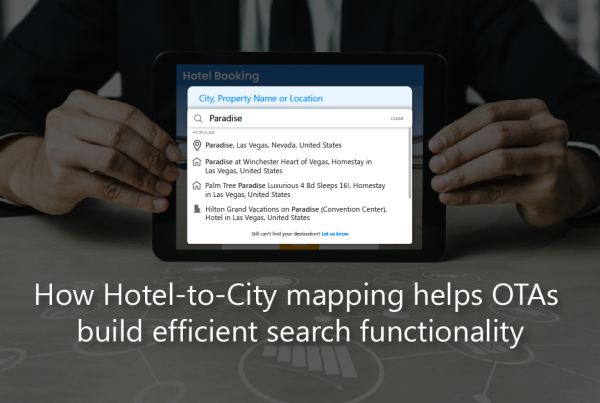
Six economic theories to handle demand fluctuations in OTA operations
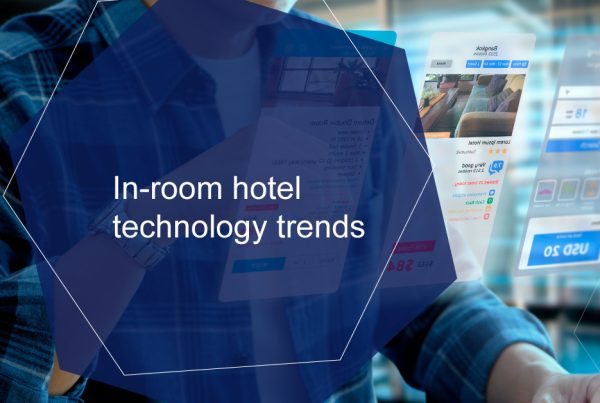
Six leading in-room hotel technology trends in 2024
Comments are closed.
For Sales Enquiry
- For US/Canada: 1 (833) 451-5836
- For Other Countries: +91 9923592502
- [email protected]
- Hotel Mapping
- Room Mapping
- Hotel Curated Content
- Press & Media
- Tech Partner
- Supplier Partner
- Walkthrough Videos
- Documentation
- Case Studies
- Infographics
Privacy Policy
Copyright © 2024 Vervotech Solutions Pvt. Ltd.
- Wall of Love
- Free Sample Data
- Brand Mapping
- Extranet Mapping
- Sync History
- Leadership Team
- Growth Story
- How We Innovate
- Values & Life at Vervotech
- Help Center
- Client Portal
- Provider Portal
- Contact Sales
Vervotech Affiliate Partner Application Form
Which Vervotech product(s) do you want to promote? Please select all that apply. Hotel Mapping Room Mapping Hotel Curated Content
What will you need to be successful partner? (for example: image assets, product training, brand guidelines, etc.)
I accept the
terms & conditions
REFERRAL PARTNER AGREEMENT
THIS REFERRAL FORM EXECUTED BY REFERRAL PARTNER WITH COMPANY AND BETWEEN VERVOTECH SOLUTIONS PRIVATE LIMITED, HAVING ITS REGISTERED OFFICE AT FIRST FLOOR, FLAT NO. 101, E BUILDING, RICH WOODS, PLOT NO. 150, SECTOR 11, PCNTDA, CHIKHALI, PIMPRI CHINCHWAD, PUNE, MAHARASHTRA, 411019, IN, (“THE COMPANY”) AND YOU AS AN INDIVIDUAL REFERRAL PARTNER OR ANY SOLE PROPREITOR, PARTNERSHIP, LIMITED LIABILITY PARTNERSHIP, PRIVATE LIMITED COMPANY OR PUBLIC LIMITED COMPANY OR ANY OTHER BUSINESS ENTITY EXECUTING THE REFERRAL FORM (“THE REFERRAL PARTNER”) IS GOVERNED UNDER THE TERMS OF THIS REFERRAL PARTNER AGREEMENT (“AGREEMENT”). PLEASE READ THIS AGREEMENT CAREFULLY. BY CLICKING “ACCEPTED AND AGREED TO” REFERRAL PARTNER AGREES TO THE AGREEMENT APPLICABLE TO THE REFERRAL FORM.
REFERRAL PARTNER ACKNOWLEDGES THAT IT HAS READ THIS AGREEMENT, UNDERSTANDS IT, AND AGREES TO BE BOUND BY ITS TERMS, AND IF THE REFERRAL PARTNER IS A PERSON WHO IS SIGNING ON ITS BEHALF HAS BEEN AUTHORIZED TO DO SO AND THE COMPANY DOES NOT HAVE ANY LIABILITY TOWARDS VERIFYING THE AUTHORITY OF THE PERSON WHO HAS SIGNED THE AGREEMENT ON BEHALF OF THE REFERRAL PARTNER.
APPOINTMENT REFERRALS
Appointment. Company hereby appoints Referral Partner, and Referral Partner hereby accepts such appointment, as Company’s non-exclusive referral partner for the marketing and promotion of Services and the referral of leads for the sale of Services, as further set forth in this Agreement.
Scope of Authority Referral Partner's sole authority shall be to (a) market and promote Services as set forth in this Agreement, and (b) provide sales leads to Company for Company to contact in its sole discretion. The Parties agree that Company will directly enter into agreements with customers for the provision of Services to such customers.
DUTIES AND RESPONSIBILITIES OF THE REFERRAL PARTNER
Prior to undertaking any solicitation efforts of a prospective customer or client ("Prospect”) relating to the services or products or offerings of the Company as set out at https://vervotech.com/vervotech-affiliate-program ("Services”), Referral Partner shall submit a referral form, in a format shared by the Company ("Referral Form”), for written approval of the Company. The Referral Partner agrees to provide the necessary information, data and materials as may be requested by Company in respect of the Prospect. Referral Partner shall fill out a Referral Form and shall provide Company with the names of the Prospect to which Referral Partner intends to refer to the Services). If the Prospect is a large business entity, Referral Partner shall specify the name of division of such large entity in the customer list.
If a Prospect is approved by Company as a potential customer, Company will confirm such acceptance or rejection of such Prospect in writing via email to Referral Partner (“Referral Date”). Notwithstanding anything to the contrary, the Company will be entitled to accept or reject a Prospect at its own discretion, without providing any justifications or reasons in relation to the same. For the avoidance of doubt, Company reserves the right to decline to enter into a transaction with any prospect for lack of creditworthiness or for any other reason. Prospect which are not approved by Company are considered out of scope of Referral Fee. In the event Company does not notify Referral Partner of acceptance of the Prospect, it shall be deemed to be rejected.
In case Company notifies Referral Partner of its approval of a Prospect, the Referral Partner will provide assistance to the Company in establishing contact between the Prospect and the appropriate contact at Company, without any additional costs.
If the foregoing activities result in the Prospect entering into and executing a formal customer agreement with Company (hereinafter, a “Qualifying Transaction”), Referral Partner shall be entitled to a Referral Fee subject to receipt of amount invoiced to the customer for sale of Services through Qualifying Transaction (hereinafter, a “Qualified Sale”) and subject to the other conditions set forth under this Agreement; provided, however, that such Qualifying Transaction is consummated no later than six (6) months following the Referral Date.
A Prospect may not qualify as such, if, as on the Referral Date: (a) it is an existing customer of Company; (b) it has previously been contacted by Company, Company’ s affiliates or any other agent, reseller, vendor who markets Company’ s products and services; (c) it has previously been introduced or referred to Company as a potential prospect by a third party or (d) it is parent, subsidiary or affiliate of Company.
RESPONSIBILITIES OF THE REFERRAL PARTNER
Limited Authority Referral Partner will make no representations, warranties or guarantees on behalf of Company. Referral Partner has no authority to distribute or resell Services, or to make any commitments, agreements, or to incur any liabilities whatsoever on behalf of Company. Company will not be liable for any acts, omissions to act, contracts, commitments, promises or representations made by Referral Partner hereto. Referral Partner's activities under this Agreement shall be at its own cost and risk. Referral Partner shall not, without prior approval from Company, submit proposals, accept orders, negotiate and conclude contracts, and/or alter, vary or modify in any manner any of the terms and conditions of Company' s offer/ proposal / contract.
Assistance. Referral Partner shall make best efforts in performance of its responsibilities under the Agreement and provide reasonable support to Company.
Quarterly Meetings. Referral Partner agrees to meet, either in person or via teleconference, no less frequently than once every calendar quarter to discuss the status of the relationship contemplated herein and emerging opportunities and as directed by Company from time to time.
Training. Company shall have no obligations to provide the Referral Partner any training regarding the Services. Upon request of Referral Partner and in case the Referral Partner is an organization, Company shall make good faith efforts to provide sales training focused on the marketing and promotion of Services to Referral Partner employees, at REFERRAL PARTNER’s own cost.
Subcontracting. Referral Partner shall not subcontract any of its obligations under this Agreement.
Competing Products and Business Practices. During the term of this Agreement, Referral Partner shall promptly inform Company of Referral Partner promotion, marketing, or distribution of any product or service offering similar functionality to Services. Referral Partner (a) shall conduct its business under this Agreement in a manner that reflects favorably upon Company, Services, and Company's goodwill and reputation, (b) shall not engage in illegal, deceptive, misleading, or unethical trade practices, and (c) shall not, and shall not permit any of its subsidiaries or affiliates, or any of its or their respective directors, officers, managers, employees, independent contractors, representatives, or agents to, promise, authorize, or make any payment, or otherwise contribute any item of value, directly or indirectly, to any third party and in each case, in violation of the applicable anti-bribery or anti-corruption law.
Data Protection and Privacy. In the performance of the services set forth herein Referral Partner may receive or have access to personal data of the Company and its personnel. Referral Partner agrees to comply with the terms set forth in this Agreement, in its collection, receipt, transmission, storage, disposal, use and disclosure of such personal data. Referral Partner agrees to ensure compliance with applicable laws, rules and regulations, including but not limited to laws, rules and regulations related to personal data protection and data privacy. To the extent the Referral Partner will share any personal data with the Company, the Referral Partner shall be responsible for obtaining informed consent from such individuals for the processing of their personal data. The Referral Partner agrees to take all necessary steps to ensure compliance, including but not limited to executing appropriate contractual agreements as may be necessary as per applicable laws.
REPRESENTATIONS AND WARRANTIES
Representations and Warranties. Referral Partner represents and warrants that (a) it has the full corporate right, power and authority to enter into this Agreement and to perform its obligations hereunder, (b) the execution of this Agreement and the performance of its obligations hereunder does not and will not conflict with or result in a breach (including with the passage of time) of any other agreement to which it is a party, and (c) this Agreement has been duly executed and delivered by such Party and constitutes the valid and binding agreement of such Party, enforceable against such Party in accordance with its terms. Referral Partner further represents and warrants that it shall comply with all applicable data privacy laws while performing its obligations under the Agreement, and that it has all rights necessary to provide the Referral Form to Company for Company’s use pursuant to this Agreement. Referral Partner specifically represents and warrants that it has procured from all data subjects whose personal information it is disclosing to Company an explicit consent to disclose their personal information to Company for use in contacting them for marketing and/or other business purposes.
GENERAL DISCLAIMERS- EACH OF COMPANY AND REFERRAL PARTNER ACKNOWLEDGES AND AGREES THAT, IN ENTERING INTO THIS AGREEMENT, EXCEPT AS EXPRESSLY SET FORTH HEREIN, IT HAS NOT RELIED UPON ANY WARRANTIES, EXPRESS OR IMPLIED, AND THAT NEITHER PARTY HAS MADE ANY REPRESENTATIONS, ASSURANCES, OR PROMISES THAT COMPANY WILL RECEIVE ANY NEW REFERRED CUSTOMERS OR NEW BUSINESS OR THAT REFERRAL PARTNER WILL RECEIVE ANY REFERRAL FEES AS A RESULT OF THIS AGREEMENT. COMPANY DISCLAIMS ALL REPRESENTATIONS AND WARRANTIES REGARDING THE SERVICES, WHICH ARE PROVIDED AS-IS, WHETHER EXPRESS, IMPLIED, OR STATUTORY, ORAL OR IN WRITING, ARISING UNDER ANY LAWS, INCLUDING WITH RESPECT TO ERROR-FREE OPERATION, MERCHANTABILITY, FITNESS FOR A PARTICULAR PURPOSE, OR NON-INFRINGEMENT.
In consideration of the Services provided by the Referral Partner in accordance with the Agreement, Company will pay to the Referral Partner as per the Referral Fee specified below, which shall be Company’ s sole payment obligation.
Referral Fee: For any invoices issued pursuant to Qualified Sales received by Company from customer during the referral period, Company shall pay Referral Partner a Referral Fee as per the % (mentioned on the referral Page) of the amount actually collected by Company from customer as a one-time Referral Fee.
Company shall make payment of undisputed invoice raised by Referral Partner within Sixty (60) days of the date of Company' invoice to customer for the Qualified Sales.
Company shall not pay or reimburse Referral Partner for any expenses related to this Agreement, unless expressly agreed to by Company in writing, before such expenses were incurred.
Limitation on Referral Fee:
Company will not pay more than one (1) Referral Fee in connection with any given Qualified Sales.
Referral Partner will receive the Referral Fee only as one-time fee.
Referral Partner will not be entitled to receive any Referral Fees for any subsequent services which are beyond the first transaction.
A renewal of a Qualified Sale shall not be considered a new Qualifying Transaction and shall not entitle Referral Partner to any Referral Fee.
Referral Fee shall be paid only when the actual invoicing amount have been collected from Qualified Sales. Referral Partner shall not be entitled to receive payment of Referral Fees for Qualifying Transactions remaining unpaid.
LICENSES AND OWNERSHIP
Company Marks. Subject to the terms and conditions set forth in this Agreement and solely for the purposes hereof, Company grants to Referral Partner a non-transferable, non-exclusive license, without right of sublicense, to use the Company trademarks, service marks, and logos as approved by Company (the “Company Marks”) to perform its obligations set forth in this Agreement. The use of all Company Marks, including placement and sizing, shall be subject to Company’s then-current trademark use guidelines, if any, provided by the Company. If the Company Marks become, or in Company’s opinion are likely to become, the subject of an infringement claim, Company may at its option modify or replace the Company Marks and require Referral Partner to cease use of the allegedly infringing Company Marks. Referral Partner shall promptly provide Company with samples of all materials that use the Company Marks for Company’s quality control purposes. If, in Company’s discretion, the Referral Partner’s use of the Company Marks does not meet Company’s then-current trademark usage policy, Company may, at its option, require Referral Partner to revise such material and re-submit it under this Section prior to display, or release of further materials bearing or containing such Company Marks. Except for the right to use the Company Marks set forth above, nothing contained in this Agreement shall be construed to grant to Referral Partner any right, title or interest in or to the Company Marks, and all right, title, and interest in and to the Company Marks shall be retained by Company. Referral Partner acknowledges that Company asserts its exclusive ownership of the Company Marks and the renown of the Company Marks worldwide. Referral Partner shall not take any action inconsistent with such ownership and further agrees to take all actions that Company reasonably requests to establish and preserve its exclusive rights in and to the Company Marks. Referral Partner shall not adopt, use, or attempt to register any trademarks or trade names that are confusingly similar to the Company Marks or in such a way as to create combination marks with the Company Marks.
Company Materials. Subject to the terms and conditions set forth in this Agreement and solely for the purposes hereof, Company grants to Referral Partner a non-transferable, non-exclusive license, without right of sublicense, to distribute the Company Materials exactly as provided to Referral Partner by Company to perform Referral Partner’s obligations under this Agreement.
Ownership. As between Referral Partner and Company, Company retains all right, title, and interest to (a) the Company Marks, (b) the Services, any of its products, material or pre-existing intellectual property rights (c) the high-level description of the Company Products and the Company Materials, and (d) all Intellectual Property Rights related to any of the foregoing. There are no implied licenses under this Agreement.
No Intellectual Property Rights. Parties agree that no intellectual property rights are conceived or developed under this Agreement. If any intellectual property rights are conceived or developed, the intellectual property rights will vest with Company, unless otherwise agreed by the parties.
CONFIDENTIALITY
In connection with this Agreement, “Confidential Information” means all data and information of a confidential nature of Company disclosed by Company to the Referral Partner under this Agreement, as well as information that Referral Partner knows or reasonably should know that the Company regards as confidential, including business practices, software, technical information, future product/services plans, programming/design techniques or plans, know-how, trade secrets, prospects, customers, end users suppliers, development plans or projects, and services. Confidential Information may be communicated orally, in writing, or in any other recorded or tangible form.
Confidentiality. Referral Partner shall maintain in confidence all Confidential Information disclosed to it by the Company. Referral Partner shall not use for any purpose outside the scope of this Agreement, or disclose to any third party such Confidential Information except as expressly authorized by this Agreement. To the extent that disclosure is authorized by this Agreement, the Referral Partner shall obtain prior agreement from its employees, contractors, agents, and consultants to whom disclosure is to be made to hold in confidence and not make use of such information for any purpose other than those permitted by this Agreement. Referral Partner shall use at least the same standard of care as it uses to protect its own most confidential information (and in no event less than reasonable care) to ensure that such employees, contractors, agents, and consultants do not disclose or make any unauthorized use of such Confidential Information. Referral Partner shall promptly notify the other upon discovery of any unauthorized use or disclosure of the Confidential Information. Notwithstanding any other provision in this Agreement to the contrary, the obligations set forth in this section 7 shall survive any termination or expiration of this Agreement for perpetuity.
Exceptions. The obligations of confidentiality contained in this section 7 shall not apply to the extent that it can be established by the Referral Partner by competent proof that such Confidential Information:
was already known to the Referral Partner, other than under an obligation of confidentiality, at the time of disclosure by the Company;
was generally available to the public or was otherwise part of the public domain at the time of its disclosure to the Referral Partner;
became generally available to the public or otherwise became part of the public domain after its disclosure, other than through any act or omission of the Referral Partner in breach of this Agreement; or
was disclosed to the receiving Party, other than under an obligation of confidentiality, by a third party who had no obligation not to disclose such information to others.
Authorized Disclosure. Notwithstanding any provision to the contrary, the Referral Partner may disclose Confidential Information (a) to the extent required by law or any governmental authority, or (b) on a “need to know” basis under an obligation of confidentiality to its legal counsel or accountants, provided, that such Referral Partner shall to the extent practicable (and except to the extent it would jeopardize the filing or prosecution of letters patent) use commercially reasonable efforts to assist the Company in securing confidential treatment of such information required to be disclosed. Prior to disclosing any Confidential Information under this section 7 Referral Partner shall take reasonable steps to give the Company sufficient notice of the disclosure request for the Company to contest the disclosure request.
Referral Partner shall indemnify, defend, and hold Company harmless from and against any and all liabilities, losses, damages, costs, fees, and expenses (including reasonable attorneys’ fees) resulting from or arising out of any Claims based on allegations that (a) Referral Partner breached any obligations including with limitation Confidential Information, representation or warranty contained herein, or has breached any applicable laws, rules and regulations, or (b) Referral Partner made a representation or warranty regarding Company or the Services that is inconsistent with the written high-level description of Services provided to Referral Partner by Company, or is otherwise unauthorized by Company.
Indemnification Procedure. An indemnifying party hereunder shall be liable for any costs and damages to third parties incurred by the other party which are attributable to any such Claims, provided that such other party (i) notifies the indemnifying party promptly in writing of the claim, (ii) gives the indemnifying party the sole authority to defend, compromise or settle the claim, with prior approval of the Company and (iii) provides all available information, assistance, and authority at the indemnifying party’s reasonable request and at the indemnifying party’s reasonable expense to enable the indemnifying party to defend, compromise, or settle such claim. Any indemnifying party hereunder shall diligently pursue any defense required to be rendered hereunder, shall keep the indemnified party informed of all significant developments in any action defended by the indemnified party, and shall not enter into any settlement affecting the indemnified party’s interests without the prior consent of the indemnified party.
LIMITATION OF LIABILITY
COMPANY SHALL NOT BE LIABLE TO REFERRAL PARTNER OR ANY THIRD PARTY FOR ANY INDIRECT DAMAGES INCLUDING TOWARDS COSTS OF PROCUREMENT OF SUBSTITUTE GOODS, LOST PROFITS OR ANY OTHER SPECIAL, CONSEQUENTIAL, INCIDENTAL OR INDIRECT DAMAGES, HOWEVER CAUSED, AND WHETHER BASED ON CONTRACT, TORT (INCLUDING NEGLIGENCE), PRODUCTS LIABILITY OR ANY OTHER THEORY OF LIABILITY, REGARDLESS OF WHETHER COMPANY HAS BEEN ADVISED OF THE POSSIBILITY OF SUCH DAMAGES. NOTWITHSTANDING ANYTHING TO THE CONTRARY, THE MAXIMUM AGGREGATE LIABILITY OF COMPANY FOR DIRECT DAMAGES FOR ANY REASON SHALL BE LIMITED TO AMOUNTS PAID BY COMPANY IN RESPECT OF THE QUALIFYING SALE . THESE LIMITATIONS WILL APPLY NOTWITHSTANDING THE FAILURE OF THE ESSENTIAL PURPOSE OF ANY REMEDY.
NON-SOLICITATION OF PERSONNEL
The Referral Partner shall not engage or hire as an employee or engage as independent contractor, Company’ s employees or independent contractors during the term of this Agreement and for a period of one (1) year following expiration or termination of this Agreement except as may be mutually agreed in writing.
TERM AND TERMINATION:
Term. The term of this Agreement shall be one (1) year from the Effective Date unless terminated earlier in accordance with the provisions of this Section. This Agreement shall renew automatically for additional one-year terms unless one Party provides the other written notice no later than thirty (30) days prior to the expiration of the then-current term of the Agreement of its intention to allow the Agreement to expire at the end of such term.
Termination for Breach. Either Party may terminate this Agreement for cause resulting from the material breach of this Agreement by the other Party by providing the breaching party written notice of such material breach and the intention to terminate for cause. The Party receiving such notice shall have thirty (30) days to cure such material breach. If at the end of such thirty (30) day period, the breach has not been cured to the reasonable satisfaction of the Party seeking to terminate the Agreement, the Agreement shall terminate.
Termination for Convenience. Either Party may terminate this Agreement for convenience upon ninety (90) days’ written notice.
Effect of Termination; Duties of the Parties Upon Termination. Upon any termination or expiration of this Agreement, Referral Partner shall (a) refrain thereafter from representing itself as a promoter or marketer of Company Products, or as a referral partner of Company, (b) immediately cease all use of any Company Marks, and (c) return to Company the Company materials and Confidential Information and all tangible items in Referral Partner’s possession or under its control containing Confidential Information of Company. Upon any termination or expiration of this Agreement, Company shall return to Referral Partner all tangible items in Company’s possession or under its control containing Referral Partner’s Confidential Information. Upon any termination or expiration of this Agreement, all licenses granted under this Agreement shall terminate.
Survival. Any clauses which by their very nature survive termination of the Agreement, will survive.
MISCELLANEOUS:
Construction. The Parties have participated jointly in the negotiation and drafting of this Agreement. In the event an ambiguity or question of intent or interpretation arises, this Agreement shall be construed as if drafted jointly by the Parties and no presumption or burden of proof shall arise favoring or disfavoring any Party by virtue of the authorship of any of the provisions of this Agreement. As used in this Agreement, the singular shall include the plural and vice versa, and the terms “include” and “including” shall be deemed to be immediately followed by the phrase “without limitation.” The captions and headings in this Agreement are inserted for convenience and reference only and in no way define or limit the scope or content of this Agreement and shall not affect the interpretation of its provisions.
Governing Law and Dispute Resolution: This Agreement will be governed by and construed in accordance with the laws of the India, without reference to its conflict-of-laws principles. The Parties shall resolve any difference or dispute arises out of this Agreement by way of negotiations. If such negotiation process fails, then all disputes arising from or related to this Agreement shall be resolved before exclusive jurisdiction of courts in Pune, India.
NOTICES: All notices including hereunder shall be given in writing by hand delivery, courier service or email at the addresses set forth below:
If to Company
If to REFERRAL PARTNER
Attention: Sanjay Ghare
Email: [email protected]
Address: 3rd Floor, Amar Tech Centre, Sakore Nagar, Viman Nagar, Pune, Maharashtra 411014
Non-Waiver: A party's failure or delay in enforcing any provision of the Agreement will not be deemed a waiver of that party's rights with respect to that provision or any other provision of the Agreement. A party's waiver of any of its rights under the Agreement is not a waiver of any of its other rights with respect to a prior, contemporaneous or future occurrence, whether similar in nature or not.
Captions: The captions in the Agreement are not part of the Agreement, but are for the convenience of the parties. References to Sections are to sections of this Agreement.
Counterparts. Any documents signed in connection with the Agreement may be signed in multiple counterparts, which taken together will constitute one original.
Severability: In the event any term of the Agreement is held unenforceable by a court having jurisdiction, the remaining portion of the Agreement will remain in full force and effect, provided that the Agreement without the unenforceable provision(s) is consistent with the material economic incentives of the parties leading to the Agreement.
Relationship between the Parties. The relationship of Referral Partner and Company is that of independent contractors. Regardless of the use of the word "partner" in the title of this Agreement, neither Party is, nor shall be deemed to be, a partner, joint venturer, agent, or legal representative of the other Party for any purpose. Neither Party shall be entitled to enter into any contracts in the name of or on behalf of the other Party, and neither Party shall be entitled to pledge the credit of the other Party in any way or hold itself out as having authority to do so. No Party shall incur any debts or make any commitments for the other, except to the extent, if at all, explicitly provided herein.
Assignment. Referral Partner shall not assign or transfer this Agreement, in whole or in part, whether by operation of law or otherwise, or delegate any of its obligations hereunder, without the express written consent of Company. Subject to the foregoing, this Agreement shall be binding upon the successors and permitted assigns of the Parties. Any assignment in violation of the foregoing shall constitute a material breach of this Agreement and shall be null and void.
Force Majeure. Neither Party shall be liable for any failure or delay in fulfilling the terms of this Agreement due to fire, strike, war, civil unrest, terrorist action, government regulations, acts of nature or other causes which are unavoidable and beyond the reasonable control of the Party claiming force majeure.
Entire Agreement. The Agreement constitutes and contains the complete, final and exclusive understanding and agreement of the Parties and cancels and supersedes any and all prior negotiations, correspondence, understandings, and agreements, whether oral or written, between the Parties respecting the subject matter thereof. Parties agree that, their engagement with each other is on non-exclusive basis and either Party is free to appoint any third party for performance of their respective obligations.
Electronic Record. This Agreement is an electronic record in the form of an electronic contract formed under Information Technology Act, 2000 and rules made thereunder and the amended provisions pertaining to electronic documents / records in various statutes as amended by the Information Technology Act, 2000. This Agreement does not require any physical, electronic or digital signature. This Agreement constitutes a legally binding document between the Subscriber and the Company.
hfghfghfshdfhd
Referer's Information:
Referral information:, referral details:.

Pravin Mahadik
Chief Financial Officer
Pravin Bandu Mahadik is an ICMAI fellow and accomplished Cost and Management Accountant (CMA) with over a decade of experience in accounts and finance.
As a leader, Pravin has worked across various financial domains, including commercial operations, accounts and finance, auditing, taxation, MIS, transfer pricing, and export management.
He consistently introduces and implements systems to fortify financial control and improve Vervotech’s net organizational efficiency.
Marvel Puri
Chief Revenue Officer
As chief revenue officer (CRO), Marvel is responsible for every process at Vervotech that generates revenue. He has been instrumental in connecting different revenue-related functions, from sales, customer success, pricing, and revenue operations. His focus-driven approach to improving sales performance, and creating great product and pricing strategy, and delivering customer satisfaction has helped Vervotech to acquire 100 clients within a short stint of 2 years.
With the experience of over 15+ years in sales and business development at SaaS-based organizations, Marvel has flourished throughout his career by creating and leading experienced and diverse teams. To Marvel, growth has not only been to hit quotas but is broad and holistic: open new paths to revenue and build the processes to get there.

Ganesh Pawade
Ganesh is a Problem Solver and a Thought Leader. Throughout his 13 yrs professional journey, he helped businesses to identify their platform areas, define solutions and architecture, and make a more technically-informed decision on their current and future business as well as the technology roadmap.
His passion for good code often results in him being engaged in animated discussions with his team of architects and engineers, pushing them to think beyond what is possible. His specialties include Solution Architecture, Full stack specialist, AWS, Azure and Google cloud.

Dharmendra Ladi
Dharmendra Ladi has been instrumental in positioning Vervotech as the “World’s Best Mapping Provider” and is focused on transforming how the industry presents accommodation data to its customers. With his 14+ years of experience in travel and innovative technologies, he is the principal architect behind designing Vervotech’s AI-driven products that are today helping its clients worldwide do business seamlessly.
He leads new product development. Under his leadership, Vervotech has is credited with going from 0 to 100 customers within 2 years of business establishment. Dharmendra is also an inspiring thought leader, and regularly speaks at large scale events, webinars and has been interviewed by multiple media houses.

Sanjay Ghare
CEO & MD
Sanjay brings over 16+ years of entrepreneurial, general management, and senior executive experience with proven expertise in business development, corporate strategy, and product & program management. Sanjay, being an Industry veteran, and an influencer, leads and drives Vervotech’s vision of “Organizing World’s Accommodation Data.” Before he founded Vervotech, he was a VP of Tavisca Solutions, where he took the started SaaS division and grown with customers in more than 15 countries.
With his business acumen, Sanjay is on the trajectory of revolutionizing the accommodation data segment. He’s also a member of the Forbes Technology Council and often puts actionable growth strategies into perspective in his Forbes column.

Anurag Mittal
Chief Marketing Officer
Anurag Mittal is a seasoned technology executive who has led multiple marketing teams at SaaS-based organizations. At Vervotech, Anurag is responsible for marketing and strategy formulation and setting up a growth-oriented marketing & prospecting team. Anurag comes with an experience working with Organizations like Deloitte and ACCELQ, where he led the marketing initiatives for their SaaS product lines and has worn many hats including devising marketing strategies for business growth, managing GTM with alliances and partners, conceptualizing and orchestrating marketing campaigns, end-to-end event management, and demand generation activities to deliver a qualified sales pipeline.
He has been strategic face for the launch of Vervotech’s website and digital presence and have led several winning campaigns that has led to successful brand development and customer acquisition.
Start Free Trial
Get free trial.
Business Email *
Company Name
Schedule a Demo
Error: Contact form not found.
Easy, right?
Within 48 hours, we will email you the entire list of mapped hotels with Vervotech ID
Company Name *
Name of Suppliers (separated by comma) *
Rohit Shukla
Chief Product Officer
As Vervotech’s Chief Product Officer, Rohit is responsible for the product strategy and teams working to advance Vevotech’s position as a leading accommodation data company for OTAs, bed banks, DMCs, and Tour operators.
Rohit has been in the technology space for the last 15+ years, working with companies at different stages of growth within Travel, E-commerce, and FinTech Industries. In his previous roles, he drove product strategies for start-ups and SMEs and was instrumental in building platforms and product lines that generated $900 million in revenues and half a million paid customers. The products included flights, hotels, car rentals, activities & vacation packages.
Archana Garg
Financial Advisor
Archana has more than 15 years of experience in finance and operations management. Archana is proven leader in building and scaling companies as a result of her focus on financial strategy and operational excellence. She is motivated by understanding the customers she serves, and providing value at all levels of a business while building strong relationships with her colleagues.
She is a Chartered Accountant and is responsible for driving the Vervotech’s overall financial strategy, including the growth plans. Her experience navigating high growth companies, developing new business strategies and overall operational mindset delivers meaningful results for growth stage of Vervotech.
Business Email * Company Name *
Get your free EBOOK!
Job openings.
I'd like to Ask a product question Schedule a Demo Talk to sales Invite to RFI/RFP Partner with Vervotech Other
Your information will be used to send you this and other relevant offers by email. We will never sell your information to any third parties. You can, of course, unsubscribe at any time. View our full Privacy Statement .

@2024 Voyage Labs . All Rights Reserved.
What is a Hotel Metasearch Engine? Everything to Know
Key takeaways.
- Hotel Metasearch platforms can boost direct bookings by strategically employing keyword bidding and ad placements.
- Travel metasearch websites effectively compare and present hotel options from diverse sources, simplifying the process of finding the most attractive deals for users.
- Prominent metasearch service providers, such as Google Hotels, Tripadvisor, Trivago, Skyscanner, Kayak, HotelsCombined, and Wego, offer booking functionalities and utilize strategies like Cost-per-Click and Cost-per-Acquisition to determine hotel rankings, thereby enhancing the options available to users.
Today, travelers increasingly use the Internet to research and plan trips. This includes destination search, comparing airfares and room rates, as well as looking for travel packages that combine stays with activities and attractions.
Metasearch engines play a crucial role in enabling travelers to access all this information and more at their fingertips. By aggregating the search results of multiple travel search engines and sequencing them according to custom algorithms, metasearch engines provide users with a wider set of travel options than Online Travel Agencies (OTAs) do.
Most metasearch providers deliver airfare, accommodation, and activity results; however, hotel metasearch engines focus on accommodation.
In this blog, we will explore the nitty gritties of metasearch engines, including their working models and connectivity, look at today’s key metasearch players, and demystify the process of shortlisting a metasearch provider for your hotel.
- What’s a Hotel Metasearch Engine?
A hotel metasearch engine is a tool that assimilates information on Availability, Rates, and Inventory (ARI) from multiple accommodation providers using results from several search engines and presents them to end users to help them make an informed choice of accommodation.
Metasearch sites are one of a plethora of distribution channels, such as Global Distribution Systems (GDSs), OTAs, bed banks , Travel Management Companies (TMCs), and Destination Management Companies (DMCs) employed by hotels to publish their ARI data and generate online bookings.
While most of these channels contribute to a hotel’s share of indirect bookings, metasearch sites are an important source of direct bookings. This is driven by the metasearch engine including multiple booking sources for the same property within a single listing, essentially leveling the playing field between hotel websites and their OTA partners.
In other words, metasearch sites enable travelers to perform comparison shopping: weighing multiple accommodation facilities against each other, as well as comparing multiple booking sites for a single property to see which one offers the best price, add-ons, or benefits.
Excluding the unexpected pandemic-induced slowdown in 2020, the years from 2019 to 2022 saw the proportion of direct bookings aided by metasearch sites rise by over 40% . Interestingly, this period also witnessed a ballooning of direct bookings as part of the overall bookings, going up by 98%.
How does a Metasearch Engine Work?
Let’s now get to the working of a metasearch engine. Much like a search engine, a hotel metasearch engine receives inputs from a user, such as destination, travel dates, and number of travelers. With these inputs, the metasearch engine runs queries on multiple search engines, including those of OTAs like Expedia, Booking.com, Airbnb, Agoda, and Trip.com, hotel websites, bed banks, wholesalers, and other metasearch sites.
Each of these sites returns hotels and other accommodation options that correspond to the search criteria. The metasearch engine’s next task is to eliminate any identical results, which typically means an identical hotel listing on the same booking channel.
Similarly, the search engine also identifies listings of a specific hotel on different channels that may offer varied pricing, amenities, or services. It collates all these listings under a unified metasearch listing that allows users to view and compare a hotel’s available booking options on multiple platforms.
Subsequently, the search engine uses its ranking algorithm to sequence the search results. The sequence of results depends on a host of factors, including price, relevance, user reviews and ratings, rich content (images, videos, etc.), a hotel website’s landing page, to name a few.
When a user selects a hotel, the metasearch engine takes them to the detailed listing that contains several booking options for the hotel, including (if the hotel advertises on the metasearch platform) its direct booking website. Users are able to view rich content, such as property images, videos, and user reviews. In some cases, hotels even upload data on additional amenities, packages, or complimentary benefits ( wifi, breakfast, etc.) to encourage direct bookings.
To make bookings, users click on one of the provided links that takes them to the specific booking channel where they can complete the reservation. Today, some metasearch providers offer booking within their platform, charging the supplier or reseller a booking commission, often a percentage of the total booking value.
Metasearch Pricing
When metasearch platforms were introduced in the early 2000s, they functioned solely as aggregators, collecting travel products from other search engines, followed by processing and presenting them in a unique format that was unavailable on other platforms.
Although hotels and other suppliers could find a place on metasearch results without spending a dime, they needed to separately integrate with a metasearch provider to relay updated ARI data and include booking links. We’ll get to how hotels do this today in a bit.
So, if listing is essentially free, how do metasearch engines make money? We answer that question below.
- Cost per Click (CPC): This is applicable when a user clicks on a booking link that redirects them to a hotel or an OTA’s booking site. Hotels decide the maximum amount or bid they are willing to pay per click and convey this to the metasearch provider.
When a user searches for a keyword for which the hotel has placed a bid, the metasearch engine produces relevant results that may include the hotel. While its exact ranking among search results depends on several factors, the bid amount plays a huge role. The higher the bid, the more likely your property will rank higher.
If the user clicks on your property’s booking link and visits your website, you are entitled to pay the metasearch provider the bidding amount.
CPC cost models offer flexibility to hotels to play around with various bidding amounts and see what works best for them in terms of ROI. On the other hand, not all clicks generate bookings (and thus, revenue), contributing to a hotel’s marketing expenses.
Nonetheless, this is the most popular costing model preferred by hoteliers, when it comes to metasearch.
- Cost per Acquisition (CPA): As the name suggests, under this model hotels pay a metasearch provider a fixed percentage of the booking value for every acquisition or booking that is generated for their property from the metasearch site.
CPA has become a viable model with the gradual transition of metasearch providers into metasearch cum booking sites, thanks to their integration with suppliers that enable them to offer users instant booking facilities on metasearch platforms.
Unlike the CPC model that generates expenses even in the absence of bookings, the CPA model only charges hotels based on the number of bookings received through the platform. On the flip side, the percentage cost per booking under a CPA model is much higher than per click costs under CPC models.
- Pay per Stay (PPS): Under this pricing model, hotels pay metasearch providers only when a guest checks in for a stay. This is applicable for metasearch providers that offer booking capabilities on their sites.
As hoteliers often experience, not every booking materializes into stays. Some customers drop out at the last minute, either canceling altogether or postponing their stays for later, if such flexibility is permitted by the hotel. The PPS model ensures hotels only spend on bookings that convert into stays.
- Combination Pricing: Some metasearch providers offer a combination pricing mechanism, giving hotels the ability to choose between CPC, CPA, or a mix of both, depending on the market or other factors.
- Market-based CPC: Metasearch providers enable hotels and other suppliers to advertise on their platforms, running sponsored ads when a certain keyword is searched or on top of competitor listings. For such strategic placements, these providers charge hotels a market-based cost-per-click, with the actual figure depending on market conditions.
Metasearch Engine vs. Search Engine
A search engine is a tool that takes in user inputs and cross-references these inputs against its database of indexed websites to identify relevant sites and displays them within the user interface (typically, a browser) according to its unique ranking algorithm.
In that sense, the results and rankings obtained from search engines will vary from one to another. Occasionally, search engines also display incorrect or spam results.
Metasearch engines were conceived as a way to collate the best results of multiple search engines, weed out spam, and produce refined search results that meet and exceed user expectations.
Search results that rank well consistently across multiple search engines receive prime placement in metasearch results. On the other hand, metasearch filters out dubious results that do not appear in any other search engine results.
However, when it comes to travel, metasearch works slightly differently. Travel metasearch engines are more narrow in their scope, sourcing their inputs from OTAs and other suppliers (airlines, accommodation providers, car rentals, tour operators, etc.) as opposed to generic search engine results.
Therefore, while search engines crawl the Internet to index websites, travel metasearch engines only scour relevant supplier or OTA sites.
A point of similarity between metasearch and search engines lies in their offering advertising space to relevant players or bidders. For instance, when a user deploys a search engine to look for a travel package to Bali they will be able to view ads from travel companies that sell Bali packages on top of organic search results.
This is executed through keyword bidding. Search engines allow businesses to bid for specific keywords and display their ads when a user performs a search with the particular keyword. Every ad-click generated is charged based on the bidding amount. This is called a Pay-per-click (PPC) model, also referred to as Cost-per-click (CPC).
As discussed earlier, hotel metasearch sites also display relevant ads from travel companies and accommodation providers using market-based CPC models.
Metasearch Engine vs. OTA
While a cursory glance at these two types of travel distributors might leave a user thinking they are the same, nothing could be further from the truth.
OTAs enter into contractual agreements with suppliers (hotels, airlines, car rentals, tour operators, etc.) to list and sell the latter’s travel products on their platforms. These distributors do not list any booking channel other than their own. On the other hand, metasearch engines are mostly aggregators, which means they present an interactive platform to compare and view multiple travel products and booking channels, including a hotel’s direct booking website.
Metasearch sites enable travelers to find the cheapest rates online for a particular hotel or airline, although within a listing preference is given to suppliers with the highest bids. OTAs do not necessarily present the cheapest rates; in some cases, they markup hotel prices to account for their profit margins.
While OTAs may contribute to direct bookings, especially in cases where travelers are looking to only book a hotel and are merely using the OTA platform to compare hotel options, metasearch engines directly contribute to and have become an important source of direct hotel reservations.
In addition, an OTA effectively hampers a hotel’s Customer Relationship Management (CRM) goals by withholding customer data and mediating every communication between a hotel and its customers; whereas, metasearch engines share customer information with hotels and enable them to establish direct contact with their prospective customers from the get-go.
It is a likely scenario that customers begin their travel search on a metasearch site and, if they find a suitable OTA option that meets their requirements, end up making bookings on the OTA website. Metasearch platforms enable users to redirect to any of the listed booking channels, while in some cases, users can even make bookings without leaving the platform.
This is due to a growing trend of metasearch providers seamlessly integrating with other travel distributors to offer more convenient booking experiences to customers. A case in point is the review aggregator turned metasearch giant Tripadvisor that, as early as in 2014, rolled out the Instant Booking feature for customers using mobile devices.
This feature enabled customers to complete their bookings within the familiar Tripadvisor environment while improving conversion rates for hotels and travel distributors.
Users on mobile devices prefer not to be redirected to other sites to complete their booking for two reasons: firstly, they might not trust the security credentials of a hotel website’s payment gateway and abandon the booking for other alternatives. Secondly, not all hotel websites are mobile-friendly, which makes scrolling through and completing a booking cumbersome.
In a sense, a metasearch engine’s booking features place it in direct competition with an OTA. What’s more, today’s metasearch providers offer end-to-end booking solutions, including flight, car rental, cruise, restaurant, and activity reservations that further blur the distinction between two types of travel distributors.
- How to Integrate with a Metasearch Engine
Considering the enhanced visibility and conversion rates offered to accommodation providers by metasearch sites, it is essential to include these travel players in your hotel’s distribution matrix. Below, we explore different ways you can list your hotel on a metasearch engine.
Through a channel manager
If you publish your hotel ARI data on multiple sites (OTAs, bed banks, or GDSs, to name a few), which might also include your direct booking website, chances are you use a channel manager to automate the process of managing reservations and updating inventory. Most channel managers can efficiently manage hundreds of booking channels that frees up your hotel staff to attend to their current customers.
Several metasearch providers offer connectivity with leading channel managers. For instance, the Cloudbeds channel manager connects seamlessly with metasearch sites such as Google Hotels, Tripadvisor and many more. Staah is another leading channel manager that connects with Google Hotels, Trivago, Tripadvisor, and HotelsCombined.
The TripConnect feature from Tripadvisor doesn’t directly integrate with hotel platforms. Instead, it enables third-party booking engines to offer pre-packaged Tripadvisor integration to hotels and other accommodation providers.
Moreover, some hotel Property Management Systems (PMS) and Central Reservation Systems (CRS) include built-in channel managers and booking engines that integrate with metasearch sites.
Through API integration
Application Programming Interfaces (APIs) are mediators that enable communication between two disparate software systems. APIs have become ubiquitous in the travel and hospitality industry, enabling suppliers and distributors to seamlessly exchange data without complex programming or software installation.
Nonetheless, it takes a skilled developer to establish a seamless API integration. Hoteliers employ third-party developers to build integrations between their PMS and external systems (GDSs, OTAs, metasearch sites, etc.).
Metasearch engines provide APIs that can be used by hoteliers to develop efficient push and pull mechanisms for hotel ARI data. For example, Trivago offers the Direct Connect API that enables hotels to directly publish their website rates on the platform. Similarly, Skyscanner provides the Hotels API for independent hotels, regional hotel groups, and global chains to list their properties on the Skyscanner platform.
Google also provides a set of Hotel APIs for suppliers to publish live ARI data.
Through an OTA
Another way for hotels to publish their inventory on metasearch sites is to do so indirectly via an OTA. By default, any hotel that partners with an OTA and lists its inventory on the OTA platform will also be visible on a metasearch engine’s results. However, such a listing need not be accurate or up-to-date. Moreover, information on availability and room rates and links to the hotel’s direct booking site will not be available for such indirect listings.
Hotels can claim such listings and register their property with the metasearch site using a connectivity provider, such as a channel manager or booking engine discussed above, or through APIs. This will enable them to update descriptions or images as well as provide up-to-date information on availability and rates. In addition, metasearch sites will also include direct booking links to your property within its listing.
- How to Choose the Best Metasearch Engine for Your Hotel
Bidding for prime placements in search results and running ads on the metasearch platform can shoot up your marketing expenses, since metasearch sites charge hotels based either on number of impressions, or clicks, or conversions, as discussed earlier.
Thus, it is important to make the most of every metasearch marketing dollar and periodically review the performance of your campaigns on these platforms. But before this can be done, hoteliers must identify the best metasearch sites for their property’s target audience, geographic location, and a host of other factors that we discuss below.
Audience and Traffic
A hotel metasearch site’s traffic should ideally comprise customers looking to book a hotel stay. Since most metasearch sites are designed to allow customers to pick and choose from a variety of travel services, such as flight bookings, hotel reservations, car rental bookings etc., OTAs gain precedence over direct booking channels on such platforms.
To offset this, accommodation providers can consider Google Hotels as a metasearch partner. Designed to offer an exclusive metasearch platform for hotels, Google Hotels boosts your property’s visibility among high-intent customers looking to reserve an accommodation as compared to conventional metasearch providers.
According to pre-pandemic figures from 2019 provided by Mirai, a digital agency that handles hotel ad campaigns, its client hotels invested up to 67% of their metasearch ad spend on Google. As of 2021, Google allows hoteliers to list their properties, including direct booking links for free, provided they work with a connectivity partner (channel manager, PMS, or CRS) that transmits real-time ARI data to Google.
Hotels that sign up with the Google Hotels platform also benefit from an official site badge for their listing, although it might not necessarily occupy the top spot in search results.
It is also important to determine the audience demographics and regional dominance of a metasearch platform before you decide to work with one. Consider, for instance, Trivago. Owned by the Expedia Group and considered one of the earliest players in the metasearch arena, Trivago has its largest market presence in Europe, although this by no means diminishes its global reach of over 190 countries worldwide.
What this means is if you own a property in Europe, you should definitely consider boosting your visibility on Trivago by means of metasearch advertising.
Another example is Wego, a metasearch platform based out of Singapore. The travel metasearch engine is especially popular in the Asia Pacific and MENA regions.
Kayak, another early entrant in the travel metasearch sector, is best suited for travelers searching for the best combined deals for accommodation and flight bookings. Given this, hotels might not figure prominently in search results and ads within the platform, while OTAs would.
On the other hand, Skyscanner is a metasearch engine popular with millennials and Gen Zers due to their focus on enabling travel exploration through their platform. Skyscanner helps users find the cheapest destinations to travel to and the cheapest times of the year to visit. Their emphasis on a large airline inventory must also be noted if you would like to list your property on this platform.
This is a critical factor that, if properly implemented, can boost visibility and generate positive cash flow for your hotel. Platforms that give hotels the flexibility to choose between CPC, CPA, PPS, or a combination of these models can be considered as viable metasearch partners.
It is also essential to experiment with different bidding amounts on various platforms to determine suitable CPC bids for each platform.
While it might be tempting to place a high bid for favorable placement in metasearch results, it may not yield the visibility or conversions you hope to achieve. This is so because a metasearch engine uses multiple factors in addition to bidding amounts to determine the ranking order of its search results. Factors such as relevance to a user’s search terms, room rates, user reviews and ratings, rich data, and website landing page performance can influence your hotel’s ranking.
At the same time, minimizing your bidding amount won’t deliver results; hence there is a need to be flexible with bidding amounts.
Another factor to remember is that the average bidding amount varies from one metasearch provider to another. For instance, running ads on the Google Hotels platform is expensive; however, it is a sureshot at gaining the most visibility today as opposed to conventional metasearch providers, simply because of its command over the metasearch space.
If you would rather go for a CPA or PPS model, you will need to consider the percentage commission rate for each provider. While Trivago charges between 5-8% as commission under a CPA model, Tripadvisor levies a 12-15% commission in lieu of your direct booking channel’s visibility in the instant booking feature next to your hotel’s name, under a PPS model.
Booking Model
Today, metasearch platforms enable users to choose from one of two booking models: redirect to a hotel’s website to complete the booking or make the reservation within the metasearch site.
There are pros and cons to both approaches. When users are redirected to a property’s website, they are leaving familiar territory. So, unless your website is up to scratch, integrated with a secure and trusted payment gateway, and adapted for mobile, prospects of abandonment loom large.
At the same time, redirecting users to your website gives you the opportunity to upsell or cross-sell additional services and upgrades, widening your revenue streams and building customer loyalty through brand engagement.
On the other hand, offering instant booking options on metasearch sites has proven to boost reservations, as metasearch sites are designed to offer a convenient booking experience, as well as the ability to combine with other services, such as flight and activity bookings. Moreover, the commission rates for bookings on metasearch platforms pale in comparison to OTA commissions, which means better returns for your investment.
Connectivity Options
As discussed earlier, metasearch providers enable hotels to connect to their platforms either via third-party connectivity providers, API integration, or indirectly, through OTAs.
While most platforms offer integration through a connectivity provider, such as a channel manager, a PMS, or a CRS, only a few enable API integration that transmits ARI data in real-time.
For instance, Google Hotels connects with nearly a hundred connectivity providers, including prominent names such as Cloudbeds, SiteMinder, STAAH, and many more, in addition to providing a Google Hotels API.
Skyscanner offers an API for hotels that enables these suppliers to push live ARI data and include direct booking links, but makes no mention of integrating via connectivity providers, probably because air travel constitutes its primary distribution segment.
With connectivity providers, hotels need not bother about building integrations manually; in most cases, it comes built-in with the software itself. Whereas, for APIs, hotels must use the services of a developer with prior experience in testing and building travel API integrations. This comprises an additional one-time cost.
Given the recent advancements in hotel technology, both connectivity providers and APIs prove to be equally reliable in terms of making high-speed ARI updates in real time. Therefore, making a choice between the two boils down to the relative costs and effort involved.
- Best Metasearch Engines to Increase Your Hotel Bookings
Let’s now take a look at the leading metasearch providers in the travel industry today, and understand which ones are best positioned to help drive bookings for your property.
Google Hotel Ads
Google made its debut in the travel market relatively recently in 2010. Since then, the search provider has emerged as a major competitor to other travel metasearch players, including Kayak and Skyscanner, among others. When it comes to boosting the visibility and credibility of your hotel, no other platform is perhaps as significant today as Google.
Google primarily offers metasearch services on its platform, enabling users to search for flights, hotels, things to do, and places to see, and find the cheapest available options for a particular time frame. Its seamless integration with Google Maps and users’ Gmail accounts makes it more of a personal travel assistant and advisor.
In March 2021, Google Hotel Ads launched its free service for hotels, allowing them to list their direct booking sites on the platform. To do this, hotels must first set up free accounts on Google My Business, Google Hotel Center, and Google Ads.
In order to provide real-time inventory information and nightly rates to users, you must either work with a connectivity partner or build an integration with Google Hotel APIs. If you use a leading channel manager or a PMS as part of your hotel’s tech stack, chances are they offer built-in Google connectivity for metasearch.
Once your account is set up, you will be able to view your hotel’s direct booking site as one of the available booking options under your hotel’s listing. It is also possible for you to run CPC, CPA, and PPS ad campaigns to further boost your property’s visibility in search results.
Tripadvisor
Tripavisor began in 2000 as a portal for travelers to find accurate and helpful travel reviews aggregated from all over the Internet. Eventually, it evolved into a travel review site, becoming a trustworthy source of user generated content on destinations, hotels, restaurants, and attractions.
In 2004, the platform was acquired by InterActiveCorp that also owned the Expedia group of companies. In 2011, Expedia Inc. spun off Tripadvisor.
Since its early days, Tripadvisor acquired numerous travel companies, including vacation rental websites; travel comparison sites; table booking websites and apps; travel research and review sites; hotel, flight, and airport information sites, and a lot more, cementing its authority as a repository of reliable information on all things travel.
In 2014, the company made its foray into the booking segment, offering the Instant Booking feature for users to reserve rooms within their platform. Previously, Tripadvisor functioned more like a metasearch engine, redirecting users to external booking channels to complete their reservations. The Instant Booking feature is charged on a PPS model with a percentage commission for all stays.
Hotels can join the platform by creating a new profile or claiming an existing profile (this is a likely scenario if you distribute your rooms through OTAs or bed banks). Doing this opens access to the Tripadvisor Management Center, a dashboard with all the information pertaining to your property on the platform.
Here, hoteliers can update hotel information, such as photos, videos, contact details, etc., respond to user reviews, and receive analytics reports on your hotel’s performance. The dashboard also lets you access their paid features, such as Sponsored Placements and TripConnect CPC campaigns.
The TripConnect feature can be used by hotels to place bids on certain keywords relevant to their property. Depending on the bid amount, Tripadvisor will display your hotel in keyword search results along with other bidders. Every resulting click on your listing must be paid for with the bidding amount in a CPC model.
Sponsored Placements is another way to boost the visibility of your property over organic search results. This is different from TripConnect and uses a market-based CPC pricing model. Using this feature, you can even place your ads on competitor pages.
Tripadvisor recommends hotels to use a combined strategy with both approaches to maximize ROI.
Founded in 2005 in Germany, Trivago is a publicly traded company whose majority stakes are owned by Expedia Group, a leading American OTA. The metasearch platform provides information on over five million hotels and accommodations spread across 190 countries and pulled from hundreds of booking sites.
To connect your hotel with Trivago, you need to sign up with the Trivago Business Studio. Trivago offers two options to update your hotel’s ARI data: use a certified connectivity partner (booking engine or channel manager) or integrate with their FastConnect API. It is also possible to offer bookings on the Trivago website, if a hotel decides to do so, using Trivago’s Express Booking API.
Express Booking is charged based on a CPC model with no percentage commissions. To run advertising campaigns on their platform, Trivago offers the Rate Connect app, which automatically monitors and adjusts your bidding amount in a CPC mechanism. Typical bids vary from $0.1 to $1.30.
Recently, Trivago also launched a CPA pricing model, with hotels being asked to pay between 5-8% of the booking value as commission.
One of the earliest players in travel metasearch that started off in 2004, Kayak is currently owned by the company that runs the single-largest OTA in the world, Booking Holdings. The site operates in nearly 30 countries, offering content in 20 different languages.
There are several subsidiary companies currently under Kayak’s ambit, including travel search companies Swoodoo, Checkfelix, Mundi, and HotelsCombined.
Kayak enables users to search for flights, hotels, car rentals, and travel packages. As with other metasearch providers, hotels must begin by registering themselves on the Hotel Manager page. Here, they can claim a current listing of their property or create a new one.
The platform does not provide any APIs but requires hotels to connect via approved connectivity partners, such as booking engines by SynXis, Mirai, and several others, to relay ARI data.
For advertising on their website, hoteliers can choose from CPC, CPA, and Cost-per-Impression (CPI) models. The platform is preferred by travelers to book travel packages that combine flights and hotels as compared to individual hotel reservations; as such, hotels can boost bookings by teaming up with regional airlines or offering value-added packages.
HotelsCombined
Unlike Kayak, HotelsCombined is an exclusive metasearch platform for hotels, founded in 2005, with its headquarters in Sydney. It is currently operated by Kayak, under their parent company, Booking Holdings.
The HotelsCombined platform is accessible in over 42 languages, accepts payments in 130 currencies, and lists more than 2 million deals on hotels sourced from OTAs and hotel chains across the world.
On this metasearch site, users can also access aggregated reviews and ratings of hotels from multiple websites to aid in decision making.
HotelsCombined also runs an affiliate program, rewarding businesses for incorporating its hotel price comparison service within their websites. Several travel businesses use HotelsCombined to power their hotel search engines, including Ryanair’s hotel comparison service, RyanairHotels.com and the flight comparison site, momondo.com, among others.
In terms of offering connectivity, HotelsCombined works in exactly the same way as Kayak: through connectivity partners.
HotelsCombined was awarded the World’s Leading Hotel Comparison Website award for two years in a row by World Travel Awards and remains a top choice for hotel comparison shopping.
Although Skyscanner originated as a flight aggregation platform in 2003, it has since added car rentals and hotels (in 2013 and 2014, respectively) to its metasearch basket. The platform is currently owned by the Trip.com Group, based in Singapore. A few years back, Skyscanner reached the 100 million milestone of the number of monthly visitors to its site.
Currently, Skyscanner serves around 52 markets and their metasearch platform is available in over 30 different languages.
This platform is especially favored by a younger population base, owing to its travel exploration feature that enables users to discover new destinations with just a departure location and provides the cheapest travel options including when to travel.
Hotels can display their rates, availability, and inventory using the Skyscanner Hotels API. What sets Skyscanner apart from other metasearch sites is the fact that they do not use bidding algorithms to rank search results. Instead, their ranking is purely based on prices.
Nonetheless, the metasearch provider does allow hotels to run targeted ads that appear on search results pages.
When users make a hotel selection, Skyscanner redirects them to the hotel or OTA website to complete the booking. In some cases, the platform offers the Book with Skyscanner feature that lets users complete their reservations within Skyscanner’s website. Any payments made are processed by its parent company, the Trip.com Group.
Wego is a Singapore and Dubai-based metasearch and travel comparison platform that is available in 76 countries and offers content in 22 languages. A majority of its user base is from the Asia Pacific and MENA regions.
As of February 2023, the platform witnessed a massive year-on-year growth of over 150% and its mobile app was the most downloaded travel application in the MENA region with flight and hotel search capabilities.
In terms of inventory, Wego connects with more than 700 travel websites to provide access to over 350,000 hotels and 500 airlines, which also include low-cost carriers , making it a popular choice for users who want to make flight and hotel bookings on the same platform.
Wego’s popular appeal lies in its nifty features that enable users to search for visa-free travel destinations depending on their passports and plan quick weekend getaways to nearby places without spending much time on research.
Managing your presence on metasearch platforms can be a daunting task, especially with multiple pricing models followed by different providers and the need to balance marketing expenses and visibility on these sites. If your hotel is new to metasearch, it is best to begin with Google and Tripadvisor platforms, as they carry the most leverage in this segment.
Voyage Labs offers API integration services for hospitality companies and can help your hotel build seamless integrations with travel metasearch companies. Contact us to know more!

Samuel Corso
Samuel Corso is a software engineer and entrepeneur with deep expertise in systems integrations and reverse-engineering APIs, dating back to his time building commercial ecommerce bots. He's the author of the number one open source project of this kind on GitHub. He also bears unique knowledge of the software infrastructure behind the travel industry. He founded Voyage Labs to help companies unlock cutting-edge software solutions to meet the needs of their customers.
Related Posts
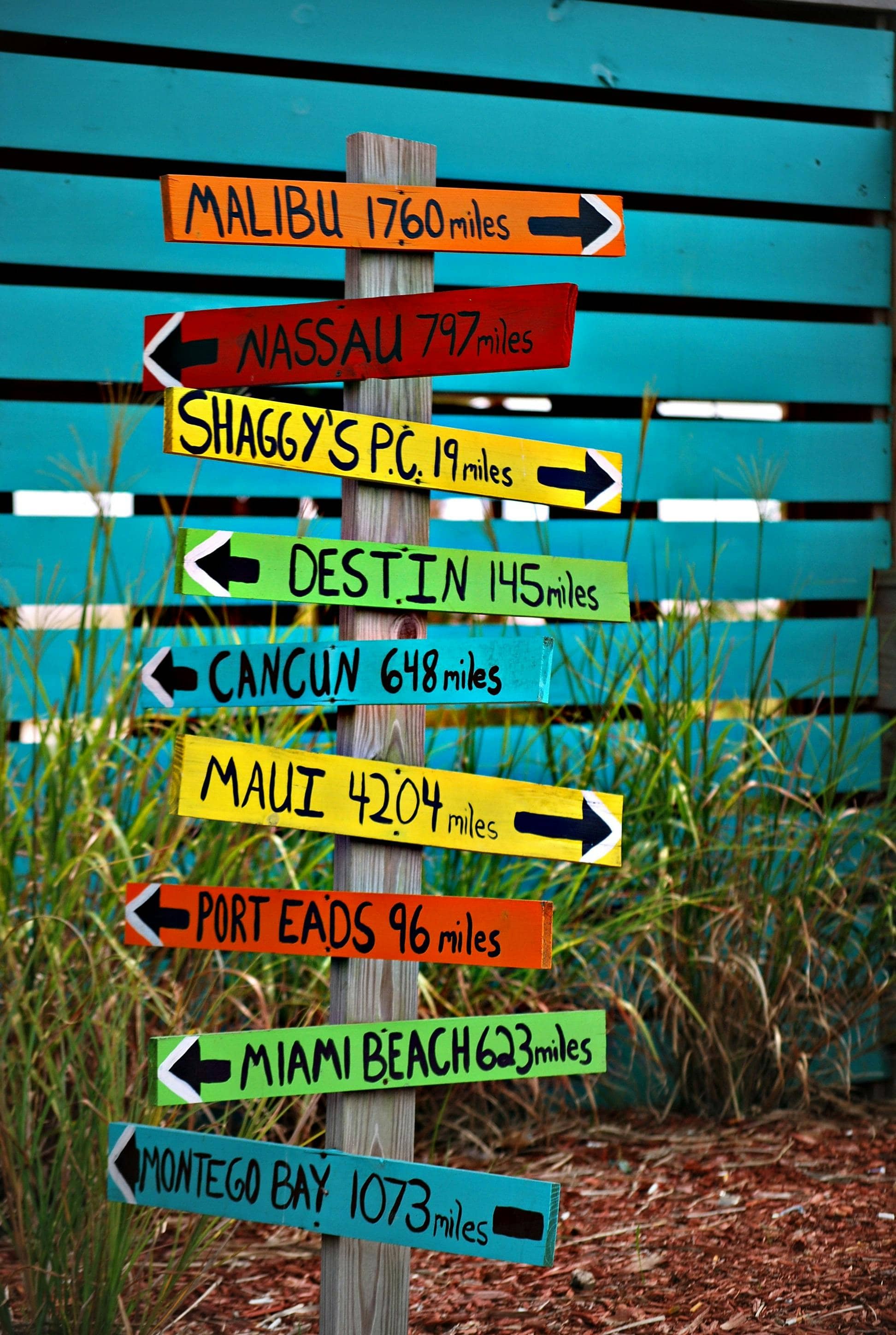
A Travel Agency’s Guide To Destination Management Companies

Travel Agency Software: Everything You Need to Know
Table of contents.

What Are Travel Meta Search Engines?
The Internet is growing rapidly, with many new websites, e-commerce stores, and offers from various companies appearing every day. The situation is no different in the travel industry. To make it easier to search for exciting offers from travel agencies, hotels, or carriers, metasearch engines come to the rescue, allowing search requests to be sent to several search engines simultaneously, making the search more efficient and fast. What is metasearch engine? How do meta search engines work? You will read about it in the next part of the article.
What is a meta search engine for the travel industry?
- Is the operation of travel metasearch engines complicated?
Most important statistics for 2024
What are the examples of travel meta search engines, what is the difference between travel meta searches and otas.
- What are the advantages of travel metasearch engines?
How do travel meta search engines change the industry?
Why are the meta search engines a booming trend in tourism, building an ai/ml application or extending your development team.
🚀 We're here to assist you in accelerating and scaling your business. Send us your inquiry, and we'll schedule a free estimation call .
The principle of metasearch engines is quite simple to understand. They send queries to multiple sources and present the acquired data as a comprehensive search results list.
Thus, the critical role of meta search engines is to aggregate search results in a unified way .
As a result, their users gain access to the maximum number of interesting listings available in the market with minimal involvement and effort. Essential and helpful information for them is generated quickly and, most importantly, provides a reliable source of objective information.
With the help of meta search search engines, users also save time, as data from multiple sources is available in one place – so they don’t have to browse various sites and search for offers on their own.
Relating this information to the travel industry, we can say that travel meta search engines provide and facilitate the search and comparison of offers from travel agencies, airlines, or hotels to provide end users with as many valuable suggestions for tours, flights, or accommodations as possible. Such solutions are an example of why digital transformation in the travel industry is essential.
In the hotel and OTA ( Online Travel Agency ) industry, the most important information about prices, conditions, and availability are pulled from the resorts’ websites or virtual travel agencies and displayed in one place.
Metasearch engines allow leisure seekers to conveniently browse offers – photos, descriptions, or additional services – without browsing multiple travel sites and platforms.

Is the operation of travel meta search engines complicated?
Meta search engines interface is similar to that of standard search engines and travel search engines.
These platforms aggregate and then present many types and categories to the user to make it easier to find a relevant offer and aggregate search results that best match the user’s needs. They often integrate third-party booking sites to expand their database.
In particular, a meta-search engine does not create its own database, but integrates the databases of other search engines, online travel agencies or websites and develops its own ranking method.
At the same time, it can remove duplicate entries and filter the search results to present users with more personalized and responsive listings. This integration helps users directly compare airfares and other travel-related costs.
For travel search engines to work effectively, online travel agencies, hotels, and other travel-related businesses need to provide key information on their web sites, such as prices, room availability, ancillary services, and seat counts . This enables direct comparison and booking .
To help travelers find the best deals, meta search engines check availability through an API interface with all suppliers and filter the data received according to the customer’s needs, facilitating reservations. This comprehensive approach ensures that users have access to a wide range of options and can make informed decisions about their travel plans.

[Read: What is a Global Distribution System ]
Global Travel Metasearch Engine Market Overview : Recent studies indicate a bright future for the global travel meta search engines market over the next 5 years. Valued in millions of USD in 2023, the market is projected to grow significantly by 2028, driven by a steady compound annual growth rate throughout the forecast period.
Regional markets such as North America and Asia Pacific are also expected to grow during this period.
The market includes major search engines such as Google Hotels, Trivago, Kayak, Skyscanner, Tripadvisor, and others, with the top three vendors accounting for a significant revenue share in 2024.
Sources: Global Travel Metasearch Engine Market Research Report 2023 .

During the work on the report The State Of Hospitality Distribution: Metasearch compiled by EyeforTravel and Fornova, the behavior of tourists coming from Australia, Canada, the United Kingdom, and the United States was examined.
According to the survey, 44% of respondents admitted that they “always used metasearch tools,” a group of 73% of respondents indicated that they “did so regularly,” and as many as 94% of respondents were “at least occasional users.”
So as you can see from the above examples, the trend of using a metasearch engine is steadily growing. Therefore, the travel industry must introduce new technologies and constantly follow the lead of the meta search engine to always be able to respond to these market needs.
Multiple search engines include:
It’s a German multinational technology company specializing in metasearch engine services, hospitality and accommodation products. The site compares the prices of more than 700,000 hotels on more than 175 booking sites, such as Booking.com.
It’s a metasearch engine for searching and comparing tourism-related information, including flight details, accommodations, car rentals, and vacation packages. More than 1,000 people work on the service, which manages seven international brands, including Cheapflights, SWOODOO, checkfelix, Mundi, and HotelsCombined.
Tripadvisor
It is one of the world’s most famous and largest tourism platforms based on meta search engines. Every day it helps many people worldwide plan trips, make reservations, or express opinions. The site has more than 1 billion reviews on nearly 8 million businesses. The company is available in 43 markets and provides content in 22 languages. Under the Tripadvisor umbrella are Bokun.io, Cruisecritic, Flipkey, Thefork, Helloreco, Holidaylettings, and others.
[Read also: Best travel management solutions ]

Google Hotel Ads
Google Hotel Ads is a dedicated tool for owners of hotels and other accommodation or tourism-related facilities.
It makes them more visible in Google search results, on Google maps, or in the company’s assistant. Google Hotel Ads considers only people who search for hotels and shows all data about the facilities in a very attractive way.
The ads appear in a particular module of an individual search engine, which can display not only their content but also photos, a list of amenities, or a direct link to the reservation.
Google Flights
Google Flights stands out in the competitive landscape of flight search engines, offering a robust platform designed for those looking to find cheap flights efficiently.
As one of the best flight search engines, Google Flights leverages sophisticated algorithms and a massive database to deliver a user-friendly experience that allows travelers to quickly compare prices, routes, and airlines.
Its intuitive interface and real-time price tracking set it apart, offering not only the cheapest flights, but also insights into price trends and suggestions for reducing travel costs.
The company was founded in 2001 by three IT specialists. In 2003, the first employee was hired to help with website development. In 2004, an office was opened in Edinburgh, and the company now employs about 150 people.
The website based on meta search engines is multilingual, offering flight searches in 20 languages. The major convenience is that users can search for flights without specifying the exact date and destination or compare prices.
Danish multi-search engine compares airline tickets, hotels, and car rental prices. It has agreements with many airlines and agents selling tickets online (OTC), making it easy to find tickets to unusual and not-so-touristy destinations.
Momondo also has a vast database of US airlines. It checks airfares for up to a year in advance, allowing you to group them by price and time criterion.
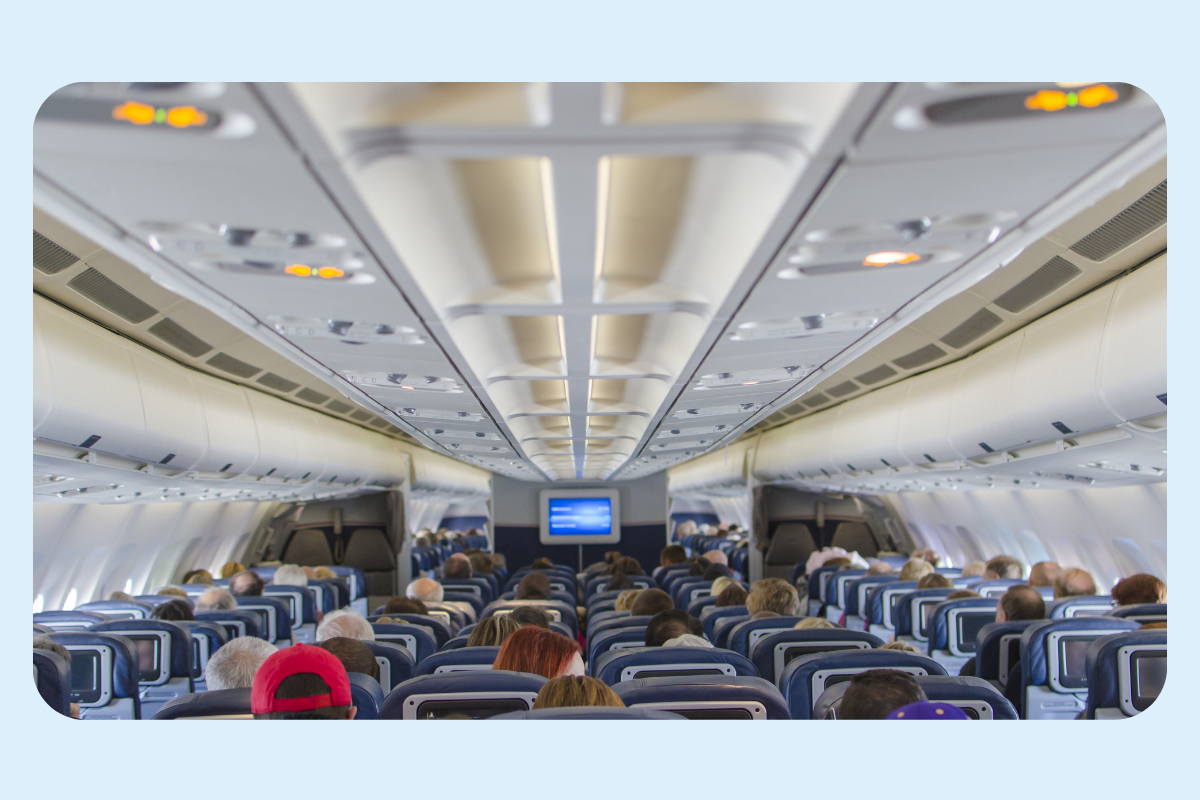
[Read also: Introduction to a hotel channel manager ]
Online travel agencies (OTAs) offer hotels located in different corners of the world, current prices, and provide descriptions and photos.
In addition, hoteliers can decide how many rooms they make available to customers through OTAs. Thus, travel enthusiasts can directly make reservations for a selected property through the OTA website. Examples of such activities include Expedia or Booking.
It is worth mentioning that online travel agencies spend considerable amounts of money on promoting their sites to be able to attract customers. So the offers of hotels and other tourist facilities do not appear there accidentally or for free – OTAs charge an average of 10-20% commission on each booking.
On the other hand, the travel meta search engine aggregates hotel rates from multiple booking sites and OTAs in one place.
This allows those planning a holiday or business trip to find all the most essential data in one place, price comparison, saving time and reducing effort. In addition, it is worth mentioning that meta search engines compare all available hotels meeting the criteria of the query directed to the search engine and redirects users to the booking site of their choice.
Through this, the meta search site does not take commissions from hotels but financially charges booking sites for clicks or visits sent to them.
[You may also be interested in: The Ultimate Guide to Property Management System ]
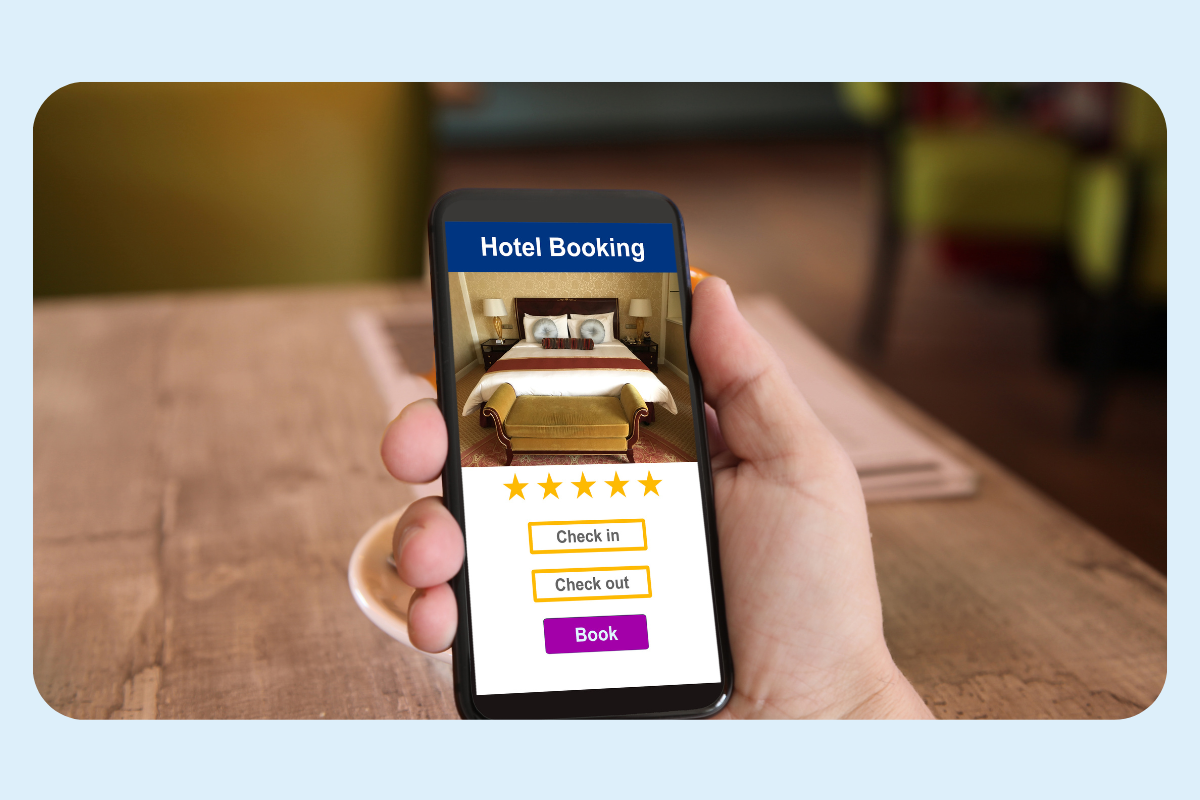
[Read also: How to Choose the Best Travel Agency Software ]
What are the advantages of travel meta search engines?
1. increased brand visibility on the websites.
Meta search engines allow you to increase brand visibility online significantly and higher ranking. For the competitive travel industry, this is very important. Notably, the meta search engine is a sort of an extension of partnerships with OTAs, which increases sales opportunities.
2. Preferential advertising rates
Meta search engines are also cost-effective for promoting hotels or other tourist facilities. This, in turn, optimally affects the marketing budget and marketing strategy. Using multiple meta search engines, there is no need to pay high commission rates, as these systems operate on a pay-per-click model.
3. Significant popularity of meta search engine among tourists
Many meta search engines are popular among people who like to travel. They make it easy to search for flights and accommodations in one place, thus saving travelers time and money.
he high interest in meta search engines makes it a thriving online distribution channel for the travel industry.
An example is the travel search engine handling 300 million queries daily, developed by Stratoflow . The implementation has reduced infrastructure costs by 80% and allowed it to drive 50% more traffic, with a significant reduction in response time by 60%.
4. Possibility to diversify distribution channels of offers thanks to meta search engine
The cooperation of hotels, carriers, and airlines with meta search engines allows combining several distribution channels. In this way, companies avoid depending on the services of only one provider and increase their chances of reaching a more comprehensive range of customers with their offers.
The demand for meta search engines comes at a time when the fragmentation of services in a given sector is so significant that a simple Google search leads the user to a multitude of web pages, the browsing of which is time-consuming, and the ability to compare a variety of offerings is limited.
A meta search engine uses metadata to aggregate and categorizes a considerable amount of dynamic information from multiple sources to return to the user with the most relevant search engine results.
With high-tech travel meta search engines , the market becomes more transparent, tourists can get a better deal at the price of their choice, and sellers are encouraged to compete on product quality and value.
Smaller hoteliers, often powerless in the face of enormous advertising budgets of world-renowned hotel chains, have, in turn, a chance to reach new customers and compete fairly with industry leaders.
[Read also: Yield Management: What It Is and The Best Strategies ]

Today, customers value the reliability of information and the ability to obtain it quickly. If you want to book a flight or hotel, you probably pick up a smartphone or use a laptop. The times when you had to visit a travel agent are practically gone.
People have different requirements, preferences, and budgets when planning a trip. They may be looking for a family vacation, a romantic weekend, a honeymoon, or a place for a corporate trip. With the help of a travel meta search engine, finding the perfect match is extremely easy – just enter the proper criteria to get a list of matching offers.
The speed of the meta search engines makes customers eager to book, and the efficient service builds a positive user experience.
Because of this, they are willing to share positive reviews of a particular hotel or carrier, thereby driving new customers.
[Read also: What is a booking engine ]
Meta search engines – use their potential in your business
There are many search engines available on the market. However, meta search engines have become particularly important for the travel, hotel, and airline industries, making it easier to reach potential customers. Thanks to their advanced search capabilities and fluidity, their users receive highly personalized offers, which significantly increase the chances of more direct bookings . Learn more about how you can build your own, custom travel search engine in this article: How To Build Travel Meta Search Engine: A Step-By-Step Guide .
At Startoflow, we understand the needs of the travel industry very well and have experience developing high-performance metasearch engines . So if you want to implement such a solution in your business, we invite you to contact us. We will be happy to help you and suggest a customized solution tailored to your needs.
Related Posts
- Best AI for Coding: 10 AI Tools and Assistants for Software Developers for 2024
- How To Build Travel Meta Search Engine: A Step-By-Step Guide
- Can ChatGPT Write Code?
- What Are Large Language Models: Definition + Best Examples
- Key Benefits of Artificial Intelligence For Modern Businesses
We are Stratoflow, a custom travel software development company . We firmly believe that software craftsmanship, collaboration and effective communication is key in delivering complex software projects. This allows us to build advanced high-performance Java applications capable of processing vast amounts of data in a short time. We also provide our clients with an option to outsource and hire Java developers to extend their teams with experienced professionals. As a result, our Java software development services contribute to our clients’ business growth. We specialize in building bespoke travel solutions like fast search engines, metasearch engines, booking engine services or channel manager integrations.
Testimonials
The developed software product was built from scratch with solid quality. We have had a long-term engagement with Stratoflow for nearly 10 years. We look at them as partners, rather than contractors. I'm impressed by their team culture and cross-team support.
Nathan Pesin
CTO, Legerity Financials
Stratoflow was a great partner, challenging as well as supporting our customer projects for the best outcome. They have a great pool of talent within the business - all very capability technologists, as well as being business-savvy and suitable for consultancy engagements.
Chris Goodall
Managing Consultant, CG Consultancy (UK) Limited
The bespoke metal exchange platform works great, it is easily accessible and richly functional. Stratoflow managed deadlines capably, meticulously documented their progress, and delivered a complex project at an affordable cost.
Bartlomiej Knichnicki
Vice Chairman, Supervisory Board
We are very pleased with our partnership with Stratoflow and, as we continue to grow, we expect to increase the numbers of developers that work with us on our projects. They have proven to be very skilled and flexible. They're extremely reliable, and they have a very good company culture of their own, which gives them a real edge compared to other providers that serve more as production shops rather than thought partners and creative problem solvers.
Andrew Kennedy
Founder & Managing Director, Tier 2 Consulting
Stratoflow successfully customized the system according to the specific functionalities and without bugs reported. The team was commended for their adaptability in the work process and for their responsiveness.
Joshua Blavins
Tech PM, Digital Agency
The features implemented have received overwhelmingly positive feedback from end-users. Stratoflow has an incredible technical expertise and a high degree of flexibility when it comes to changing project requirements.
Chief Technology Officer, Legerity
They have impressively good knowledge of AI issues. Very responsive to any amendments and findings. Very good communication. We received a finished project which could be implemented into production shortly after testing.
CO-Founder & CTO
Circular Fashion Company
They provided superb service with seamless communication and a highly professional, technical approach. The team displays impressive technical expertise and are willing to share information and engage in constructive feedback.
Filip Stachnik
Operations Manager, Otwarte Klatki (part of Anima International)
They're very skilled technically and are also able to see the bigger picture. Stratoflow can actually think about solutions, not just the technical task at hand, which they've been assigned.
Arnd Jan Prause
Chief Operating Officer, musQueteer
Stratoflow delivered the website successfully within the timeframe and budget. They assured that the output met the set requirements. Overall, the team's performance was excellent and recommended for their exceptional technical business expertise. They've been able to deliver all of their work on time and within budget, which has been very impressive.
Lars Andersen
Founder & CEO, My Nametags
ColorWhistle
Digital Web Design Agency India

Explore our Market-Fit Services
We ensure to establish websites with the latest trends as we believe that, products whose value satisfies the needs of the market and its potential customers can be efficiently successful.
Quick Links
- About Us – ColorWhistle
- Engagement Models
- Testimonials
- Case Studies
- Agency Services
- Web Development
- Web App Development
- Digital Marketing
- Travel Website Development Services Company
- Real Estate Website Development Services Company
- Education Website Development Services Company
- Healthcare Website Development Services Company
- Hotel and Restaurant Website Development Services
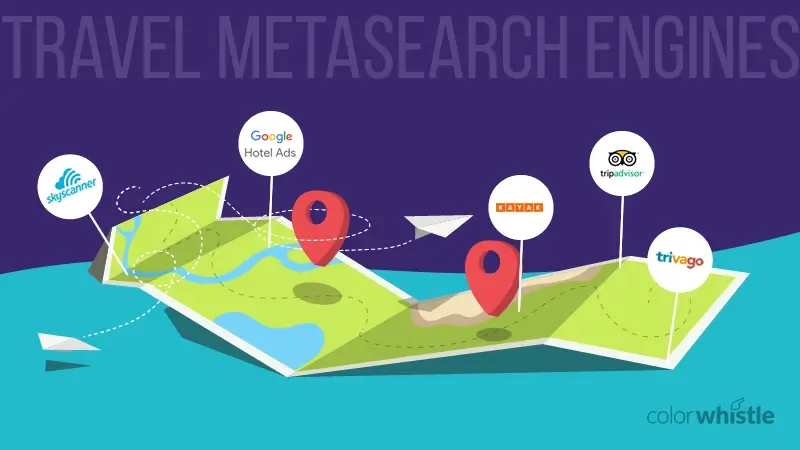
Category: Travel
Date: December 18, 2023
What Are Travel Meta Search Engines and How it Impacts Travel Agencies?
Travel metasearch engines have been around for some time. But, recently, it has become one of the hottest trends in the travel industry as more and more travelers are choosing it as their preferred method for finding and comparing prices.
In this blog, let’s find out how travel metasearch engines can help your hotel gain more online visibility and sell more rooms.
What is a Travel Meta Search Engine?
A travel metasearch engine is a price comparison website that compares hotel rates from different sources across the internet, OTAs (online travel agents) or directly from hotels. It must be noted that these metasearch engines are not a booking channel. They are merely a platform through which booking channels can market themselves.
The business model of travel metasearch engines is similar to most digital advertising platforms. They earn money through CPC (cost per click), CPI (cost per impression), CPA (cost per acquisition) and hybrid ads (a combination of CPC and CPA).
According to Koddi, these are the top 10 metasearch markets in the world.
What are the top 5 travel meta search engines.
Here are some of the most famous travel metasearch engines.
How Are Travel Metasearch Engines Changing the Industry?
Initially, travel engines aggregated rates by gathering them from sites across the internet so that consumers can compare it before making a final decision. Their main partners were OTAs such as Expedia and Priceline. But due to a complicated setup process and campaign management, many hoteliers avoided using the medium.
Things have changed now. Most hotels can easily get listed depending on the booking engine. For example, instant booking features where users remain on the metasearch site to book has produced a hybrid online booking environment.
One of the biggest changes is being driven by the search giant Google. When it comes to traffic growth and CPC, Google Hotel Ads is overtaking other metas. The search giant has integrated rates into Google maps. They are way ahead of the game and their meta is the most preferred choice for travelers. As more and more vendors get listed on Google Hotel Ads, Google will have more power to dictate the booking preference in the years to come. Hoteliers must maximize this channel or else it will cause a decrease in direct bookings.
Now, the online world is slowly shifting to voice-based search. The major meta-search engines are beginning to create their presence on Google Home and Amazon’s Alexa. Hoteliers who are worried about this shift can rest assured that metasearch engines will come to the rescue.
Why Should Hotels Get Listed in Travel Metasearch Engines?
Marketplaces that compare prices which vendors offer help consumers make an informed decision. Every consumer wants to feel like they are doing their due diligence before choosing a price. By listing on metasearch engines, hoteliers can give users the knowledge that they are getting a great deal.
Moreover, listing hotels in metasearch engines is not only about growing revenue. It gives hotels a chance to engage with an entirely new set of customers.
PACE Dimensions’ analyzed 10,000 travel websites and found out that metasearch accounts for over 45% of global unique visitors in travel. This number is greater than the number of unique visitors for OTAs in the US.
Metasearch is a valuable space for hotels because it gives them a greater opportunity to compete with bigger travel agencies and get more direct bookings. Plus, they can spend their marketing budget in an efficient way because the bidding system gives hotels control over how they show up with other competitors. Over time, it will give them more freedom to adjust the marketing strategy and increase ROI.
Within 10 years, the hotel metasearch has progressed into a sector that generates $6 billion in advertising. Metasearch engines such as Google Hotel Ads and Tripadvisor is becoming a one-stop-shop for researching and booking hotels. So, it is the perfect time for hotels to start investing in metasearch.
Interesting Statistics About Travel Meta Search Engines
Mirai, an expert in hotel distribution gathered many important data which depicts the growing importance of travel metasearch engines. Here are some of the major findings.
1. Investment made in ads (Google & Bing) vs metasearch engines.
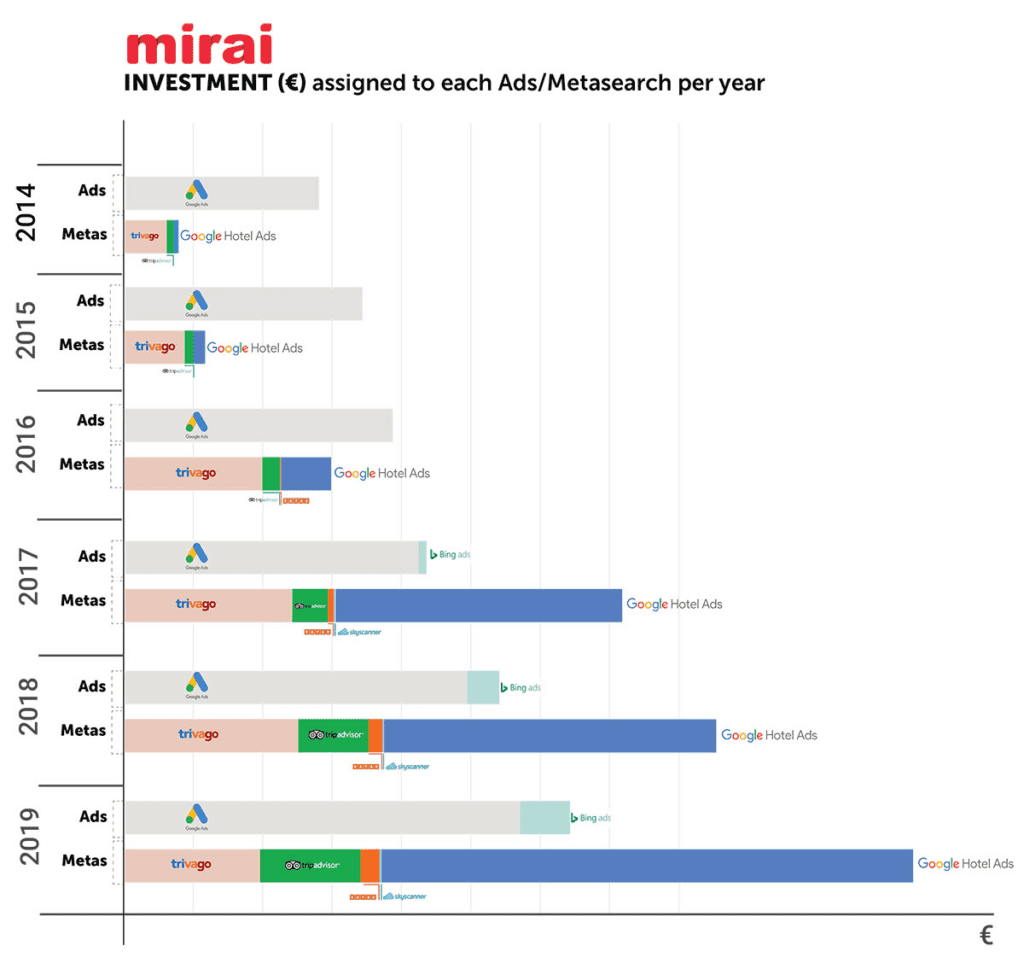
2. Number of times the investment in metasearch grows than ads.
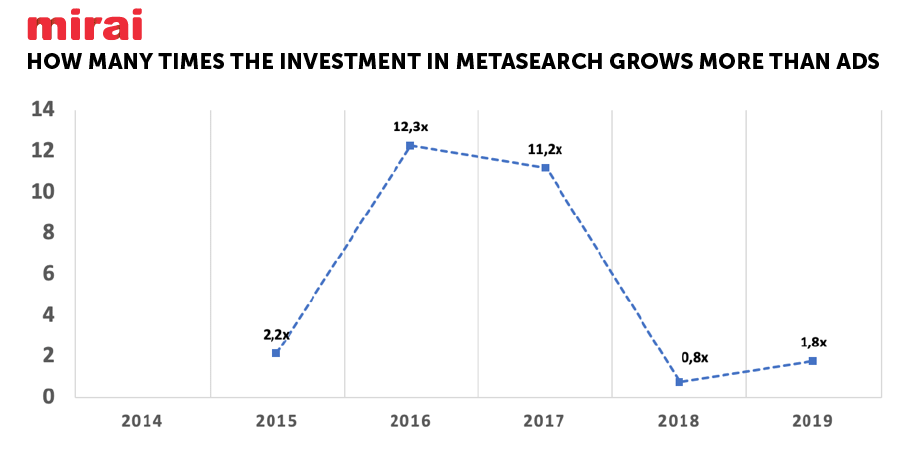
3. How metasearch engines are dominating the traditional ads?
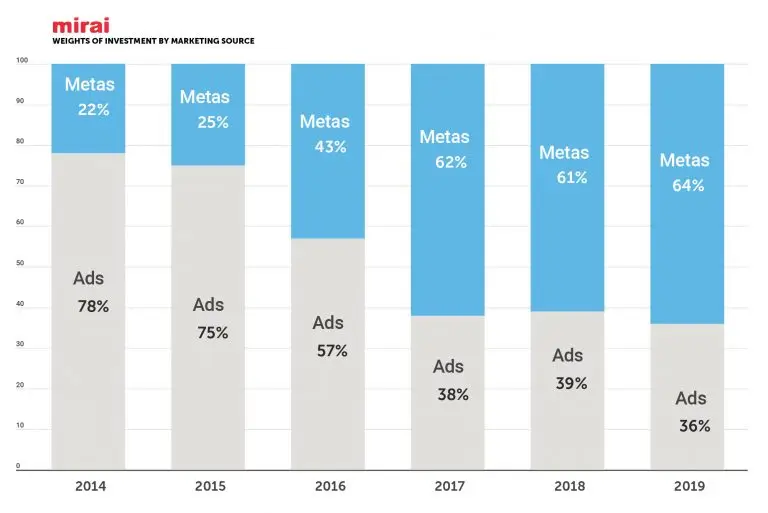
4. Dominance of Google Hotel Ads over others
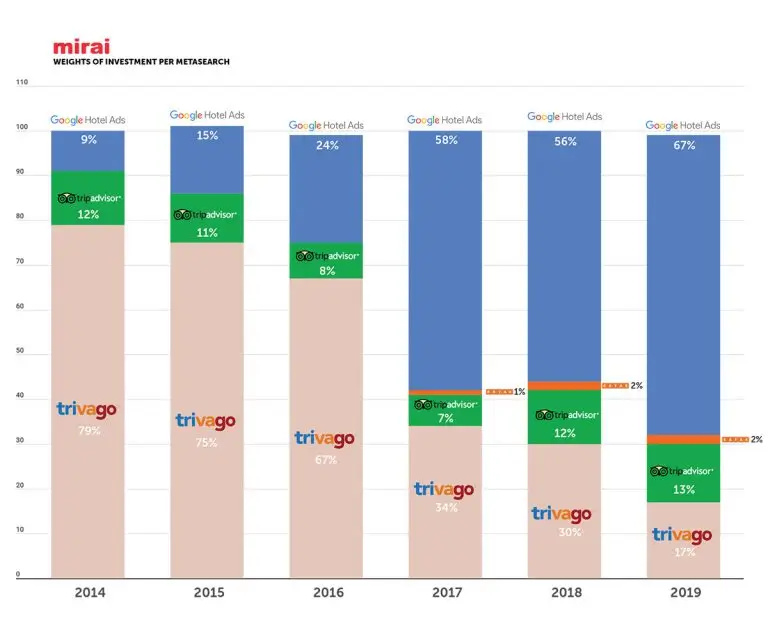
5. How Google is the leading company in terms of investment
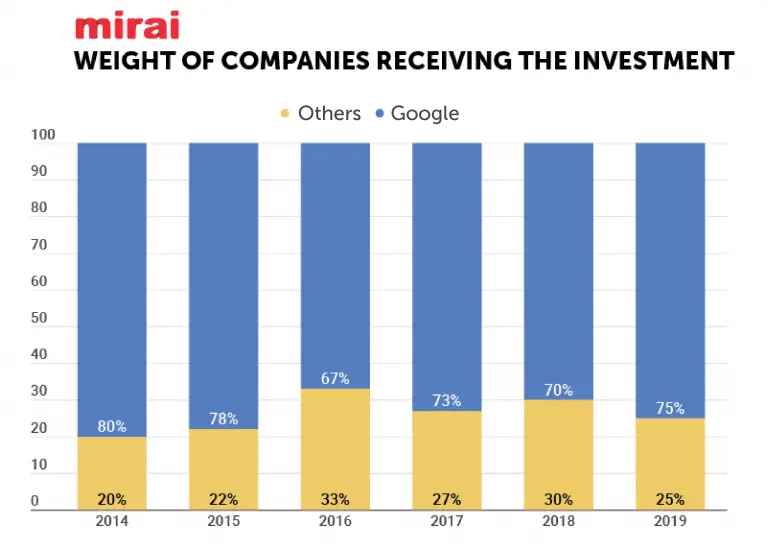
What Are the Pros and Cons of Travel Meta Search Engines?
Travel metasearch engines have its fair share of advantages and disadvantages. Let’s find out about them.
- Improved online brand visibility and better ROI
- Lists all the hotel rates in one place
- Price transparency
- Provides reviews in one place which helps customers to make better decisions
- Always displays the best rates
- Increased direct channel bookings
- Cost of getting listed on meta appears to be excessive for some hoteliers
- No proper customer service or support to solve disputes
- Amount of choice can be overwhelming to customers
- Managing the marketing department adds extra responsibility
Before you make the decision to list your hotel on metasearch engines, you must take the above points into consideration. Do you have help to manage your campaigns? Does your budget permit the allocation of third-party optimization services? And are you prepared to pay commission fees for direct booking?
If you don’t have a team of marketers, you will not be able to manage the volume of work required to rank high in the metasearch engines. In such situations, you can outsource the work to get instant advertising expertise from professionals who can offer focused attention on a daily basis. If you are looking for such kind of assistance, you can get help from our digital marketing experts at ColorWhistle .
Drive Conversions and Boost your Business with Expert Travel Website Development.
In conclusion, travel metasearch engines is going to be a real game changer.
Travel metasearch engines will help hoteliers to reign control of their distribution pricing. This means that hotels must take serious steps to create a strong presence in meta sites.
But, hoteliers take an off-hands approach. Many are in the mindset that once they are listed, bookings will keep flowing. This is a misconception. Hoteliers must start thinking of meta sites as an online advertising platform.
Since meta sites work with real-time data, dynamic price marketing is gaining momentum. To succeed, advertising budgets must be set on a daily, weekly, and monthly basis. Most meta sites offer real-time bid management and ROAS (Return On Advertisement Spending) tracking. So, you can easily measure how well your marketing dollars are being spent.
Even though travel metasearch engines are changing the hotel marketing game, clients do not get a complete value proposition. For hoteliers, driving traffic is the only part role in this equation. Positive reviews and word of mouth is still essential for building trust.
In addition to spending and managing budget , listen to the needs of customers and promptly address the negative feedback in these mediums. Above all, make sure that your hotel is offering true value and amazing service to your customers.
ColorWhistle’s agility in learning travel tech helps to keep our consumers ahead of the curve. If you need any help in travel website development for your travel agency don’t hesitate to contact us . We are always happy to help.
Which travel metasearch engines are you using to advertise your hotel? Share your experience in the comments section below.
More Resources
- Online Travel Agencies – A Brief Introduction
- How to Build a Travel Aggregator Website?
- Best Travel Website Design Ideas And Inspirations For 2024
In quest of the Perfect Travel Tech Solutions Buddy?
Be unrestricted to click the other trendy writes under this title that suits your needs the best!
- GDS Travel Agency Guide
- GDS OTA Travel Meta Searchengines
- Travel Aggregator Website
- Best Travel Websites Inspiration
- Travel Website Features
- Top WordPress Travel Website Themes
- Vacation Rental Booking Sites vs Traditional Accommodation
Related Posts
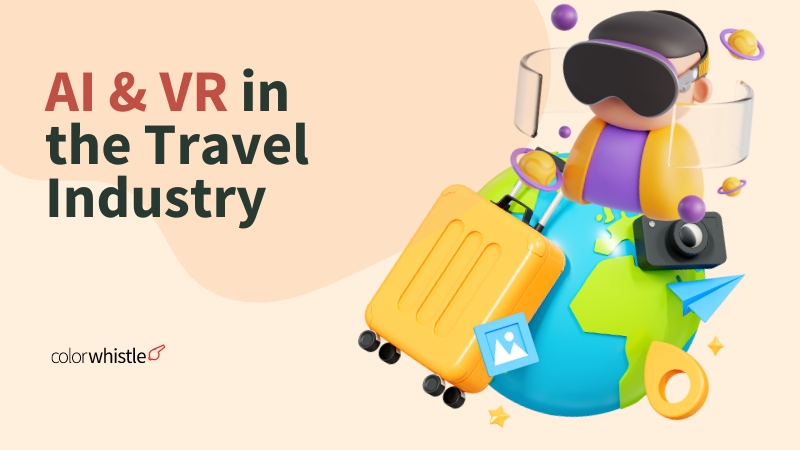
Exploring the World Through AI and VR in the Travel Industry
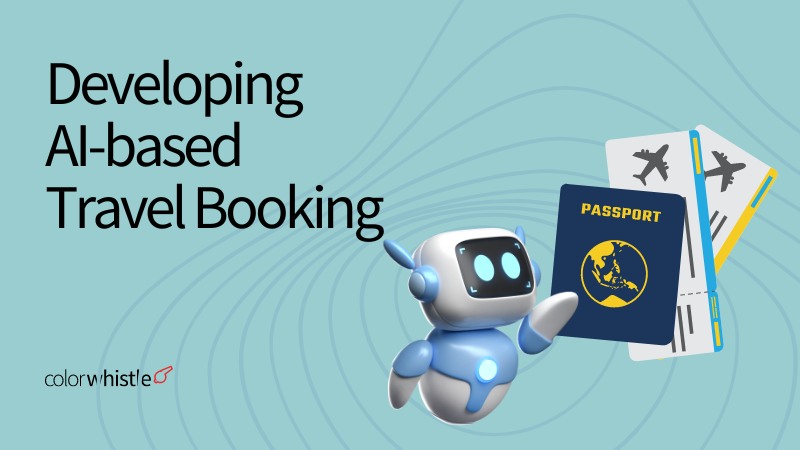
How AI-based Travel Booking Applications Can be Developed?
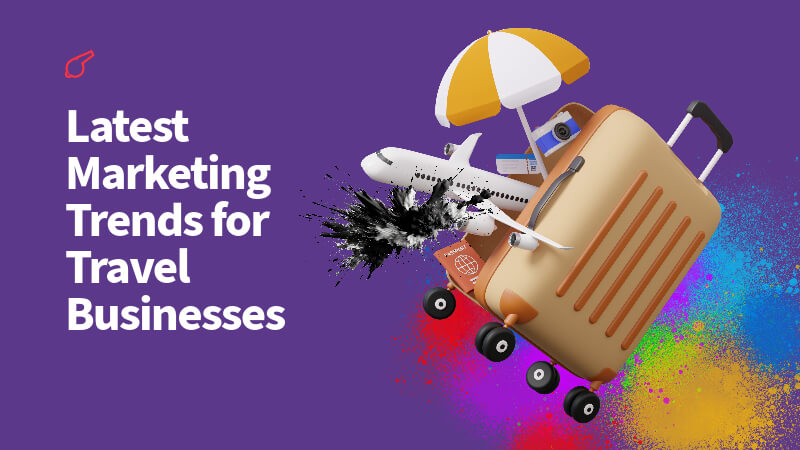
Latest Marketing Trends for Travel Businesses in This New Year
About the Author - Anjana
Anjana is a full-time Copywriter at ColorWhistle managing content-related projects. She writes about website technologies, digital marketing, and industries such as travel. Plus, she has an unhealthy addiction towards online marketing, watching crime shows, and chocolates.
View Our Services
Have an idea? Request a quote
Share This Blog
Leave a Reply Cancel reply
Your email address will not be published. Required fields are marked *
Ready to get started?
Let’s craft your next digital story

Sure thing, leave us your details and one of our representatives will be happy to call you back!
Eg: John Doe
Eg: United States
Eg: [email protected]
More the details, speeder the process :)
- Skift Research
- Airline Weekly
- Skift Meetings
- Daily Lodging Report
Travel Metasearch: What’s Coming Next
Dennis Schaal + Skift Team
Related Reports
Want to read this report, get access to this report when you subscribe.
- 3+ new reports per month
- Access to 200+ reports
- Analyst Q&As through email
- 25% off tickets to Skift Forum events
- Quarterly analyst report review calls
- High resolution PDFs of new reports as they're released
3 Google Metasearch Features for Hoteliers
Is your hotel capturing the rising demand through Metasearch?
Before we dive in, be sure to visit our ultimate guide to hotel marketing to access an all-encompassing rundown of hotel marketing trends, data points, and insights.
By Scott Falconer, Executive Vice President, Media Solutions, Hospitality, Amadeus
In this new world of travel, the digital experience along the customer journey is critical to acquiring the next generation of customers. Understanding and adjusting to the consumer’s online journey will now be more important than ever as borders begin to open and restrictions ease. Fortunately, as a hotel, you have a wide range of distribution and communication channels at your disposal to support your overall marketing strategy.
Metasearch—a search engine where third-party suppliers such as OTAs, brands, and independents are aggregated and compared—has particularly gained popularity in recent years due to its ability to simplify the online shopping process and aggregate competitive hotel prices.
To continually innovate and face the challenges presented by COVID-19, some of our preferred Amadeus metasearch partners, including Google, have been developing new features to support a hotel’s potential to drive bookings and maximize revenue in an evolving online ecosystem and Amadeus has implemented them for the benefit of our hotel customers.
“It is exciting to see Amadeus Hospitality adopting the new Google metasearch features quickly for the benefit of its hospitality clients. We have a strong long-lasting partnership with Amadeus Hospitality, and we are looking forward to continuing to bring innovative solutions to the travel industry,” said Finnbar Cornwall, Google Industry Leader, Travel.
Here are some of the top consumer-facing changes Google has released recently and how your hotel can incorporate them into your forward-looking digital marketing strategy.
I. Destination-specific Travel Features
Google has released new travel features, based on Google flight or hotel ad data , to communicate important destination-specific insights. These include travel advisories and local conditions reporting such as the percentage of open hotels with availability or flight operating at a city and country level. Google is planning to add information about trends in search queries to gain a better sense of travel activity in that market.
Since COVID-19, travelers also want evermore flexibility and refundable options when making travel plans. Many hotels now offer free cancellation to give travelers more confidence to plan a trip, and consumers can select the free cancellation filter in the Google hotel search to only see hotels offering this policy.
II. Property Promotion Ads
P roperty promotion ads allow hotels to drive incremental demand in such cases as low occupancy periods or new property openings. Property promotion ads are designed to increase exposure, boost your offer to a top fixed position on the search results page, and encourage users to book directly on your hotel’s highest revenue-generating channel, your website .
The product enables hoteliers to bid on placement at the top of the hotel details page where the property listing is then marked with an “ad” mention to distinguish it from traditional auction results. Although property promotion ads are a new ad format, Amadeus Hospitality has been beta-testing with Google for some time as part of our preferred partnership to help further support our hotelier partners around the globe.
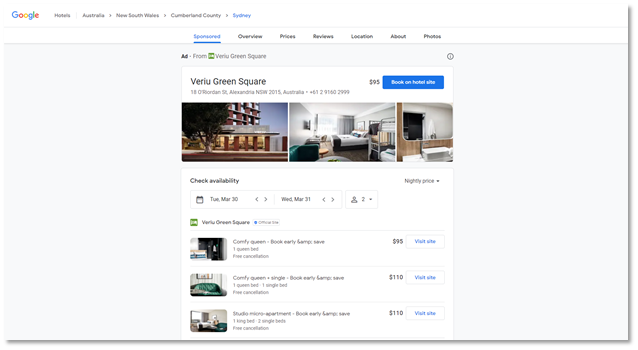
III. Free Booking Links
Google has also recently launched Free Booking Links , which are new complimentary hotel website listings visible on Google’s search results page. Free booking links appear on Google’s hotel booking module below hotel ads when travelers are searching for hotels. Travelers will now have more options for booking a hotel at the best rate available, while hotels have a new way to drive more bookings.
It’s important to note that a hotel’s feed and content, as well as pricing, can significantly influence the rankings. With only a portion of listings being free booking links, standard Metasearch auctions are still running , which captur e most of the consumer engagement. Free booking links may also resemble hotel ads, but “ Ads” are clearly marked with a badge in the hotel booking module.
How it Works as a Metasearch Customer
As preferred partners, Google and Amadeus Hospitality work hand-in-hand to offer customers quick and easy access to these new free booking links directly through the Amadeus Metasearch platform – iHotelier ® Demand Services . In order to appear in free booking links, hotels simply need to be connected to the Google Hotel Ads feed, managed by Amadeus Hospitality. Google’s price accuracy regulations and valid rate plan requirements for the free booking links experience are managed for Amadeus customers through the iHotelier Demand Services platform.
At Amadeus Hospitality, our partners are constantly evolving their user experience to quickly adapt to changing consumer behaviors. Through our preferential relationships, our team of experts can help hoteliers rapidly adjust to these market changes to build innovative, performance-driven, strategic media campaigns to capture the coming wave of travelers.
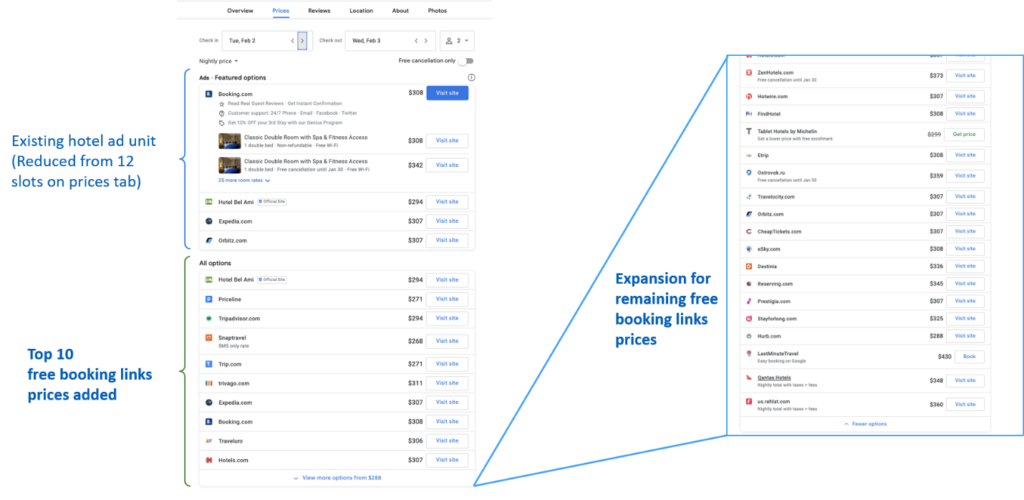
Maximizing Your Hotel’s Potential for Success
Changes in our industry are driving innovation and the world of Metasearch is more dynamic than ever. By building a digital media plan that leverages Metasearch as a key strategy, hotels will have an opportunity to capture a greater share of the market as demand returns. And at Amadeus, we are continually staying abreast of the latest developments in the online sphere, in order to offer the best service to our customers.
To learn more about how to leverage metasearch as part of your direct booking strategy, reach out to your Customer Success Manager or download the Ultimate 2023 Hotel Marketing Strategy Guide to help build out your hotel’s marketing plan and save time planning.
Related Posts

How Can Destinations Prepare to Attract Travelers Over the Coming Decade?
![meta search trips [PODCAST] A Look at What's Actually Happening in Business and Group Travel](https://www.amadeus-hospitality.com/wp-content/uploads/2022/02/PODCAST-A-Look-at-Whats-Actually-Happening-in-Business-and-Group-Travel.webp)
[PODCAST] A Look at What’s Actually Happening in Business and Group Travel

Choosing Hospitality Technology in a Post-GDPR World
Take a trip to other amadeus sites, corporate site.
We’re creating a more connected travel industry, underpinned by sustainability and long-term investor relations.
Careers site
At Amadeus, we’re always on the lookout for talented, passionate people to join our team. Interested?
- Property Management System
- Channel Manager
- Booking Engine
- Marketplace
- Revenue Management
- Cloudbeds Payments
- Cloudbeds Amplify New!
- Whistle for Cloudbeds New!
- B&Bs and Inns
- Hotel Groups
- Vacation Rentals
- Channel Connections
- Ambassador Partner Program
- Cloudbeds Horizon
- Become a Partner
- Case Studies
- Resource Center
- Guides & Reports
- Calculators
- What to Expect
- Customer Success
- Knowledge Base
- Product Updates
- Cloudbeds University
- Government Compliance
- Company News
- Meet the Team
- Careers We're Hiring!
- Become an Ambassador
- Event Schedule
- Cloudbeds Amplify
- Whistle for Cloudbeds

What is hotel metasearch marketing? The complete guide for lodging properties
Stay up to date with the latest trends, insights and technology for hoteliers.
- First name *
- Last name *
- Property Name *
- Property Type * Property type* Hotel Bed and Breakfast Hostel Apartment Groups Vacation Homes Alternative Accommodations
- How many listings do you have?
- How many Addresses does your business have?
- * English Spanish Portuguese Franch Vietnamese Japanese Thai Italian
By Rosalia Arias
For travelers, planning a vacation can be a lot of work. To save time and money, more travelers are turning to metasearch platforms like Google Hotel Ads, Tripadvisor, and Trivago to search for hotels, conduct price comparisons, and find deals. And yet, many hotels overlook metasearch in their digital marketing strategy , missing out on opportunities to reach a broader segment of travelers, compete for business with online travel agencies (OTAs), and drive direct bookings.
This guide aims to take the mystery out of metasearch marketing for independent hotels and other types of lodging properties. Read on to learn more about what metasearch is, how metasearch sites differ from OTAs, and how to implement a hotel metasearch strategy that generates more bookings and earns higher profits.

What is hotel metasearch?
Although the concept of metasearch may be new to some hoteliers and hosts, it’s actually been part of the travel industry for over 20 years. Sometimes called “a search engine for search engines,” a metasearch platform acts as an information aggregator.
The most popular metasearch platforms in the hospitality industry include Google Hotel Ads, Tripadvisor, KAYAK, Trivago, and Skyscanner. Some metasearch sites also aggregate information for flights, car rentals, and activities, allowing travelers to plan an entire trip from one travel site.
How do hotel metasearch engines work?
Most metasearch sites operate in a similar way. Upon arriving on the platform, the user is prompted to enter a destination and the desired travel dates. Much like with OTAs, the search results then display a list of available hotels and rates in the destination. When potential guests click on a hotel, a listing appears, showing hotel information, photos, and traveler reviews, along with rates and availability pulled from a variety of booking sources. Some listings may display rates for several room categories, while others may display only the best available rate. Additional booking details may also be provided such as the cancellation policy and inclusions like free breakfast or Wi-Fi.
To make a booking, the user can click on one of the links and will be taken to the booking source to complete the reservation. On some metasearch sites, users may also have the option to book the hotel without leaving the site.
Booking links on metasearch platforms are typically dominated by OTAs like Booking.com , Expedia, Travelocity, and Hotels.com , but other intermediaries like Tripadvisor and KAYAK may also be listed. If a hotel advertises on the metasearch site, its rate and a link to its website booking engine will be displayed along with the other links, representing the only direct booking option.

Hotel metasearch vs. online travel agencies
So what is the difference between metasearch sites and online travel agencies? The main difference is that OTAs provide room rates and booking capabilities for only one booking channel – their own – whereas metasearch sites display rates for multiple booking channels – sometimes up to twenty or even more.
If the hotel is maintaining rate parity, there shouldn’t be a lot of difference among the room rate offerings across booking sites. In reality, however, there are often significant variances, and the site that offers the lowest rate typically receives the most clicks. To attract bookings, advertisers often try to undercut one another, even by just a dollar or two.
Another key difference between metasearch sites and OTAs is the booking model. OTAs work on a commission model, typically charging hotels a percentage of the total booking value (room rate + taxes and fees). Metasearch engines, on the other hand, work primarily on a cost-per-click business model, although most now offer a commission model too.
What is hotel metasearch marketing?
In addition to room rates, the order in which listings appear on metasearch platforms can also have a significant bearing on click volume. Typically, the higher the link is on the page, the more clicks it generates. So it’s not enough to be listed on a metasearch site; hotels also must compete with other advertisers to appear as high as possible in relevant search results.
When hotels don’t advertise on a metasearch site, a link to their website won’t appear, and the user is likely to book their stay through one of the OTAs or other intermediaries listed. Not only does the hotel miss out on an opportunity to get a direct booking, but it must also pay a commission to the OTA if a booking results. This is a key reason why metasearch campaigns are an essential part of a well-rounded hotel marketing strategy.

How does hotel metasearch advertising work?
Depending on the platform, hotels typically can choose between two metasearch payment models: cost-per-click (CPC) or commission-based. In the cost-per-click model, also called pay-per-click (PPC), the hotel pays a fee to the metasearch engine for every click that leads to its own website. The hotel bids for ad placements to compete with other advertisers for a higher ranking in hotel search results, setting a maximum CPC fee or budget. Generally, the higher the bid, the higher the ranking, but other factors may also be taken into consideration, such as the room rate, ad relevance, and landing page quality.
Some metasearch engines also offer a pay-per-impression (PPI) option, in which case the hotel pays a fee for a certain number of impressions or views, whether or not clicks or bookings result.
Traditionally, metasearch engines have operated on a pay-per-click model, but today most metasearch sites now offer a commission option too. In this model, which is also referred to as cost-per-acquisition (CPA) or pay-per-stay (PPS), hotels pay a commission, or a percentage of the room rate, on bookings. With CPA, the advertiser will pay commission based on sales generated, not stays, which means the commission is due after a guest makes an online booking and is charged whether the guest cancels the booking or not. With PPS, the advertiser will only pay the commission after the guest checks out of the property. This is similar to the OTA model, although metasearch commission rates are typically lower.
There are pros and cons to each model. On the one hand, CPC fees are much lower per transaction than commissions, but the hotel pays these fees whether or not a booking results in a stay. With the commission model, the hotel pays only when a booking is completed.
So which metasearch payment option is best? Testing out both options might be the best way to find out which one works best for your marketing budget. That being said, on metasearch platforms, the cost-per-click model is generally more popular with hotels than the commission model. With a smart metasearch strategy, a hotel’s return on investment can be higher on CPC campaigns than on commission-based bookings on both metasearch sites and OTAs.
Hotel metasearch vs. hotel metasearch marketing
To summarize, hotel metasearch refers to platforms used by travelers to compare a hotel’s rates across booking channels. Hotel metasearch marketing refers to advertising on these platforms to generate awareness, clicks, and bookings.
The importance of metasearch marketing for independent properties
You may be wondering, why would I advertise on metasearch channels when I have free booking links? Ben Lloyd and Kent Schnepp, Directors of Cloudbeds Amplify , answered this question during Passport 2023.
For independent hotels, hostels, inns, and other types of accommodations, metasearch marketing offers a number of advantages. This includes opportunities to:
- Broaden your reach. Metasearch is part of a healthy and diversified distribution strategy. The more channels your property appears on, the greater the visibility, the higher the awareness, and the more opportunities to generate reservations.
- Increase revenue and profitability. Travelers love hotel metasearch sites because they make it easy to compare rates from a variety of booking sources. For hotels, a metasearch strategy gets you in front of high-intent travel shoppers, with the potential to generate bookings at a lower cost than other distribution channels.
- Compete with OTAs. Metasearch engine advertising is crowded with OTAs. By listing on these platforms, your property will stand out from the crowd, attracting travel planners away from OTAs and generating those lucrative direct bookings .
- Own the relationship. Unlike OTA bookings, direct bookings allow you to collect guest contact information at the time of reservation. You can start building relationships with guests right away using automated email communications like booking confirmations and pre-arrival messages.
- Upsell and cross-sell. When travelers visit your website, you have more control over the booking experience. You can promote higher-category rooms, packages, and amenities that may not be available on OTAs, as well as additional on-property services like the restaurant, bar, retail, spa, and activities.
- Target active trip planners. Because metasearch ads are displayed only if your property has availability on the chosen dates, you don’t pay for clicks for dates when your hotel rooms aren’t available, as can happen with Google Ads and other advertising channels.

The 6 best hotel metasearch engines
To help you decide where to list, here’s an overview of the most popular metasearch websites in the hotel industry today.
1. Google Hotel Ads
According to Skift, Google accounts for 67% of all metasearch spending, and that means it should be your top priority. Further, Google Hotel Ads (GHA) are integrated into Google Search results, Maps, and Google My Business Profiles, providing unrivaled exposure for your brand. Whether or not you purchase GHA, you should take advantage of the free booking links now offered by Google.
2. Tripadvisor
Launched in 2000, Tripadvisor is one of the original metasearch platforms. Today, it’s one of the most popular travel sites in the world and serves as an essential source of traveler reviews. Tripadvisor offers a number of advertising options for hotels, including its TripConnect cost-per-click program, a commission model called Instant Booking, and Sponsored Placements. Although Tripadvisor launched Instant Booking in 2014, booking activity is still relatively low on the site, and most hotels opt for the CPC model. Find out more about advertising on Tripadvisor .
Launched in 2005 and purchased by Expedia Group in 2012, Trivago now works with more than 180 OTAs around the world. The site offers a cost-per-click model, in which the hotel is charged the amount it bids for each click, and a cost-per-acquisition model, in which the hotel pays a predefined percentage on the value of bookings. With either model, when users click on the advertised rate they are directed to the hotel’s website to complete the booking. Find out how to get listed on Trivago or how to take advantage of Trivago’s Free Booking Links .
Another one of the original metasearch channels, KAYAK first appeared in 2004 and was purchased by Booking Holdings in 2013. Today, the company operates seven brands, including HotelsCombined, and works with more than 60 international sites in over 20 languages. Find out more about advertising on KAYAK .
Formerly Bezurk, Wego is a travel metasearch site based in Singapore. The site operates in 76 countries and in over 22 languages but is most popular in the Asia Pacific and MENA (the Middle East and North Africa) regions, where it is the #1 travel app for IOS and Android devices. Wego allows users to shop and compare flight and hotel prices from over 700 travel sites. Find out how to get listed on Wego .
6. Skyscanner
Founded in 2003 in Edinburgh, Scotland, Skyscanner was acquired by Shanghai-based Trip.com Holdings in 2016. Today, Skyscanner is used by 100 million people per month in 52 markets and is available in over 30 languages. Launched in 2014, the Skyscanner Hotels service has grown to become a global sales platform for hotel brands and OTAs. Find out more about hotel integrations with Skyscanner .

6 hotel metasearch tips & strategies
To maximize your return on investment in hotel metasearch marketing, consider the following strategies:
- Optimize your reach. Choose to work with metasearch channels that make the best fit for your property in terms of popularity, target markets, costs, and booking potential. Set a strategy, budget, and bidding parameters for each channel.
- Manage rates. Strive to maintain rate parity across distribution channels. If OTAs offer lower rates than your direct rates, your advertising dollars will be wasted as most travelers will choose the cheapest channel. If your rates are being undercut by an intermediary, find out why and ask them to stop.
- Diversify offerings. Rather than list only your cheapest rate, offer several room types and rate plans to appeal to a broader segment of travelers, along with add-ons and inclusions such as free cancellation, breakfast, or parking.
- Optimize your listing. Much like OTA listings, metasearch listings should be complete and up-to-date with property information, descriptions, amenities, and quality photos. Compare your listings with other properties in your area to ensure your content stands out from competitors and update the information regularly.
- Manage reviews. Some metasearch sites feature user reviews, whereas others aggregate reviews from other sources. In either case, your hotel’s rating and reviews will have a significant impact on clicks and conversions. Include metasearch channels in your reputation management efforts by monitoring and responding to reviews and using guest feedback to guide improvements.
- Monitor performance. Keep a close eye on your ad spend, bids, clicks, and conversion rates across channels to ensure you’re generating the best performance possible within your allocated budget. If one channel is performing better than others, consider shifting more dollars to that channel.
What independent hotels need to get started on metasearch
If you’re listed on OTAs, you’re probably already listed on metasearch channels too. However, your listing may be inaccurate or incomplete. As a starting point, it’s a good idea to visit metasearch sites to create, claim, or update your listing. Note that some content on metasearch listings may be pulled from OTAs and other sources.
Selecting the right partners is another essential step. While some metasearch engines allow hotels to work with them directly, managing rates and availability on multiple channels can be time-consuming and prone to errors. This can lead to double bookings, overbookings , and missed booking opportunities. As a result, many independent hotels choose to work with only a limited number of distribution channels, but that means they’re missing out on revenue opportunities.
Most metasearch sites require independent properties to work through a connectivity partner, and that makes things easier for everyone. A connectivity partner can provide all the integrations you require as well as manage metasearch advertising campaigns and bidding on your behalf, saving you time and preventing costly errors.
Last, choosing the right tools will ensure you have the technological ecosystem that best supports metasearch marketing strategies. Key tools include:
- A website booking engine integrated with your PMS to drive direct bookings
- A channel manager to easily manage pricing and inventory across multiple distribution channels
- A revenue management system with a built-in rate shopping tool to monitor competitor rates and ensure optimal price positioning at all times
Cloudbeds’ integrated hospitality platform offers these tools and more. A proud connectivity partner with Google, Tripadvisor, and other metasearch sites, Cloudbeds has the functionality to help increase your visibility and direct bookings. We can also help you activate your free booking links on Google.
About Rosalia Arias
Rosie is on the Product Marketing team at Cloudbeds. She is based in San Jose, Costa Rica, and has five years of experience in the hospitality ad-tech industry. When she isn’t working, Rosie can be found hiking, Latin dancing, and traveling to new places.
What is hotel metasearch marketing? The complete guide
You might also be interested in..., a 2024 guide to hotel automation, infinitely scalable: build your ideal hotel tech stack with a modern platform, what is a booking engine how to increase profitability and direct bookings.
Distribution Strategy
Cloudbeds News
Cloudbeds Product Updates
Guest Experience
Browse by property type
- Property Name
- Property Type Property type* Hotel Bed and Breakfast Hostel Apartment Groups Vacation Homes Alternative Accommodations
- Postal Code
- Language for your demo English Spanish Portuguese Franch Vietnamese Japanese Thai Italian
- Cloudbeds Hospitality Platform
- Cloudbeds Websites
- Ambassador Program
- Terms of Service
- Privacy Policy
- Data Security
- Cookie Policy
- Accessibility

Advertiser Disclosure
Many of the credit card offers that appear on this site are from credit card companies from which we receive financial compensation. This compensation may impact how and where products appear on this site (including, for example, the order in which they appear). However, the credit card information that we publish has been written and evaluated by experts who know these products inside out. We only recommend products we either use ourselves or endorse. This site does not include all credit card companies or all available credit card offers that are on the market. See our advertising policy here where we list advertisers that we work with, and how we make money. You can also review our credit card rating methodology .
OTA vs. Metasearch: A Quick Vocabulary Lesson!
Erin Miller
Content Contributor
188 Published Articles
Countries Visited: 26 U.S. States Visited: 28
Stella Shon
News Managing Editor
85 Published Articles 618 Edited Articles
Countries Visited: 25 U.S. States Visited: 22

Online Travel Agency
Metasearch engine, final thoughts.
We may be compensated when you click on product links, such as credit cards, from one or more of our advertising partners. Terms apply to the offers below. See our Advertising Policy for more about our partners, how we make money, and our rating methodology. Opinions and recommendations are ours alone.
Let’s delve into a brief lesson on the basic concept of OTAs vs. metasearch engines.
Previously, these terms were fairly straightforward to define, but technology has progressed and there are now many ways in which these services overlap. We’ll do our best to make a decent distinction between them here, but we’ll warn you…it’s not always that simple!
Online Travel Agency : a website that traditionally offers both search and booking capabilities. OTA services usually include flights, hotels, and rental cars, with some also offering vacation rentals, cruises, and events/activities. OTAs often offer bundles to secure greater discounts when booking multiple services together.
An OTA is a sort of “middle-man” between the user and the airline/hotel/etc. While they no longer make commissions on flights, OTAs may take a cut of 15%-20% of your booking fee from the hotel.
Additionally, OTAs also often have toll-free phone numbers for personal assistance with booking/re-booking reservations.
Big players you’ve likely heard of in the OTA industry include Expedia , Hotels.com , Travelocity , Orbitz , Priceline , and Booking.com , among others.
Metasearch Engine : one overarching search engine that aggregates data from various sources (including other third-party search engines, OTAs, hotel websites, etc.) to provide a more comprehensive results page. This tool basically does what you’d do yourself by checking multiple different websites to compare airfares; it just checks more sites much faster… and no offense, but it’s probably smarter!
In the past, metasearch engines only offered the capability to search, directing the user to a third party OTA or individual airline to book and charging a small fee for their services. That’s no longer always the case, as we’re seeing some metasearch engines emerge with the capability to book directly through their websites.
Similar to OTAs, metasearch engine services usually include flights, hotels, and car rentals; some even provide packages to rival OTA’s discounted prices when booking services together.
Big players you’ve likely heard of in the metasearch industry include Google Flights , Kayak , Momondo , and Hipmunk, among others.
Here’s where it gets confusing. Most OTAs now offer price comparison features that essentially stack their results up against other search results, providing a more metasearch-like result. However, this option usually allows users a max of 3-4 comparison sites, whereas metasearch engines compare many more.
In addition, some metasearch engines like Hipmunk now offer assistance with travel planning, booking, canceling, etc., whereas before this was strictly OTA territory.
Things get even more convoluted when an OTA (ex: Expedia) buys a metasearch site like Kayak. Or when a metasearch site like Hipmunk uses an OTA (Travelocity, owned by parent company Expedia ) to power their hotel bookings. Or when a metasearch site like Skyscanner offers various OTAs (Kiwi.com, lastminute.com, etc.) through which to book your flight.
Lastly, we all know OTAs rank their results. How do they do that? Is it fair? Our friends at Duetto Research provide an eye opening report into the ins and outs of OTA search results.
The list goes on, but by now your head may be swimming!
The point is, whether you choose to use multiple OTAs or a certain metasearch engine is really personal preference, and truly depends on how much digging you want to do yourself.
We list both types in our travel resource post on flight searches and go into our thoughts on the best of the best in a separate post.
Additionally, we’ve got an entire article dedicated to the best websites for booking hotels at the cheapest prices.
After all, it is an extensive look into travel resources, and we wouldn’t be Upgraded Points if we didn’t go in-depth!
Frequently Asked Questions
What is the difference between an ota and a metasearch engine.
An Online Travel Agency is a website that traditionally offers both search and booking capabilities. OTA services usually include flights, hotels, and rental cars, with some also offering vacation rentals, cruises, and events/activities.
A Metasearch Engine is one overarching search engine that aggregates data from various sources (including other third-party search engines, OTAs, hotel websites, etc.) to provide a more comprehensive results page.
Was this page helpful?
About Erin Miller
An experienced points hacker, Erin is Alex’s partner-in-crime and contributes to Upgraded Points with in-depth guides and relationship management. Erin’s work has been cited in multiple major publications.
INSIDERS ONLY: UP PULSE ™

Get the latest travel tips, crucial news, flight & hotel deal alerts...
Plus — expert strategies to maximize your points & miles by joining our (free) newsletter.
We respect your privacy . This site is protected by reCAPTCHA. Google's privacy policy and terms of service apply.
Related Posts

UP's Bonus Valuation
This bonus value is an estimated valuation calculated by UP after analyzing redemption options, transfer partners, award availability and how much UP would pay to buy these points.
Metasearch and online travel agencies: How the relationship is evolving
Agencies & OTAs
- Airline Retailing
- Around the Industry
- Client Stories
- Corporate Travel
- Data & Analytics
- Developers & Startups
- Distribution
- Hospitality Solutions
- Offer & Order
- Retailing & Merchandising
- Sustainability
- Travel Trends
- Traveller Experience
- Leadership Team
- Press Releases
- Share on Facebook
- Share on Twitter
- Share on LinkedIn
Suppliers and “book-now”
Evolving relationships with hotels, emerging competition, related post.

August 8, 2017
How OTAs can promote customer loyalty in a new era
This article by Hunter Johnson, Director of Sabre Global Consulting Asia Pacific, was first published in TTG Asia. He can be contacted at [email protected]. What kept customers happy 10 years ago no longer works today. Internet...

October 29, 2015
Is mobile the key to a winning strategy for OTAs?
Few would disagree that mobile holds the future of online travel segment. With the ever-increasing mobile stickiness, mobile will certainly become an increasingly important channel for OTAs to provide differentiated service to their customers. In India,...
Unsupported browser detected, for a better experience please upate to a newer version of Internet Explorer.

PromptCloud Inc, 16192 Coastal Highway, Lewes De 19958, Delaware USA 19958
- Meta Search Engines & Onli ...
Meta Search Engines & Online Travel Agencies: An Evolving Relationship

Administrator
- March 15, 2017
- Blog , Data
The Evolution of Meta Search Engine
The key value proposition put forward by OTAs was the convenience of comparing prices across different hotels, flight companies and other travel related service providers at one place. While travelers were already enjoying the service, next came the meta search engines to make the travel search experience even better. Users found meta search engine as an easier way of finding OTAs in different parts of the world with ready price comparison. With meta search engines, everything felt like just one click far away. As technology and business dynamics continue to evolve, the relationship between meta search engines and travel agencies is evolving too. Here are some of the changes that we’re noticing in the travel domain, especially around OTAs and metasearch engines.

What is a Meta Search Engine?
A meta search engine is a tool that aggregates data from other search engines in order to produce results to the user. In the travel industry, meta search engines aggregate rates and availability of hotels from different sources, mainly OTAs but sometimes directly from the hotels. This makes it easier for users to find a hotel by simply entering their journey dates and comparing between the different options provided. This also helps users quickly find their ‘type’ of hotel within a few mouse clicks. Meta search engines started mushrooming soon after OTAs came into the picture in travel industry . In a recent survey conducted by a leading travel portal, about 50% of the respondents agreed that the convenience provided by meta search engines is invaluable.
Meta Search Engines vs OTAs
While OTAs have tie ups with the hotels and aggregate data directly from hotel websites, Meta search engines do not have any such strings attached to them. They aggregate the data directly from OTAs and manage to grab the top spots in search engines and position themselves as a one stop destination for users. This has been the reason for friction between OTAs and metasearch engines for quite some time.
The more tech-savvy users check about 20 sites to ensure that they are getting the best deal for their travel and accommodation needs, which means a lot of manual research. To strengthen this point, a study by Google showed that about 60% of the users began and ended their travel searches in different devices. This pain point is exactly what meta search engines are trying to eliminate. Meta search engines are freeing travelers from this tiring travel search bottleneck by providing all the options they need at one place. With newer technologies to their assistance, meta search engines are upping their game by implementing semantic search features to ensure accurate price comparisons with user preferences.
The Evolutionary Phase
When OTAs first came into the picture, the tech barrier was significantly higher than it is now. This helped OTAs flourish well and they did make investments to scale up further and gain reasonable returns. However, many OTAs did not have the level of backing needed to provide optimum product connectivity and maintain a position among the leaders. By 2005, the Meta search engine era started. Meta search sites bridged the connectivity gap by aggregating deals from OTAs for the same product/service.
Although slowly, OTAs started catching up with the product connectivity offered by the metasearch engines. This is when the conflict started. Meta search engines seemed like a threat to the OTAs when it came to competing for the top spot in the google search results. However, things have changed in the last few years.
Although it might look like a battlefield between OTAs and metasearch engines from the distance, popular OTA sites like Expedia and Priceline have started embracing the metasearch model and even started investing in metasearch channels of their own. Some of the OTAs even started providing a price comparison feature similar to the metasearch offering, thus creating a hybrid of OTAs and metasearch engines.
Although there are pros and cons to both the models, hotels find metasearch to be an attractive source of opportunity. This is because eliminating OTAs would mean cost on commissions saved for them and direct dealing with the guests, which will help the hotels in building a relationship with their customers.
OTAs are busy spending big on marketing which mostly involves inspiring potential customers to dream about travel and spend on luxurious hotels. This has been helping them attract customers and also create new ones. On the other hand, meta search engines are focusing on having a smooth integration between their booking engine and that of hotels’ so that the user experience is seamless. Gaining a top spot in the traditional search engines is also a challenging task that the meta search companies have in priority.
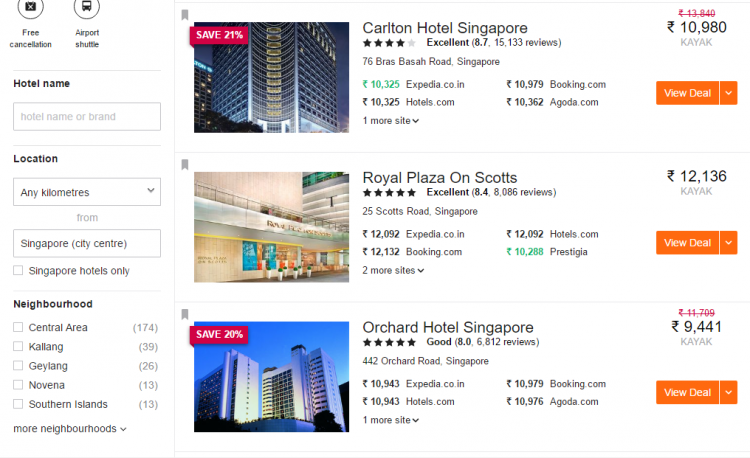
‘Book-now’ Feature: A Challenge to the OTAs?
Meta search engines have equipped themselves with more than just an aggregation and price comparison platform in the last few years. ‘Book now’ is a feature they introduced to strengthen their roots in the travel industry by providing a richer user experience for the users. The ‘book-now’ feature is basically an integration of the booking system of suppliers with that of the Meta search engines and could pose a challenge to the OTA business model. But, recent trends prove this wrong. We see OTAs coexisting with meta search sites without negatively impacting each other’s business models. It is better to view the combined growth of OTAs and metasearch engines from a consumer’s view point, where it can only provide benefits. Both OTAs and metasearch engines can assist travelers by helping them find the best deals while planning their trip.
Competition in the Travel industry Fueled by Web Crawling
As prices shown on OTAs change by hours if not minutes, the competition in this domain is hitting peak levels. OTAs are using web crawling services to crawl real time prices from their competitors so as to programatically update their own pricing. Now that travelers have a multitude of options to choose from, having a competitive pricing is extremely important. There are DaaS providers specializing in extracting large amount of data from the web in near real time, consistently. This has significantly contributed to the competitive factor of travel industry.
Sharing is caring!
Recent post

Financial Market Analysis through Web Scraping: Unlocking
- April 18, 2024

Exploring the Benefits of Automated Data Collection
- April 17, 2024

Unlocking the Potential of Social Media Data

Overcoming the Challenges of Data Extraction at
- April 16, 2024

The Impact of AI on Web Scraping

Ensuring Superior Data Quality: How PromptCloud Outperforms
- April 15, 2024
More from Blog

Are you looking for a custom data extraction service?

- Name * First Last
- Company Name *
- Contact Number *
- Company Email *
- What data type are you looking for? What type of data do you need? Ecommerce Product Data Travel Data Data for AI Jobs Data News, Articles, and Forums Product Reviews Real Estate Listings Airline Data Hotel Listings and Pricing Data Social Media Data Market Research and Analytics Automobile Data Image Extraction Others Please select the data type your project needs
- Requirements *
- I consent to having this website store my submitted information so they can respond to my inquiry.
- Hidden Tags
- Hidden CTA Type
- Name This field is for validation purposes and should be left unchanged.
Please fill up all the fields to submit
- Phone This field is for validation purposes and should be left unchanged.

Need an Airline Ticket? Meta-Search is Where Most Travelers Start
By Frommer's Staff
Tribune Media Services
Conventional wisdom says most airfare searches start at an online travel agency or airline website.
But the conventional wisdom could be wrong.
Asked where they begin a ticket query, a new survey points to so-called "meta" search sites such as Hipmunk.com , Kayak.com and Mobissimo.com , which cull fares from multiple airlines and online agencies and then display the choices.
A slim plurality of travelers in a new Consumer Travel Alliance poll (37 percent) say they click on a meta-search site first. Another 35 percent begin with the airlines' own websites, such as AA.com and Delta.com .
About 1 in 5 travelers go directly to an online agency, while only 7 percent call a travel agent and 2 percent visit a search engine like Google or Bing .
The survey of more than 800 air travelers comes at time when a coalition of online agencies is fighting a proposal by Google to acquire ITA Software, which develops airfare search applications for several major travel sites and has its own site, ITAsoftware.com , that is something of a cult favorite for meta-searches.
The coalition, which calls itself Fair Search, claims Google's acquisition will create a monopoly that would raise airfares, and is pressuring the Justice Department to stop the sale.
It also comes as online travel agencies are fighting airlines over how tickets are distributed online, according to Charlie Leocha, director of the Consumer Travel Alliance. None of the major airlines currently disclose their ancillary fees, such as extra charges for baggage, meals and reservations, to travel agents in a meaningful, systematic way. (Full disclosure: I helped found the Consumer Travel Alliance and am its ombudsman.)
Google's pending purchase of ITA would further distort what consumers see through a Google-dominated search, since most meta-search engines use ITA software, he says.
"The airlines move towards obscuring airfares and fees, combined with possible Google manipulation of search results to keep advertisers happy rather than provide unbiased prices, bodes poorly for consumers," he says.
A closer look at the way air travelers buy their ticket suggests they are adaptable, savvy and somewhat frustrated as a group. Perhaps more so than the industry is willing to acknowledge, at least publicly.
"I always start with Kayak.com," says Jack Vanesko, a retiree who lives in Ajijic, Mexico. "Then I go to the specific airline I think I will be using, and make the reservation directly with the airline. I have yet to find an easier way."
Tom Logue, a market researcher from Memphis, plays an agency off an airline when he goes shops for a ticket.
"First I go to Delta, my airline of choice," he says. "If the fare seems outrageous, I will go to Expedia to compare fares, hoping that I can justify a purchase through Delta. Either way, I always buy through the airlines rather than other sites."
Marti Mayne, a frequent flier from Yarmouth, Maine, does it the other way around, beginning with Expedia .
"I guess that's because I'm used to their format and it allows me to scan different airlines and prices and schedules quickly and easily," she says. "I then move on to Travelocity and Orbitz , but usually don't find anything very different there."
But Mayne always books the final ticket through the airline, because airlines take better care of direct-booking customers.
"I've been screwed too many times and ended up having to spend the night in the airport because I had an Expedia-issued ticket, and the airline wouldn't do anything to re-book it when delays occurred," she says.
Barbara Gorman, on the other hand, typically shops for the lowest price.
"I start at Orbitz.com to do a search to see which airline has the lowest fare but then I normally go directly to the airlines site of one of the few airlines I prefer to travel in order to earn my frequent flier miles," she says.
If all of this seems like a game, that's because it is - at least to many of the air travelers who participated in the poll. If there were a place -- either online or offline -- where they could be assured of a reasonable price and service, they say, they'd choose it every time.
"I feel that we have been forced to spend inordinate amounts of time searching online ourselves for the best deal, the best times to fit our schedules so that we can take a trip, and then after we make tentative decisions about those, we have to wade through all the a la carte charges for everything," says Sylvia Prast, an exasperated frequent traveler.
Finding such a place to buy airline tickets could be a tall order.
Christopher Elliott is the ombudsman for National Geographic Traveler magazine and the host of "What You Get For The Money: Vacations" on the Fine Living Network. E-mail him at [email protected] .
(c) 2010 Christopher Elliott. Distributed by Tribune Media Services, Inc.
Talk with fellow Frommer's travelers on our Air Travel Forum.

- All Regions
- Australia & South Pacific
- Caribbean & Atlantic
- Central & South America
- Middle East & Africa
- North America
- Washington, D.C.
- San Francisco
- New York City
- Los Angeles
- Arts & Culture
- Beach & Water Sports
- Local Experiences
- Food & Drink
- Outdoor & Adventure
- National Parks
- Winter Sports
- Travelers with Disabilities
- Family & Kids
- All Slideshows
- Hotel Deals
- Car Rentals
- Flight Alerts
- Credit Cards & Loyalty Points
- Cruise News
- Entry Requirements & Customs
- Car, Bus, Rail News
- Money & Fees
- Health, Insurance, Security
- Packing & Luggage
- -Arthur Frommer Online
- -Passportable
- Road Trip Guides
- Alaska Made Easy
- Great Vacation Ideas in the U.S.A.
- Best of the Caribbean
- Best of Mexico
- Cruise Inspiration
- Best Places to Go 2024
- United Arab Emirates
- Switzerland
- The Netherlands
- Puerto Rico
- United States
- New Zealand
- ➨ Choose from World Map
- Budget Travel
- Family Travel
- Getting Around
- Visas & Passports
- Work with Us
Browsing Category
- Czech Republic
- Saint Martin
- Uncategorized

Moscow Travel Guide: Best Things to Do + More [2023]
· everything to know about visiting moscow, including the best things to do and how to get around. ·.
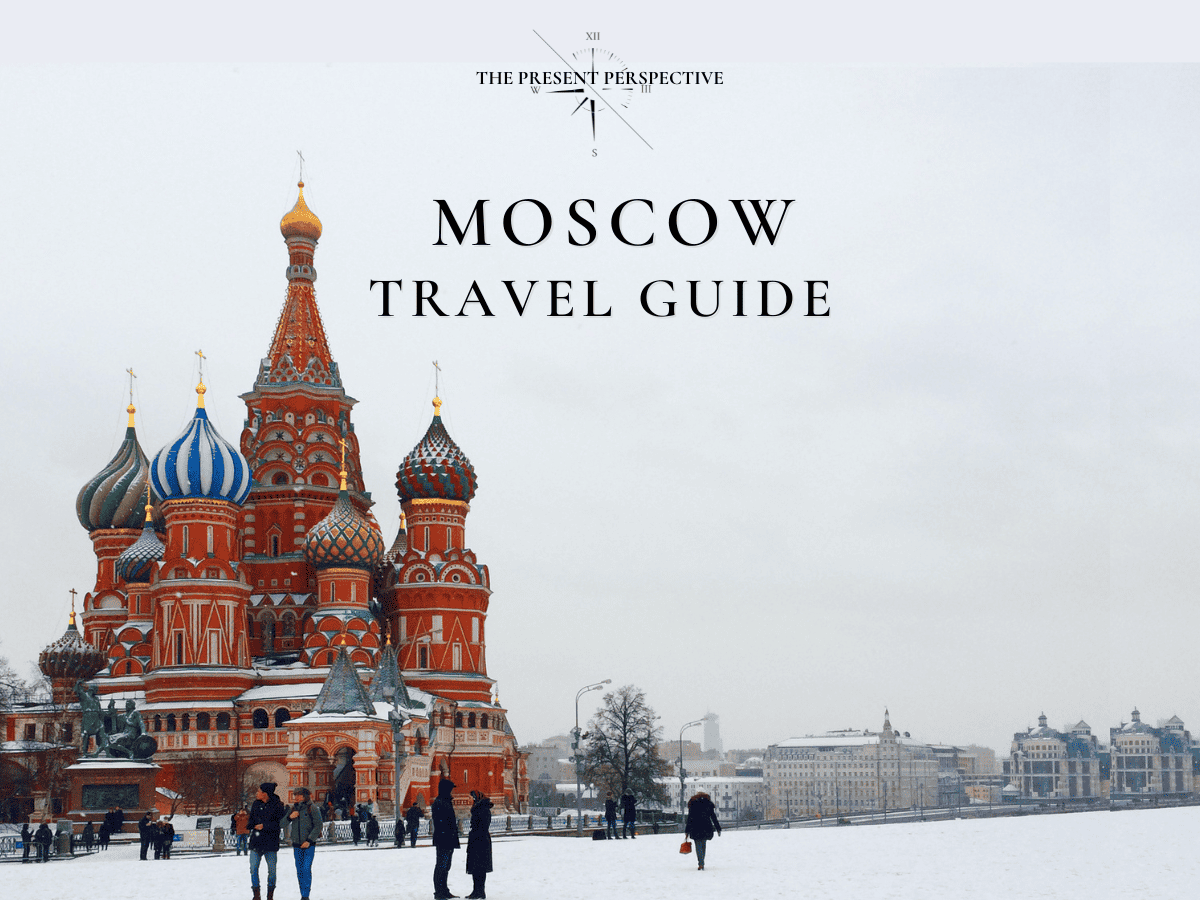
Moscow is Russia’s vibrant capital city, and it also happens to be the largest city in all of Europe. The city’s long and infamous history makes it one of the most unique places we have ever visited.
The architecture ranges from centuries-old palaces to uniform, gray concrete buildings. The people range from cold and private to warm and welcoming. Moscow is a city is strong juxtapositions, and we learned a lot during our time there.
This post will break down all you need to know about visiting Moscow, including the best things to do, how to get there, how to get around, and more.
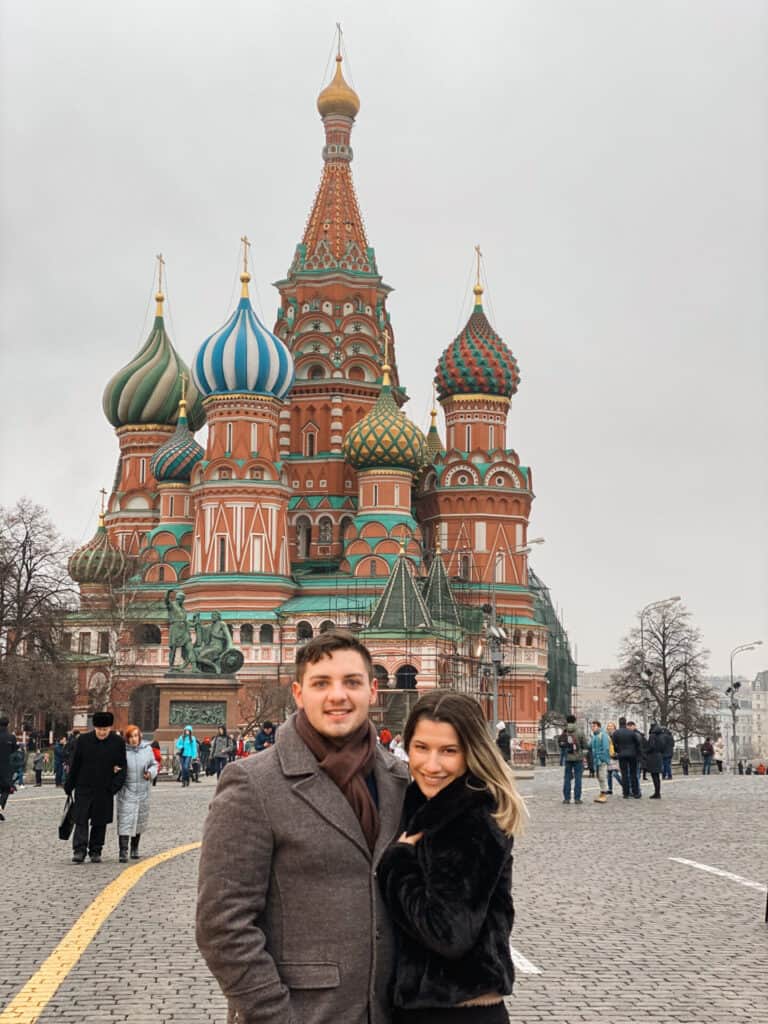
The Best Things to Do in Moscow
1. explore the red square.
The Red Square is the heart of Moscow. Most of the city’s top attractions can be found here, including just about everything on this list. The Kremlin, St. Basil’s Cathedral, and Lenin’s Mausoleum are all located here, and the State Historical Museum and GUM are not far from here, either.
The Red Square is a common home for parades, protests, and seasonal celebrations. There are massive Christmas celebrations here, with food vendors and carnival rides set up in numbers.
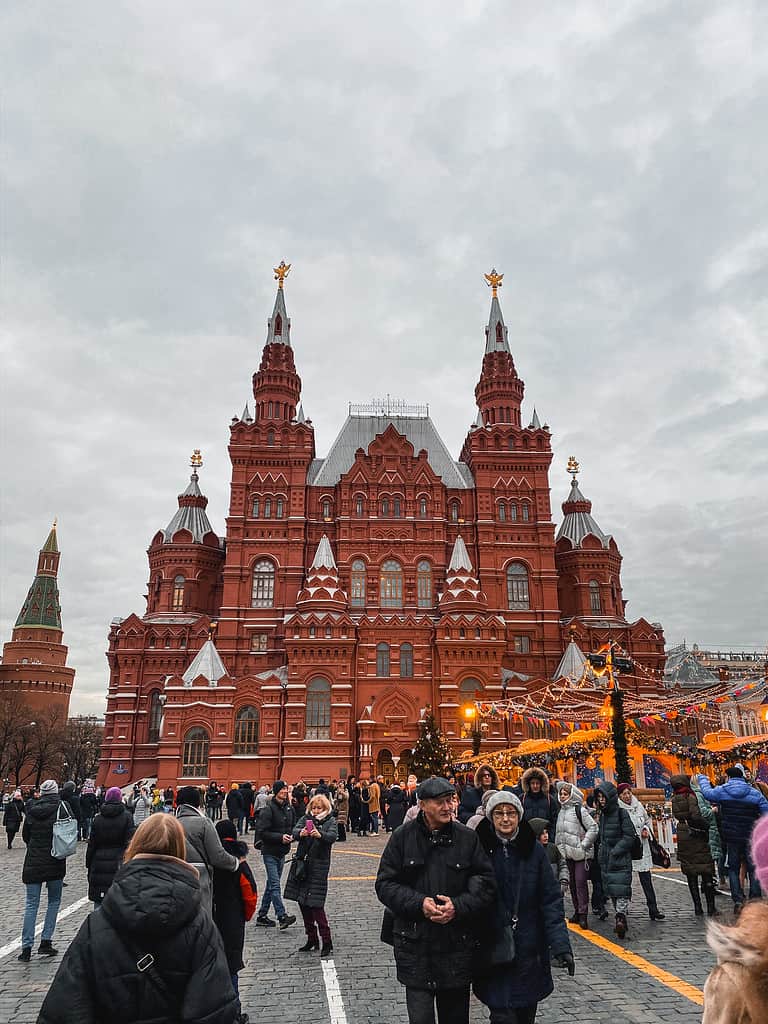
2. Check Out the Ziferblat
The Ziferblat is a café in Moscow that is unlike any café we have ever been to. While most cafes charge you for your drinks and food, the Ziferblat charges you for your time.
Upon arrival, you are given a clock. When you leave, the barista calculates how much time you spent in the café and charges you accordingly. This concept was created to help visitors to be more intentional with their time, and the cafe itself is incredibly charming.
For a detailed look at everything you need to know before you visit, make sure you read my post about visiting the Ziferblat Cafe in Moscow .

3. Marvel at St. Basil’s Cathedral
St. Basil’s Cathedral is one of the most iconic churches in the world, and it was the single thing we were most excited to see while in Moscow. Built almost 500 years ago, St. Basil’s Cathedral is recognized by its colorful domes and whimsical style. The church is of the Russian Orthodox faith, and the inside is just as wondrous as the outside.
St. Basil’s Cathedral is located on the edge of the Red Square, making it incredibly convenient to visit. Entrance for non-worshippers costs 800 rubles, and tickets can be bought at the church
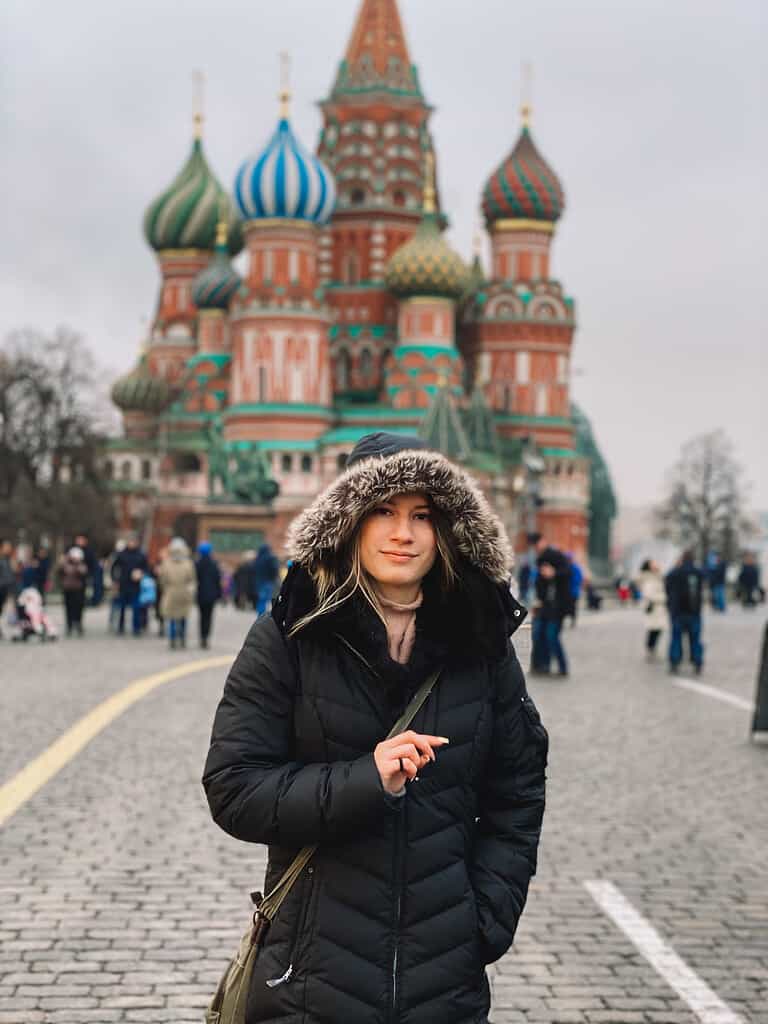
4. Explore the Kremlin
The Kremlin is the largest active fortress in Europe, and it is the site of most of Russia’s government affairs. In addition to government buildings, the Kremlin Complex is filled with courtyards, towers, and museums that are open to the public. If you have the time, you could spend a couple of days fully exploring all that there is to see in the Kremlin.
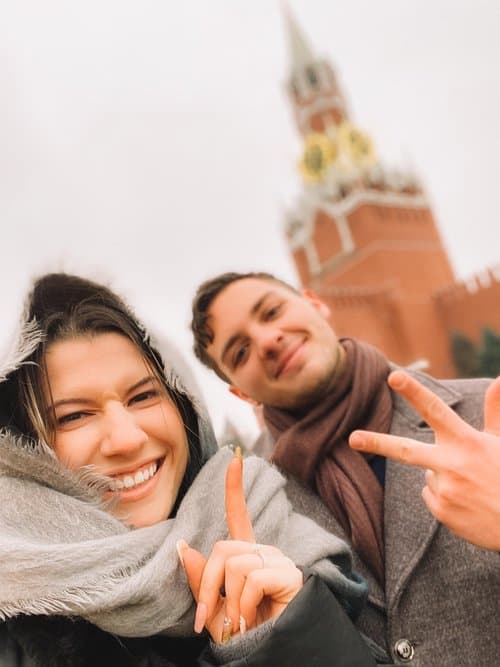
5. Walk Through Lenin’s Mausoleum
Vladimir Lenin is one of the most important figures in Russian history, and his body is located perfectly embalmed in a mausoleum in the Red Square. The Mausoleum is open to the public to visit, and as long as you are willing to go through a few security checks, it is easily one of the best things to do in Moscow. Its convenient location in the Red Square makes it a can’t miss attraction.
There is absolutely no photography allowed inside the Mausoleum. Do not test this rule.
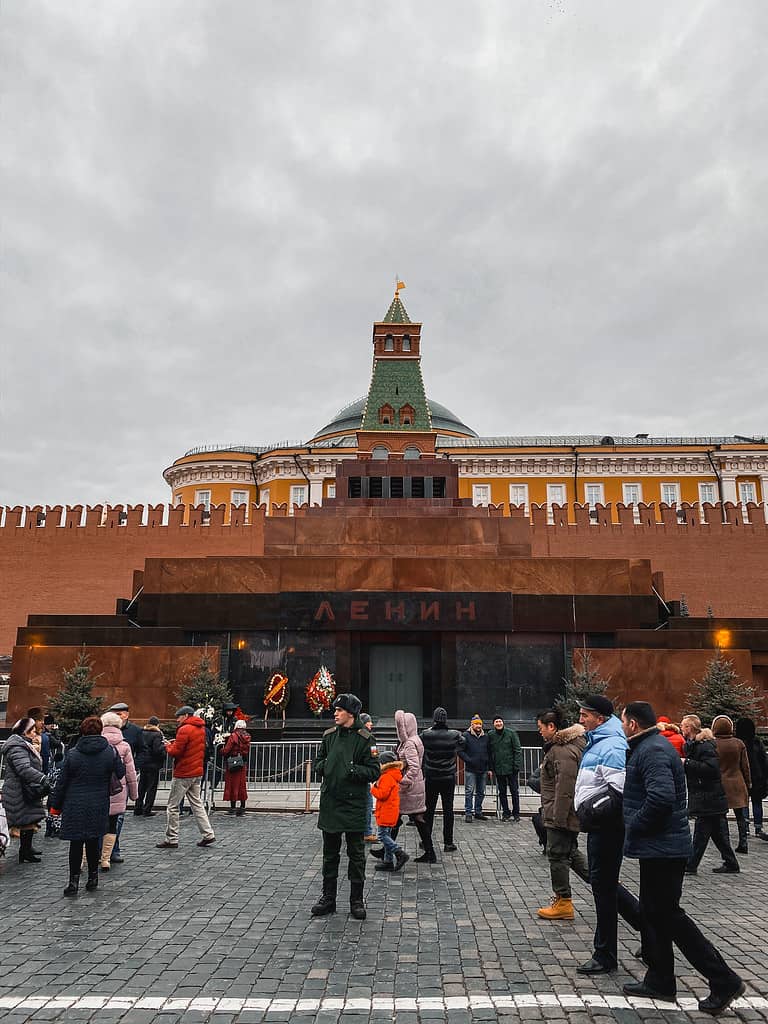
6. Wander Along Arbat Street
The Arbat is a very popular street in Moscow that is lined with stores, cafes, and other touristy attractions. It is one of the oldest streets in the city, dating back to the 1400s. This street is both quaint and trendy, and there are many walking tours that introduce tourists to the neighborhood’s wonders and highlights.

7. Catch a Show at the Bolshoi Theatre
As a lover of the arts, it is hard to think of Moscow and not think of ballet. Russia has always been a top dog in the world of fine arts, and Bolshoi Theater is one of the best places to catch a performance. We were lucky enough to attend an Opera here, and it is a venue that you don’t want to miss out on if you enjoy opera, ballet, or orchestral performances.
8. Visit the State Historical Museum
The State Historical Museum is one of the most respected museums in Moscow. Despite its name, it is not really focused on the history of Russia as a nation. Rather, it contains a collection of artifacts from all throughout Russia’s history.
The museum’s collection is very broad in nature. It houses some items from indigenous tribes that used to occupy the region, pieces collected by the Romanov family, and more.
9. Wander Around GUM
GUM is an absolutely massive mall within walking distance of the Red Square. It isn’t just the size that draws visitors here; it’s the sense of luxury. The mall is so beautiful inside, much like the metro stations.
While visiting a mall might not sound like it belongs on a bucket list, this mall does. You will not want to miss out on visiting GUM while in Moscow.

10. Admire the Cathedral of Christ the Saviour
While St. Basil’s Cathedral is the most iconic church in Moscow, it isn’t the only one. The Cathedral of Christ the Saviour is absolutely stunning, with massive golden domes. It is the tallest Orthodox church in the world, and it is the seat of the Orthodox Patriarch of Moscow.
It is located just about a mile from the Red Square, just south of the Kremlin Complex. You can walk to it from the Red Square in about 20 minutes.
How to Get to Moscow
Flying to moscow.
Moscow has three major international airports: Sheremetyevo (SVO) , Domodedovo (DMO) , and Vnukovo (VKO) . All three of them are directly connected to downtown Moscow by the Aeroexpress trains, which leave every 30 minutes throughout the day. By Aeroexpress train, you can expect to get to the city center in 25-45 minutes depending on the airport that you fly into.
Sheremetyevo is the biggest and busiest of the three airports, and it is the one you are most likely to fly into – especially if you are coming from outside of Europe or the Caucus region. We flew into Sheremetyevo on a direct flight from New York City.
I usually provide backup airport options, because flying right into the city isn’t always the cheapest way to get where you’re going. Unfortunately, when it comes to Moscow, don’t really have a choice other than to fly right into Moscow. It is a very remote city, and it is usually the cheapest place to fly into in Russia as a whole.
Since Sheremetyevo is so busy, you will probably find a great flight option anyway. I wrote in my post about finding cheap flights that using hub airports will lead to more affordable airfare, and the same logic applies here. Even though Russia’s national airline, Aeroflot, is no longer a member of the SkyTeam Alliance, Moscow is still a major hub connecting passengers from all over the world.
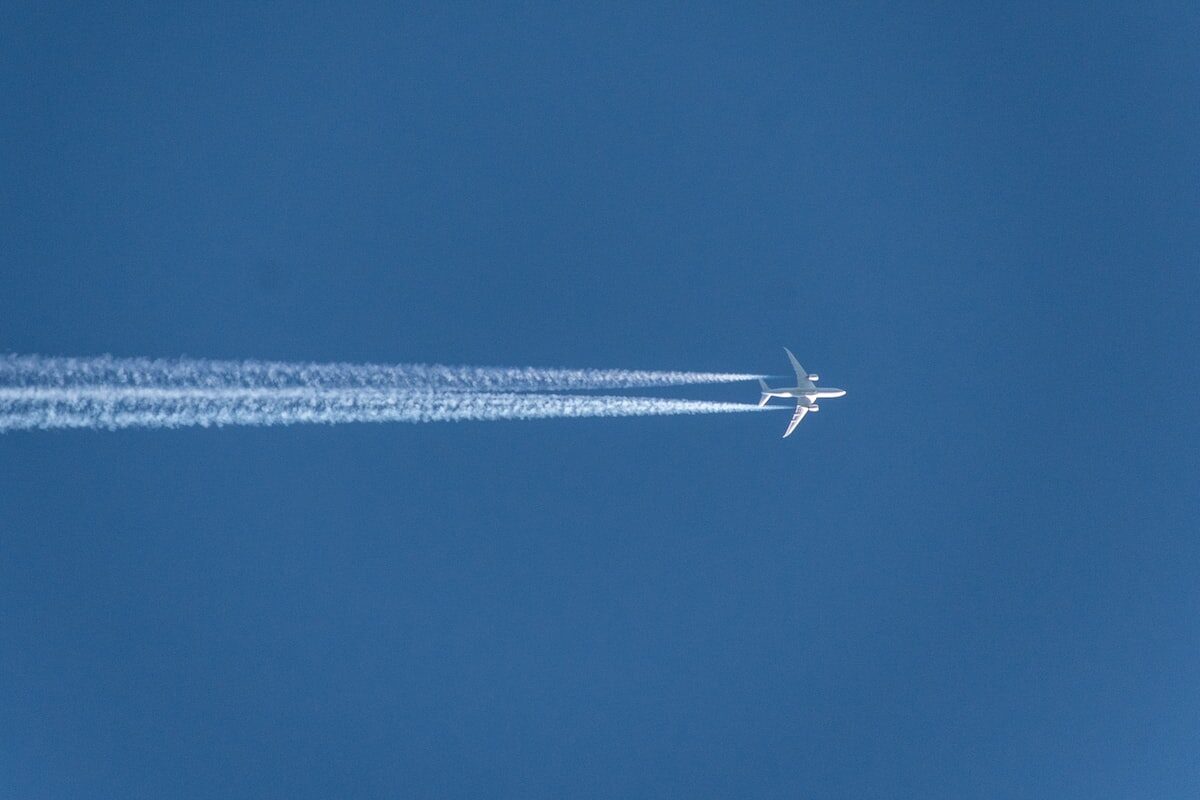
READ OUR CHEAT SHEET
Train or Bus to Moscow
Trains and buses are one of the most popular ways to get around Europe. However, they’re of very little use when you’re trying to get to Moscow.
Moscow is hundreds of miles from the nearest major cities. The only major European city that can even be reached within 8 hours on the ground is St. Petersburg, and even the Baltic capitals of Riga, Vilnius, and Tallinn are over 12 hours away.
If you want to get to Moscow, the best option is almost always to fly. While the train routes to Moscow are scenic, they simply take forever.
How to Get Around Moscow
METRO | TROLLEYS | TRAMS | BUSES
Moscow has one of the most memorable metro systems in the world. Its metro lines are very deep underground, and the stations are absolutely stunning. Each station has its own unique style, but all of them contain escalators that seem to go on forever.
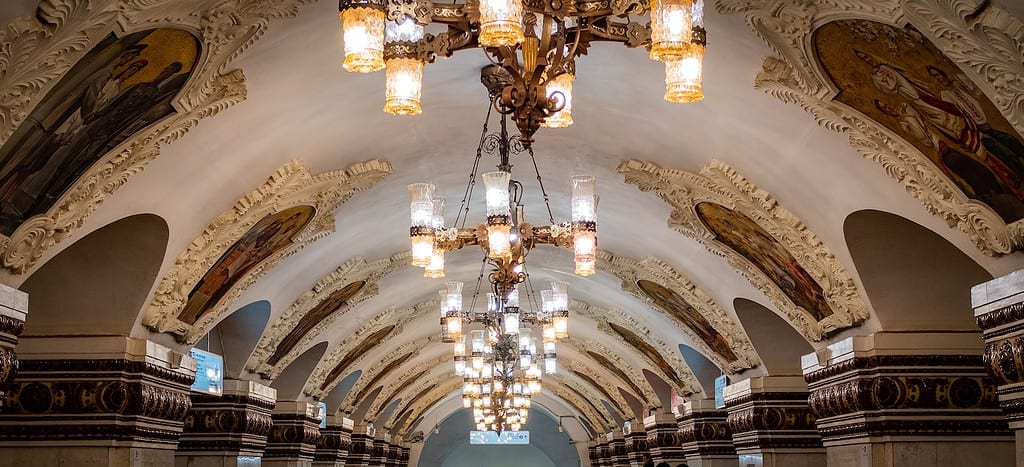
The system was built in an effort to showcase the power of the Soviet Union and its bright future. The plans were a form of propaganda, but they resulted in what is still one of the most visually appealing subway systems on earth.
Moscow’s metro system isn’t just pretty. It is also very useful and accessible. The system has 17 lines that connect the city and its surrounding area.
But wait; there’s more!
The Moscow metro system is also incredibly affordable, with each ride costing less than a dollar. The metro is by far the best way to get around Moscow, as it is almost impossible to beat the connection times and the low cost to ride.
Tickets can be bought at electronic, English-speaking kiosks in stations, or directly from ticket counters at certain larger stations. There are also day passes available, which are a very solid option if you plan on riding the metro several times per day.
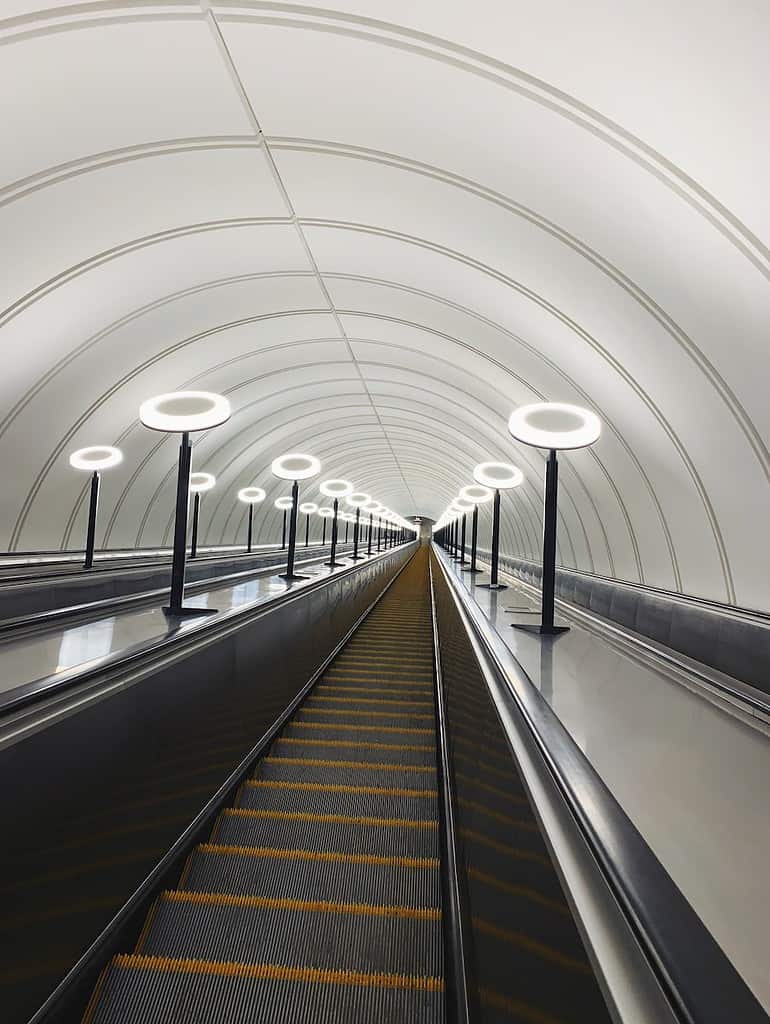
The metro is by far the best way to get around Moscow.
In addition to the metro system, Moscow also has a network of buses, trams, and trolleys. This system is nowhere near as convenient or well-connected as the metro, though, and is likely of little use to you during your trip. There is no Uber in Moscow, but a similar app named Yandex is available if you need a ride in a pinch.
How Many Days Do You Need in Moscow?
Moscow is the biggest city in all of Europe, and it is absolutely loaded with things to do. You could spend weeks in Moscow and still find new things to do. Of course, most travelers don’t have that kind of time to spend in one place!
I recommend spending no less than three full days in Moscow, and ideally closer to five or seven.
Moscow is very spread out, and it can take some time to get from one major point to another. There are also so many places that are nice to just sit back and relax, which is hard to do when you’re in a hurry trying to cram activities into just a few days.
If you only have a week to visit Russia, I’d advise spending all of the time in one city. If you decide to split your time between Moscow and St. Petersburg, I recommend not trying to squeeze in any day trips beyond those two cities.
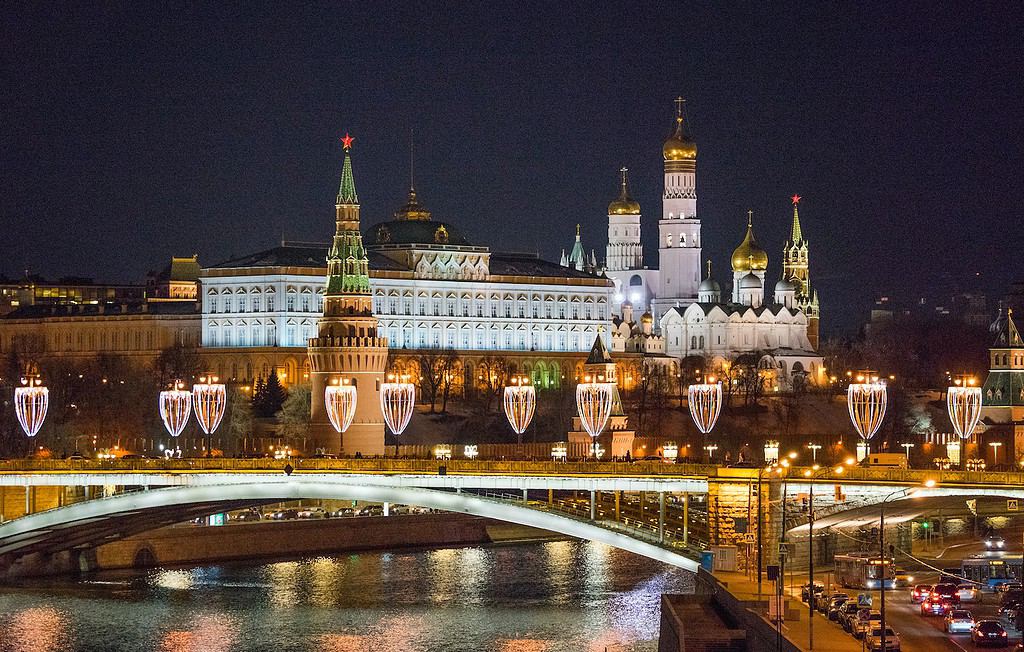
When Is the Best Time of the Year to Visit Moscow?
There are two different ways to approach this question. Personally, I think the best time to visit Moscow is around Christmas and New Year’s Day. While the weather will be absolutely freezing, Moscow is a surreal winter wonderland in December and January.
We were in Moscow right before Christmas. While it was very cold, you can always bundle up. Exploring the Christmas markets and pop-up ice skating rinks throughout Moscow is one of my favorite memories from anywhere I’ve traveled, and I dream of going back to do it again.
If you aren’t fond of the cold, Moscow is beautiful in the summer. It tends to get pretty cold in the shoulder seasons, so if you want warm weather, you should plan to visit in the summer. Moscow actually gets pretty warm in July and August, and there are a bunch of fantastic places to soak up the sun within the city.
The best time to visit Moscow is either around Christmas or from late May to August.
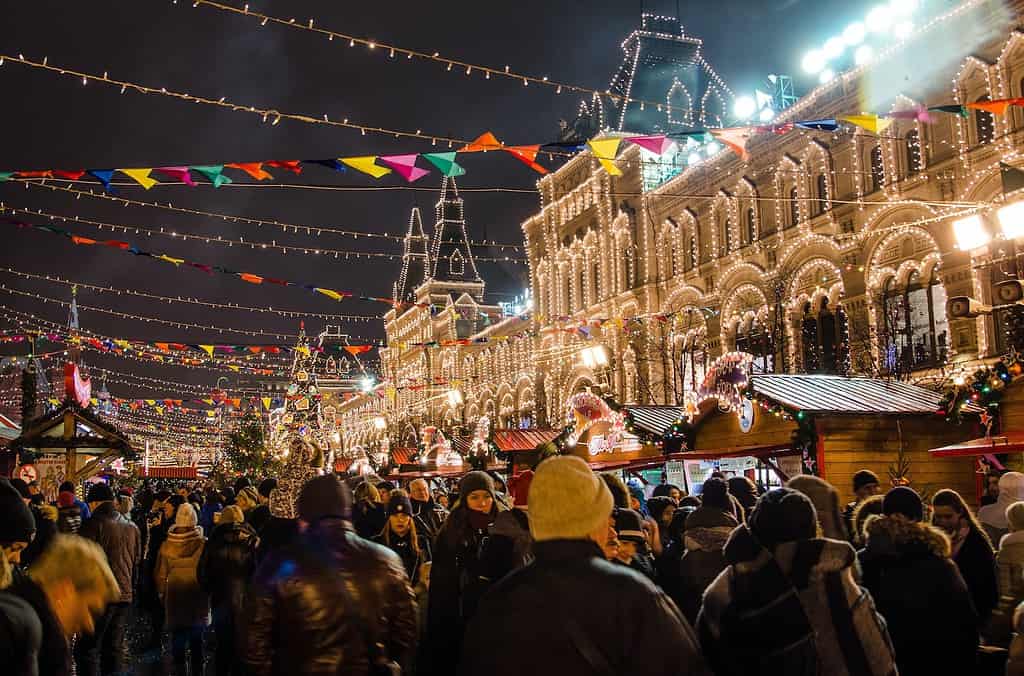
Is Moscow Safe to Visit?
While Moscow is a truly wonderful city, there’s no denying that visiting Russia comes with risks. As the country is run by an infamous communist dictator, concerns about visiting are valid. While we didn’t experience any sort of threat or negative treatment during our time in Moscow, we visited in a peaceful time.
In our experience, Russia doesn’t seem to detain normal Americans or Westerners to use as pawns. As a regular person, as long as you don’t commit any crimes, there is a slim chance you will run into any issues. However, Russia will not hesitate to enforce its laws against foreigners, and illegal behaviors will likely land you in a very compromising position.
Russia will not hesitate to enforce its laws against foreigners, and illegal behaviors will likely land you in a very compromising position.
To make matters worse, Russia has a bad reputation for gang violence. While the Russian mafia has very little interest in normal Western tourists, they won’t hesitate to pick a fight with anyone who ventures into their sphere of influence. If you seek out illegal substances or activities, you could be a target of the mafia.
If you seek out illegal substances or activities, you could be a target of the mafia.
Finally, since Russia’s invasion of Ukraine, things are all very different. Russia is currently at war, and there are battles raging within 8 hours of Moscow. While it is still relatively safe to visit, that could change at any time as the war with Ukraine continues.
Is Moscow Worth Visiting?
Without a doubt, Moscow is worth visiting. It is one of the most unique major cities we have ever visited, and we hope to make it back one day. The Russian Orthodox churches are stunning, the city’s history is unlike any other, and the food is to die for.
While many visitors prefer St. Petersburg to Moscow, I think Moscow deserves a lot of hype of its own. Moscow is the beating heart of Russian culture and history, and it’s a place I highly recommend checking out if you have the chance.
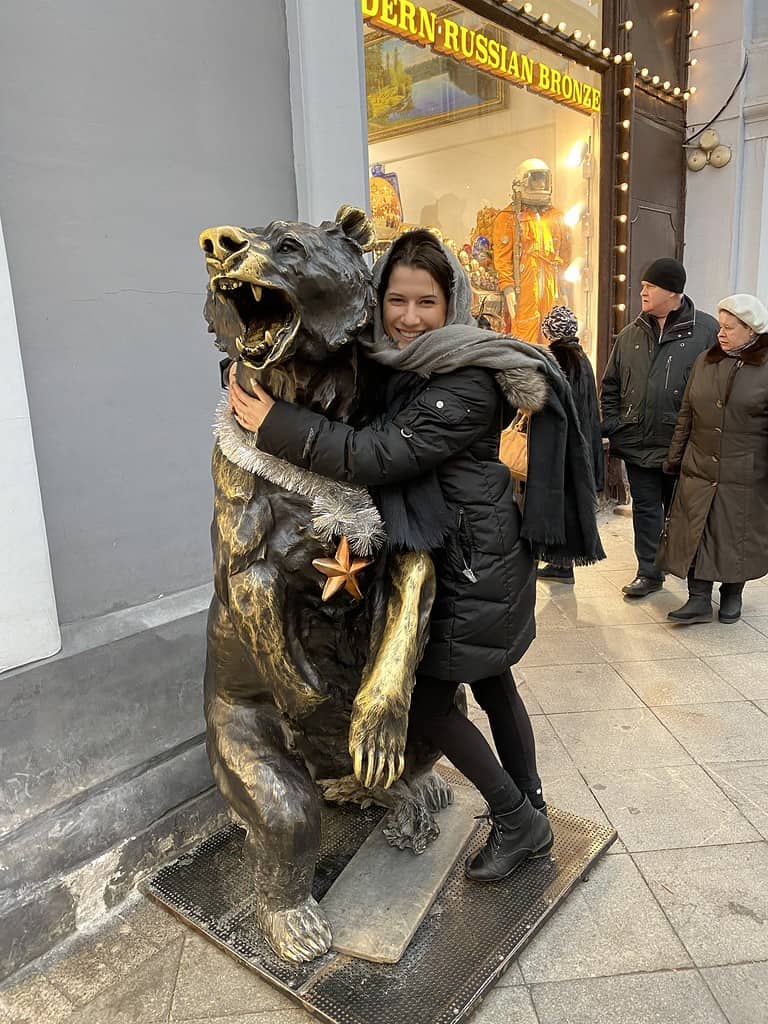
That’s all we have for you about Moscow! I hope this post was helpful as you plan your trip to Russia’s capital.
Have you been to Moscow? Or is this your first time visiting? Comment below if you have anything to add to our travel guide!
Hi, I'm Greg. I'm an avid traveler who has traveled to over 50 countries all around the world with my wife and kids. I've lived in Italy, Mexico, China, and the United States, and I dream of moving abroad again in the future. With this blog, I provide my audience with detailed destination guides to my favorite places and pro-tips to make travel as stress-free as possible.
Leave a comment
Save my name, email, and website in this browser for the next time I comment.
Meet The Author - Greg
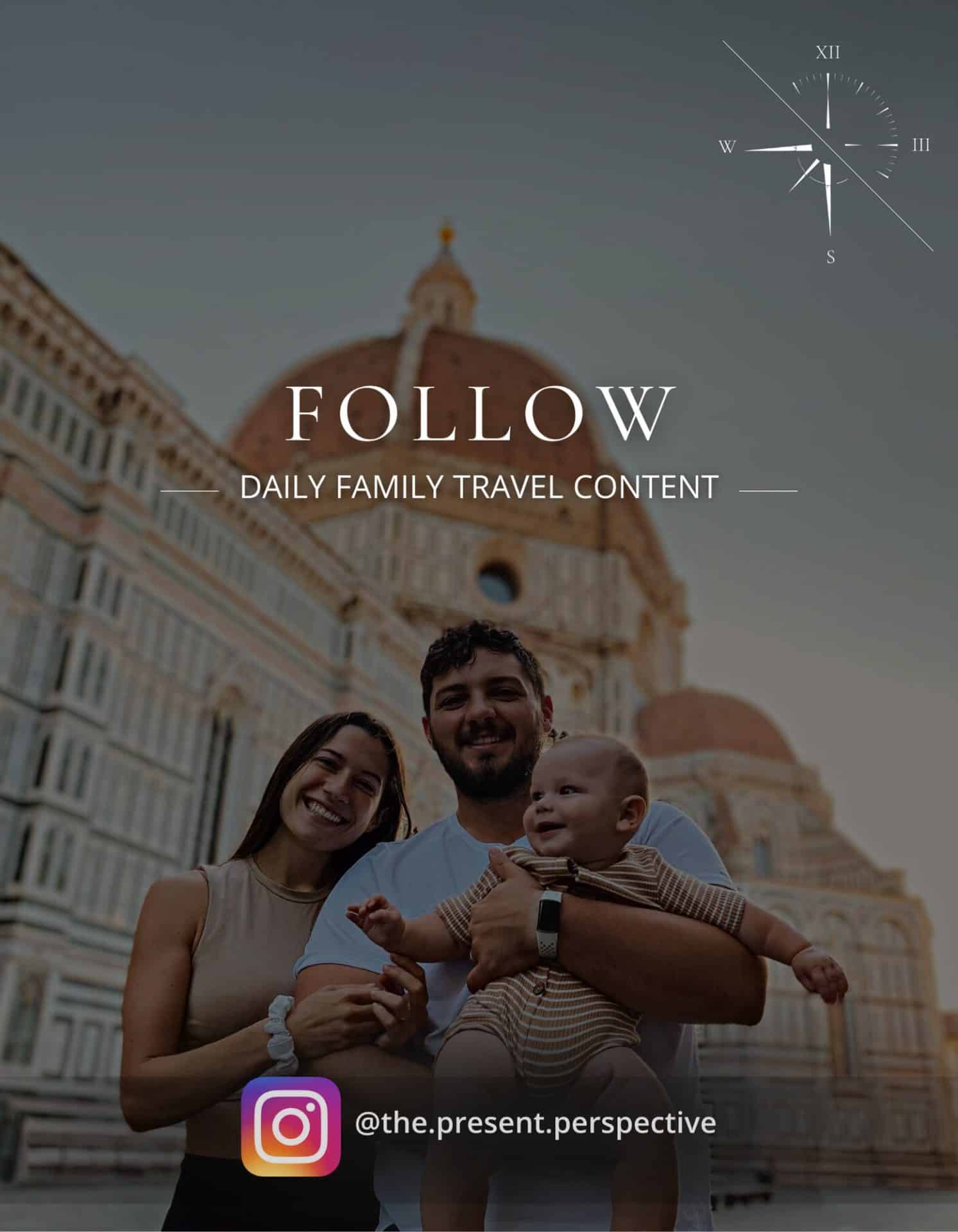
Recent Post

How Much Does a Trip to Egypt Cost: Budget Breakdown
March 10, 2024

Best Time to Visit the India Gate in Delhi [2024]
March 1, 2024

Flying with a Sinus Infection: Tips to Avoid Pain
February 20, 2024

11 Best Things to Do in Breckenridge Besides Skiing
February 12, 2024

10 Best Beaches in Mexico for Families (We Lived Here)
February 3, 2024
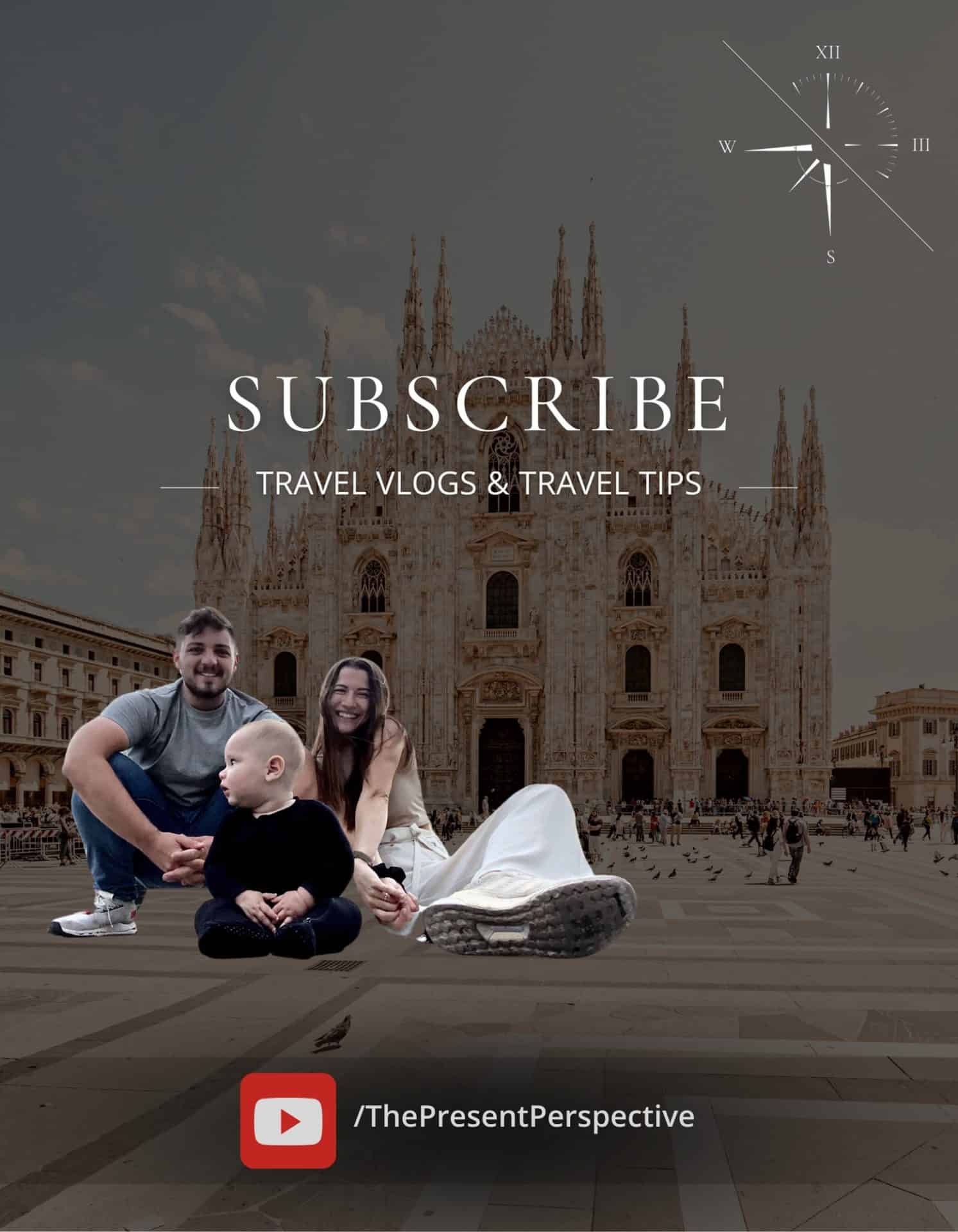
We’re on the road right now – join in on the fun and follow @thebrokebackpacker on IG!
- Meet the Team
- Work with Us
- Czech Republic
- Netherlands
- Switzerland
- Scandinavia
- Philippines
- South Korea
- New Zealand
- South Africa
- Budget Travel
- Work & Travel
- The Broke Backpacker Manifesto
- Travel Resources
- How to Travel on $10/day
Home » Europe » Moscow
EPIC MOSCOW Itinerary! (2024)
Moscow is the heart of Mother Russia. Just the mention of this city conjures images of colorful bulbous pointed domes, crisp temperatures, and a uniquely original spirit!
Moscow has an incredibly turbulent history, a seemingly resilient culture, and a unique enchantment that pulls countless tourists to the city each year! Although the warmer months make exploring Moscow’s attractions more favorable, there’s just something about a fresh snowfall that only enhances the appearance of the city’s iconic sites!
If you’re a first-time visitor to Moscow, or simply wanting to see as much of the city as possible, this Moscow itinerary will help you do just that!

Unlock Our GREATEST Travel Secrets!
Sign up for our newsletter and get the best travel tips delivered right to your inbox.
Best Time To Visit Moscow
Where to stay in moscow, moscow itinerary, day 1 itinerary in moscow, day 2 itinerary in moscow, day 3 and beyond, staying safe in moscow, day trips from moscow, faq on moscow itinerary.
Here is a quick look at the seasons so you can decide when to visit Moscow!
The summer months (June-August) are a great time to travel to Moscow to take advantage of the enjoyable mild temperatures. This is considered peak travel season. Bear in mind that hotel prices rise along with the temperatures!
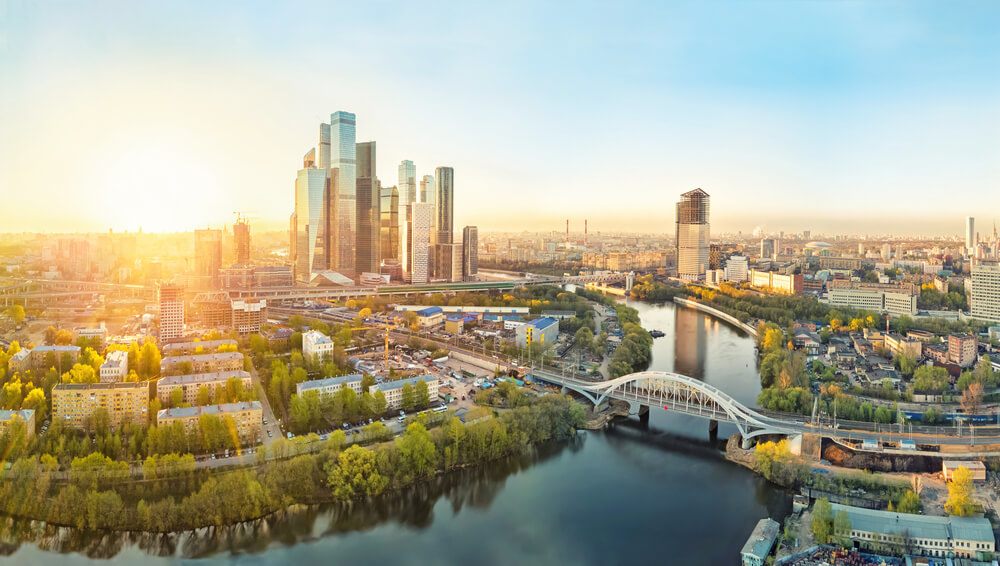
If you’re planning a trip to Moscow during fall (September-November) try to plan for early fall. This way the temperatures will still be pleasant and winter won’t be threatening.
Russian winters (December-February) are not for the faint of heart as Napoleon learned to his peril. Some days the sun will be out for less than an hour, and snow is guaranteed. Although winters are exceptionally cold, this is when you’ll get a true glimpse of the Moscow experience!
The best time to visit Moscow is during spring (March-May). The temperatures will begin to creep up and the sun begins to shine for significant portions of the day. Hotel rates will also have yet to skyrocket into peak ranges!

With a Moscow City Pass , you can experience the best of Moscow at the CHEAPEST prices. Discounts, attractions, tickets, and even public transport are all standards in any good city pass – be sure invest now and save them $$$ when you arrive!
Moscow is a large city with many accommodation options to choose from. Staying in a location that fits with your travel plans will only enhance your Moscow itinerary. Here is a brief introduction to a few great areas of the city we recommend checking out!
The best place to stay in Moscow to be close to all the action is Kitay-Gorod. This charming neighborhood will put you within walking distance to Moscow’s famous Red Square, thus cutting down on travel time. This will allow you to see more of the city in a shorter amount of time!
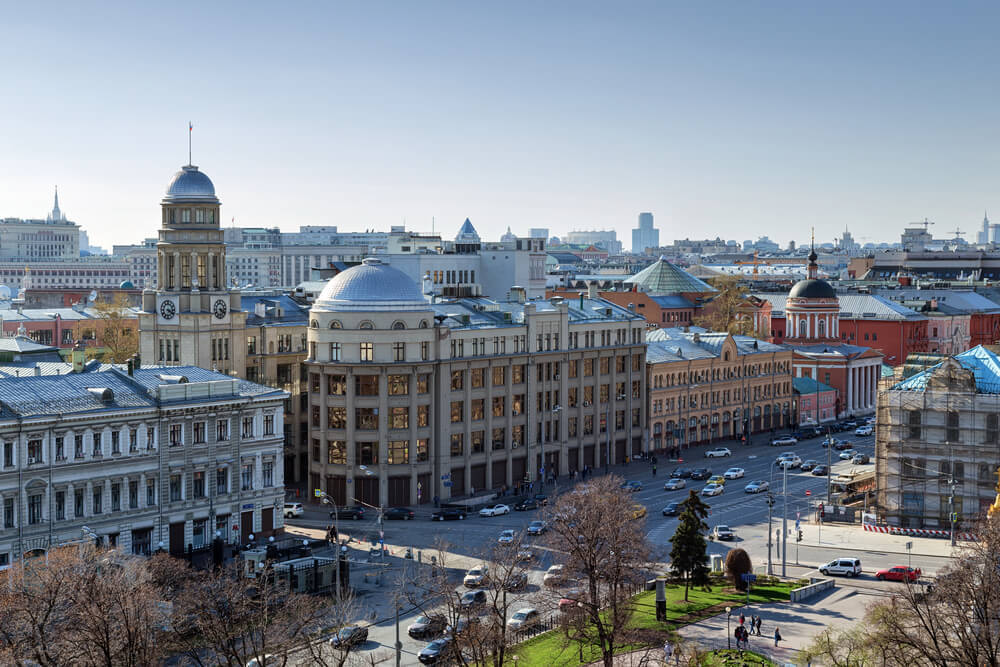
It’s surrounded by restaurants, cafes, bars, and shops. If you’re a first-time visitor to Moscow, or just planning a quick weekend in Moscow, then this area is perfect for you!
Another great area to consider is the Zamoskvorechye district. This area of the city offers a blend of new and old Moscow. It has an artsy vibe and there are plenty of fun sites you can explore outside of the main touristy areas of Moscow.
Of course, as in all areas of Moscow, it’s close to public transportation that will quickly connect you with the rest of the city and make your Moscow itinerary super accessible!
Best Airbnb in Moscow – Exclusive Apartment in Old Moscow
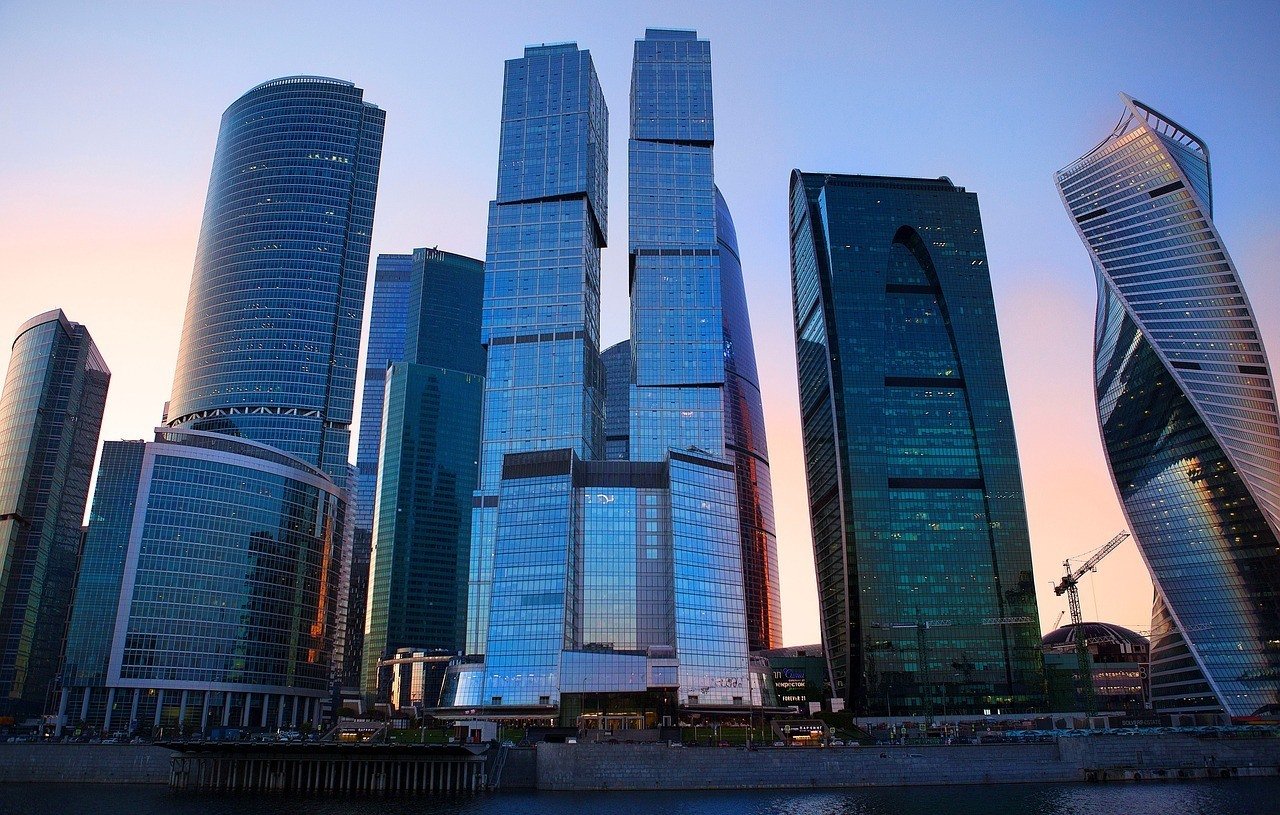
Modern and cozy, this apartment is in the heart of Old Moscow. Bordering the Basmanny and Kitay-Gorod districts, this two-bedroom flat is walking distance to the Kremlin and Red Square. Safe, quiet, and comfortable, this is the best Airbnb in Moscow, no question!
Best Budget Hotel in Moscow – Izmailovo Alfa Hotel

The Izmailovo Alfa Hotel is a very highly rated accommodation that provides all the components necessary for a comfortable trip to Moscow. There is an on-site restaurant, bar, fitness center, and an airport shuttle service. The rooms are modern and spacious and are equipped with a TV, heating/air conditioning, minibar, and more!
Best Luxury Hotel in Moscow – Crowne Plaza Moscow World Trade Centre
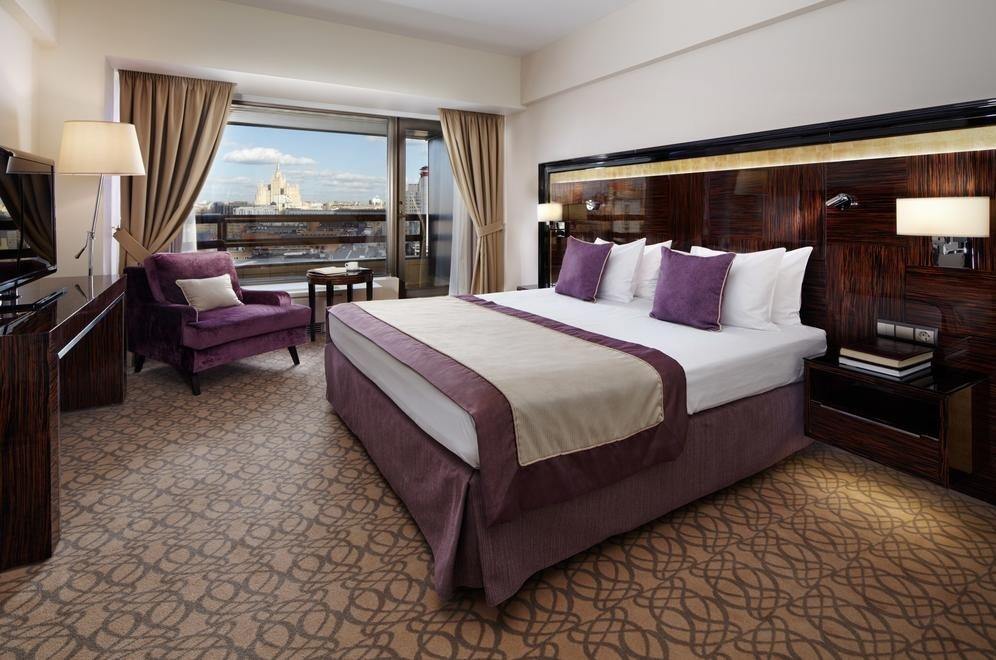
If you’re touring Moscow in luxury, the Crowne Plaza Moscow World Trade Centre is the hotel for you! Elegantly furnished rooms are equipped with a minibar, flat-screen TV, in-room safes, as well as tea and coffee making facilities! Bathrooms come with bathrobes, slippers, and free toiletries. There is also an onsite restaurant, bar, and fitness center.
Best Hostel in Moscow – Godzillas Hostel

Godzillas Hostel is located in the center of Moscow, just a short walk from all the major tourist attractions and the metro station. Guests will enjoy all the usual hostel perks such as self-catering facilities, 24-hour reception, Free Wi-Fi, and security lockers. This is one of the best hostels in Moscow and its wonderful social atmosphere and will make your vacation in Moscow extra special!
Godzillas Hostel is one of our favourites in Moscow but they’re not taking guests right now. We’re not sure if they’re closed for good but we hope they’ll come back soon.
An important aspect of planning any trip is figuring out the transportation situation. You’re probably wondering how you’re going to get to all of your Moscow points of interest right? Luckily, this sprawling city has an excellent network of public transportation that will make traveling a breeze!
The underground metro system is the quickest and most efficient way to travel around Moscow. Most visitors rely exclusively on this super-efficient transportation system, which allows you to get to pretty much anywhere in the city! It’s also a great option if you’re planning a Moscow itinerary during the colder months, as you’ll be sheltered from the snow and freezing temperatures!
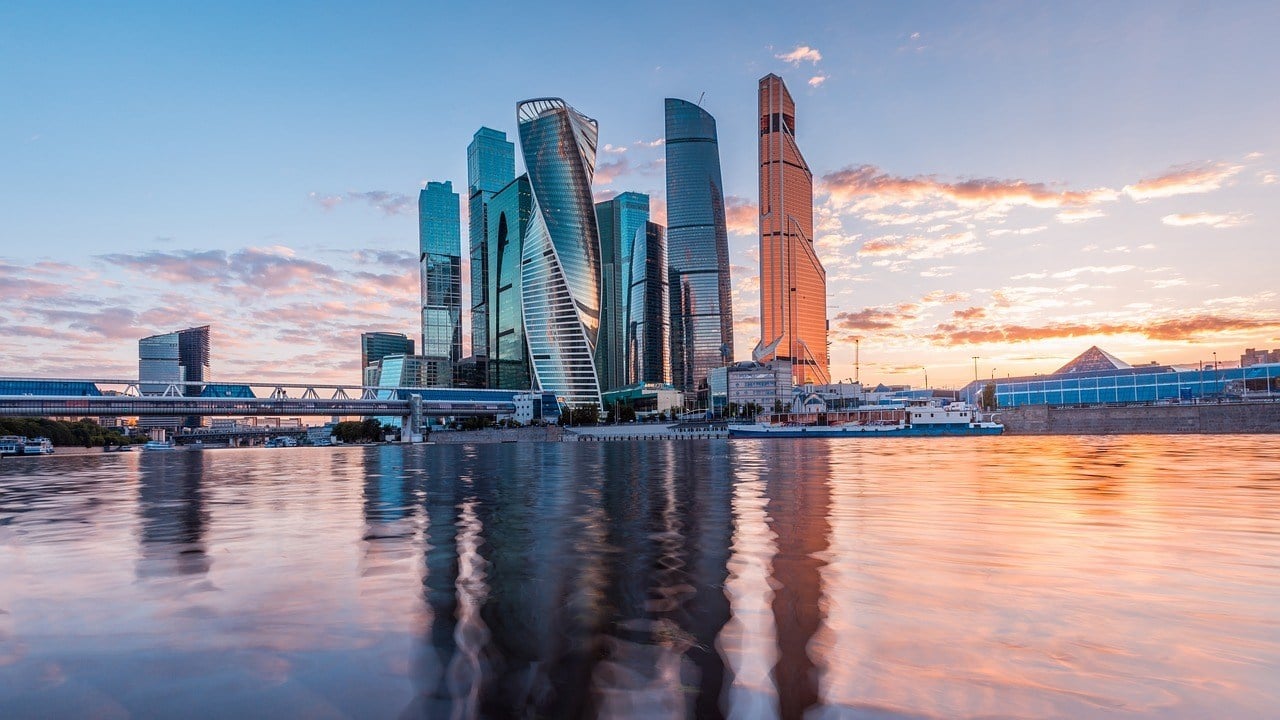
If you prefer above-ground transportation, buses, trams, and trolleybuses, run throughout the city and provide a rather comfortable alternative to the metro.
Moscow’s metro, buses, trams, and trolleybuses are all accessible with a ‘Troika’ card. This card can be topped up with any sum of money at a metro cash desk. The ticket is simple, convenient, and even refundable upon return to a cashier!
No matter which method you choose, you’ll never find yourself without an easy means of getting from point A to point B!
Red Square | Moscow Kremlin | Lenin’s Mausoleum | St. Basil’s Cathedral | GUM Department Store
Spend the first day of your itinerary taking your own self guided Moscow walking tour around the historic Red Square! This is Moscow’s compact city center and every stop on this list is within easy walking distance to the next! Get ready to see all of the top Moscow landmarks!
Day 1 / Stop 1 – The Red Square
- Why it’s awesome: The Red Square is the most recognizable area in Moscow, it has mesmerizing architecture and centuries worth of history attached to its name.
- Cost: Free to walk around, individual attractions in the square have separate fees.
- Food nearby: Check out Bar BQ Cafe for friendly service and good food in a great location! The atmosphere is upbeat and they’re open 24/7!
The Red Square is Moscow’s historic fortress and the center of the Russian government. The origins of the square date back to the late 15th century, when Ivan the Great decided to expand the Kremlin to reflect Moscow’s growing power and prestige!
During the 20th century, the square became famous as the site for demonstrations designed to showcase Soviet strength. Visiting the Red Square today, you’ll find it teeming with tourists, who come to witness its magical architecture up close!
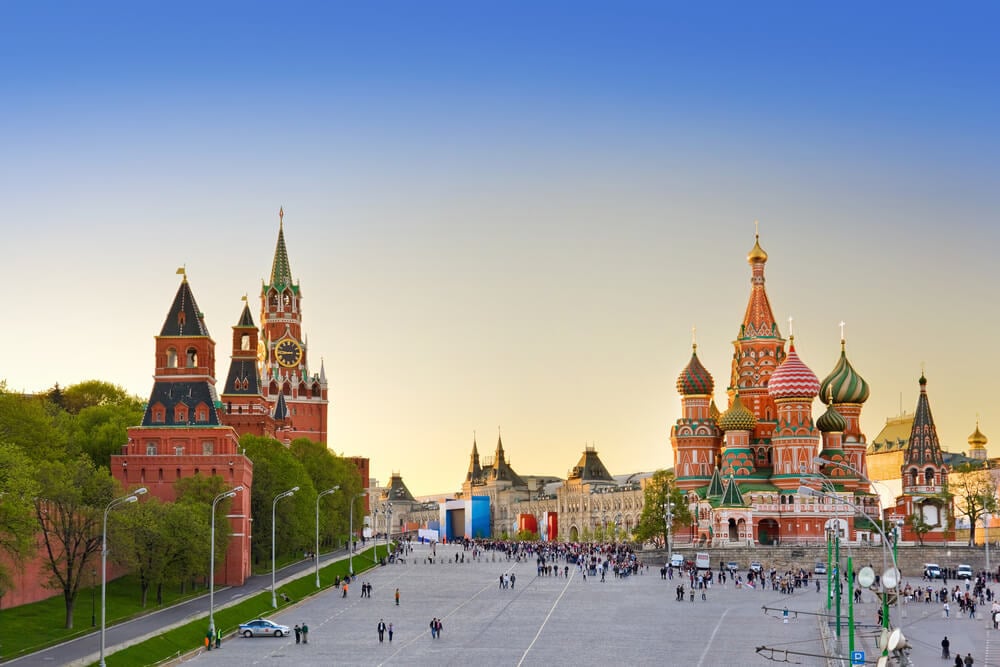
The square is the picture postcard of Russian tourism, so make sure to bring your camera when you visit! No matter the season, or the time of day, it’s delightfully photogenic!
It’s also home to some of Russia’s most distinguishing and important landmarks, which we’ve made sure to include further down in this itinerary. It’s an important center of Russia’s cultural life and one of the top places to visit in Moscow!
In 1990, UNESCO designated Russia’s Red Square as a World Heritage site. Visiting this historic site is a true bucket-list event and essential addition to your itinerary for Moscow!
Day 1 / Stop 2 – The Moscow Kremlin
- Why it’s awesome: The Moscow Kremlin complex includes several palaces and cathedrals and is surrounded by the Kremlin wall. It also houses the principal museum of Russia (the Kremlin Armory).
- Cost: USD $15.00
- Food nearby: Bosco Cafe is a charming place to grat a casual bite to eat. They have excellent coffee and wonderful views of the Red Square and the Moscow Kremlin!
The iconic Moscow Kremlin , also known as the Kremlin museum complex, sits on Borovitsky Hill, rising above the Moscow River. It is a fortified complex in the center of the city, overlooking several iconic buildings in the Red Square!
It’s the best known of the Russian Kremlins – citadels or fortress’ protecting and dominating a city. During the early decades of the Soviet era, the Kremlin was a private enclave where the state’s governing elite lived and worked.
The Kremlin is outlined by an irregularly shaped triangular wall that encloses an area of 68 acres! The existing walls and towers were built from 1485 to 1495. Inside the Kremlin museum complex, there are five palaces, four cathedrals, and the enclosing Kremlin Wall with Kremlin towers.
The Armoury Chamber is a part of the Grand Kremlin Palace’s complex and is one of the oldest museums of Moscow, established in 1851. It showcases Russian history and displays many cherished relics. Definitely make sure to check out this museum while you’re here!
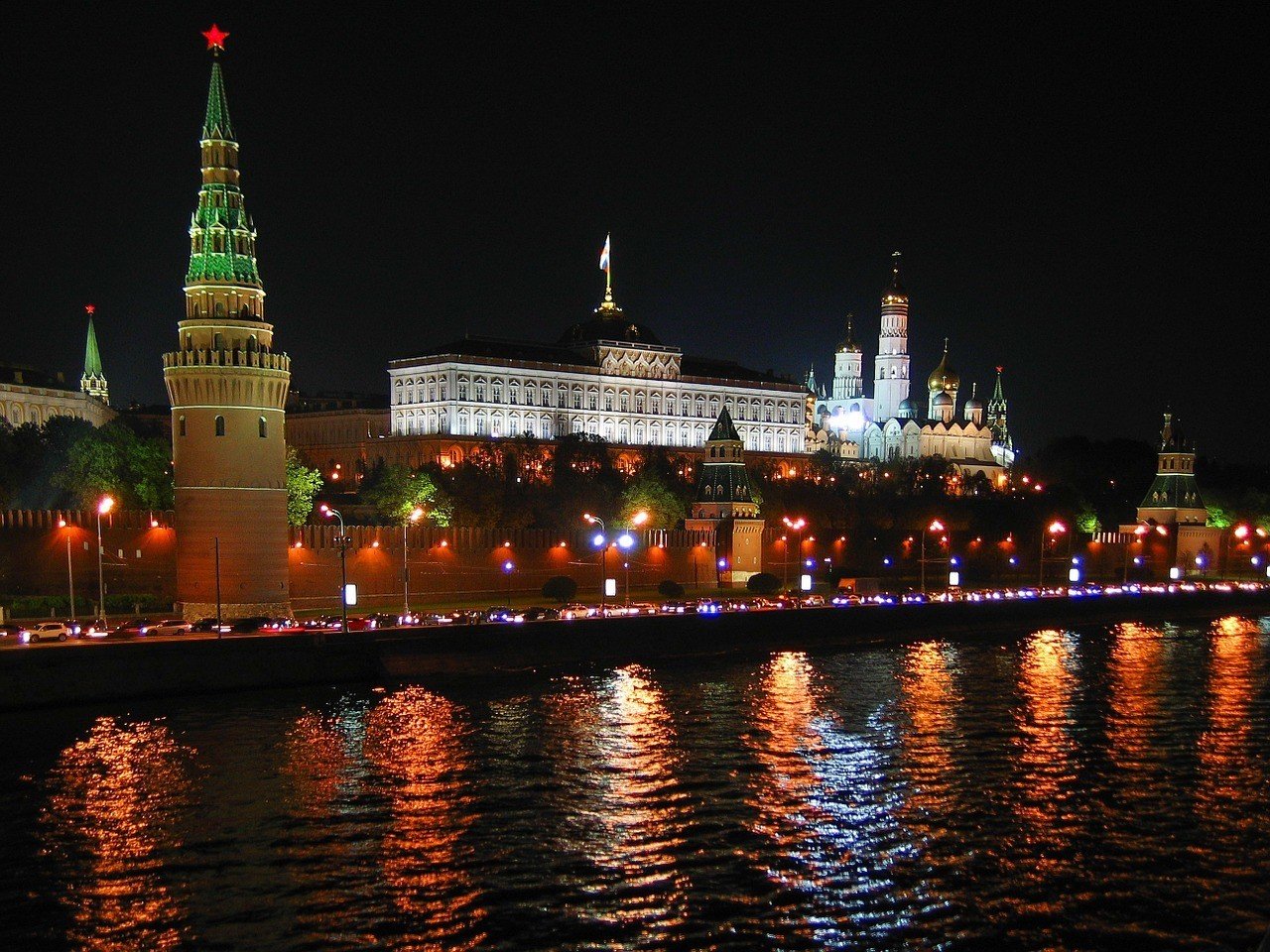
The churches inside the Moscow Kremlin are the Cathedral of the Dormition, Church of the Archangel, Church of the Annunciation, and the bell tower of Ivan Veliki (a church tower).
The five-domed Cathedral of the Dormition is considered the most famous. It was built from 1475–1479 by an Italian architect and has served as a wedding and coronation place for great princes, tsars, and emperors of Russia. Church services are given in the Kremlin’s numerous cathedrals on a regular basis.
The Grand Kremlin Palace was the former Tsar’s Moscow residence and today it serves as the official workplace of the President of the Russian Federation (Vladimir Putin seems to have bagged that title for life) .
Insider Tip: The Kremlin is closed every Thursday! Make sure to plan this stop on your Moscow itinerary for any other day of the week!
Day 1 / Stop 3 – Lenin’s Mausoleum
- Why it’s awesome: The mausoleum displays the preserved body of Soviet leader Vladimir Lenin .
- Cost: Free!
- Food nearby: Khinkal’naya is a charming Georgian restaurant with vaulted ceilings and exposed brick. It’s a popular place with locals and right next to the Red Square!
Lenin’s Mausoleum, also known as Lenin’s Tomb, is the modernist mausoleum for the revolutionary leader Vladimir Lenin. It’s located within the Red Square and serves as the resting place for the Soviet leader! His preserved body has been on public display since shortly after his death in 1924.
It’s located just a few steps away from the Kremlin Wall and is one of the most controversial yet popular Moscow attractions!
Admission is free for everyone, you’ll only need to pay if you need to check a bag. Before visitors are allowed to enter the mausoleum, they have to go through a metal detector first. No metal objects, liquids, or large bags are allowed in the mausoleum!
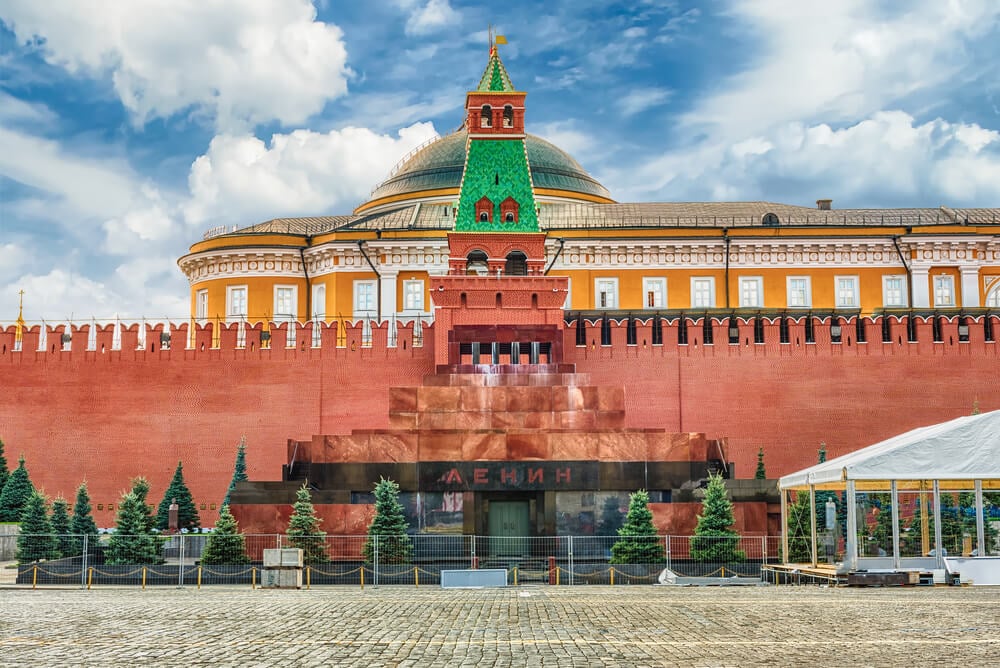
Expect a line to enter the building, and while you’re inside the building, you’ll be constantly moving in line with other visitors. This means you won’t be able to spend as long as you’d like viewing the mausoleum, but you’ll still be able to get a good look. Pictures and filming while inside the building are strictly prohibited, and security guards will stop you if they see you breaking this rule.
The mausoleum is only open on Tuesday, Wednesday, Thursday, and Saturday – unless it’s a public holiday or a day scheduled for maintenance. The hours it’s open for each day are limited, make sure to check online before you visit to make sure you can fit this into your Moscow itinerary for that day!
Insider Tip: The Lenin’s Museum is there for people to pay their respect; remember to keep silent and move along quickly, it’s not intended for people to congregate around. Also, men are not allowed to wear hats and everyone must take their hands out of their pockets when inside the building.
Day 1 / Stop 4 – St. Basil’s Cathedral
- Why it’s awesome: A dazzling designed cathedral that showcases Russia’s unique architecture. This cathedral is one of the most recognizable symbols of the country!
- Cost: USD $8.00
- Food nearby: Moskovskiy Chaynyy Klub is a cozy cafe serving food items and pipping hot tea; it’s the perfect place to go if you’re visiting Moscow during the winter months!
Located in the Red Square, the ornate 16th-century St. Basil’s Cathedral is probably the building you picture when you think of Moscow’s unique architecture. Its colorful onion-shaped domes tower over the Moscow skyline!
The cathedral was built from 1555-1561 by order of Tsar Ivan the Terrible. It was designed with an iconic onion dome facade and enchanting colors that captivate all who see it. Fun fact: If you’re wondering why Russian churches have onion domes, they are popularly believed to symbolize burning candles!
This iconic cathedral has become a symbol of Russia due to its distinguishing architecture and prominent position inside the Red Square. It’s one of the most beautiful, wonderful, and mesmerizing historical cathedrals in the world!
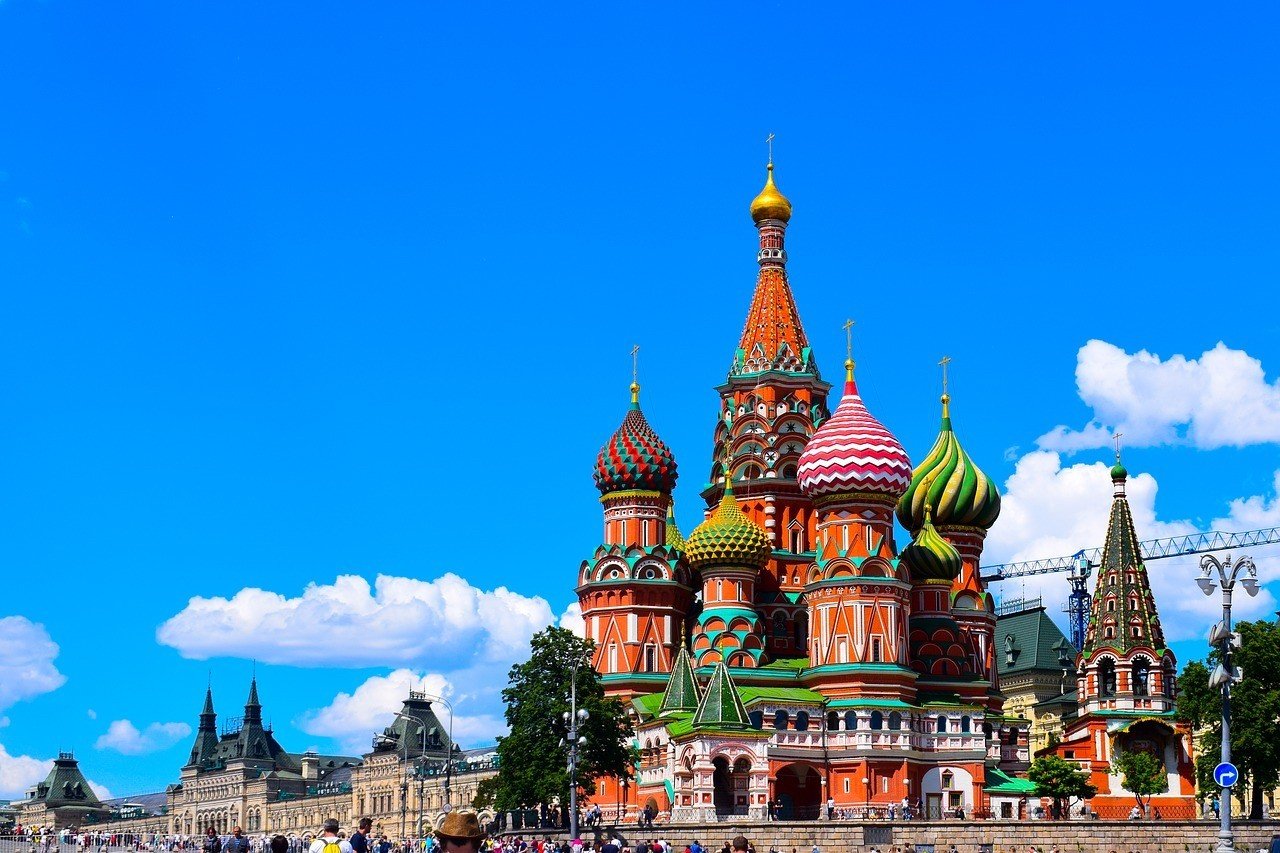
The interior of the church surprises most people when they visit. In contrast to the large exterior, the inside is not so much one large area, but rather a collection of smaller areas, with many corridors and small rooms. There are 9 small chapels and one mausoleum grouped around a central tower.
Visiting the inside is like walking through a maze, there are even small signs all around the cathedral tracing where to walk, and pointing you in the right direction! The walls are meticulously decorated and painted with intricate floral designs and religious themes.
The church rarely holds service and is instead a museum open for the public to visit.
Insider Tip: During the summer months the line to go inside the cathedral can get quite long! Make sure to arrive early or reserve your tickets online to guarantee quick access into the cathedral!
Day 1 / Stop 5 – GUM Department Store
- Why it’s awesome: This is Russia’s most famous shopping mall! It’s designed with elegant and opulent architecture and provides a real sense of nostalgia!
- Cost: Free to enter
- Food nearby: Stolovaya 57 is a cafeteria-style restaurant with a variety of inexpensive Russian cuisine menu items including soups, salads, meat dishes, and desserts. It’s also located inside the GUM department store, making it very easily accessible when you’re shopping!
The enormous GUM Department Store is located within the historic Red Square. It has a whimsical enchantment to it that sets it apart from your typical department store.
A massive domed glass ceiling lines the top of the building and fills the interior with natural sunlight. There are live plants and flowers placed throughout the mall that give the shopping complex a lively and cheerful feel! A playful fountain sits in the center, further adding to the malls inviting a sense of wonder and amusement!
The GUM department store opened on December 2, 1893. Today, it includes local and luxury stores, including Fendi, Louis Vuitton, Prada, and many more! There are numerous cafes, restaurants, and even a movie theater inside!
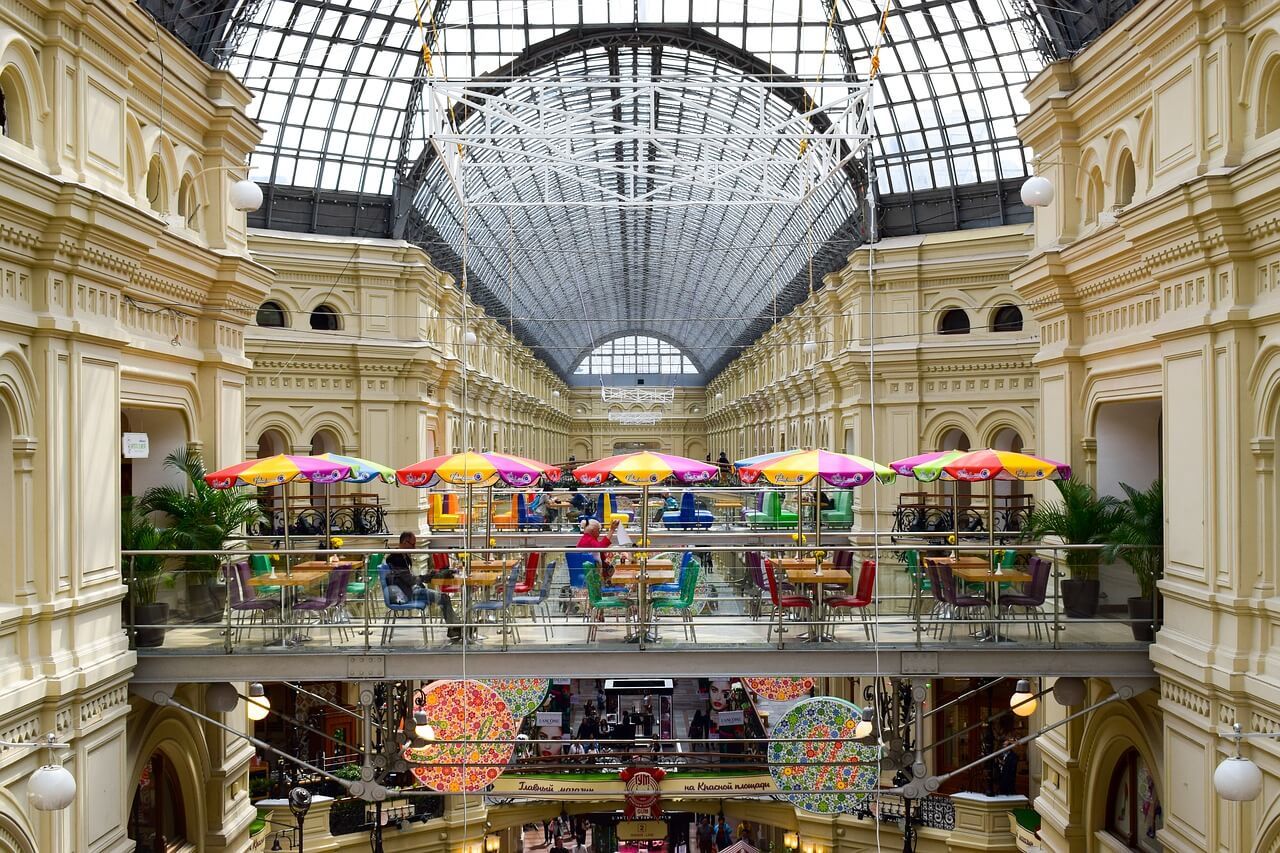
For a special treat, head into Gastronom 1. This 1950s-style shop sells gourmet food items, like wine, freshly-baked pastries, cheese, Russian chocolate, and of course, vodka! Also, be on the lookout for a bicycle pedaling ice cream truck with an employing selling ice cream!
The ambiance is simply amazing, a trip to this idyllic shopping mall is an absolute must on any Moscow itinerary!
Insider Tip: Make sure to carry some small change on you in case you need to use the restroom, you’ll need to pay 50 rubles – or about USD $0.80 to use the bathroom in GUM.

Wanna know how to pack like a pro? Well for a start you need the right gear….
These are packing cubes for the globetrotters and compression sacks for the real adventurers – these babies are a traveller’s best kept secret. They organise yo’ packing and minimise volume too so you can pack MORE.
Or, y’know… you can stick to just chucking it all in your backpack…
Novodevichy Convent | Gorky Park | State Tretyakov Gallery | All-Russian Exhibition Center | Bolshoi Theater
On your 2 day itinerary in Moscow, you’ll have a chance to use the city’s excellent public transportation service! You’ll explore a few more of Moscow’s historic highlight as well as some modern attractions. These sites are a little more spread out, but still very easily accessible thanks to the metro!
Day 2 / Stop 1 – Novodevichy Convent
- Why it’s awesome: The Novodevichy Convent is rich in imperial Russian history and contains some of Russia’s best examples of classical architecture!
- Cost: USD $5.00
- Food nearby: Culinary Shop Karavaevs Brothers is a cozy and simple place to have a quick bite, they also have vegetarian options!
The Novodevichy Convent is the best-known and most popular cloister of Moscow. The convent complex is contained within high walls, and there are many attractions this site is known for!
The six-pillared five-domed Smolensk Cathedral is the main attraction. It was built to resemble the Kremlin’s Assumption Cathedral and its facade boasts beautiful snowy white walls and a pristine golden onion dome as its centerpiece. It’s the oldest structure in the convent, built from 1524 -1525, and is situated in the center of the complex between the two entrance gates.
There are other churches inside the convent as well, all dating back from many centuries past. The convent is filled with an abundance of 16th and 17th-century religious artworks, including numerous large and extravagant frescos!
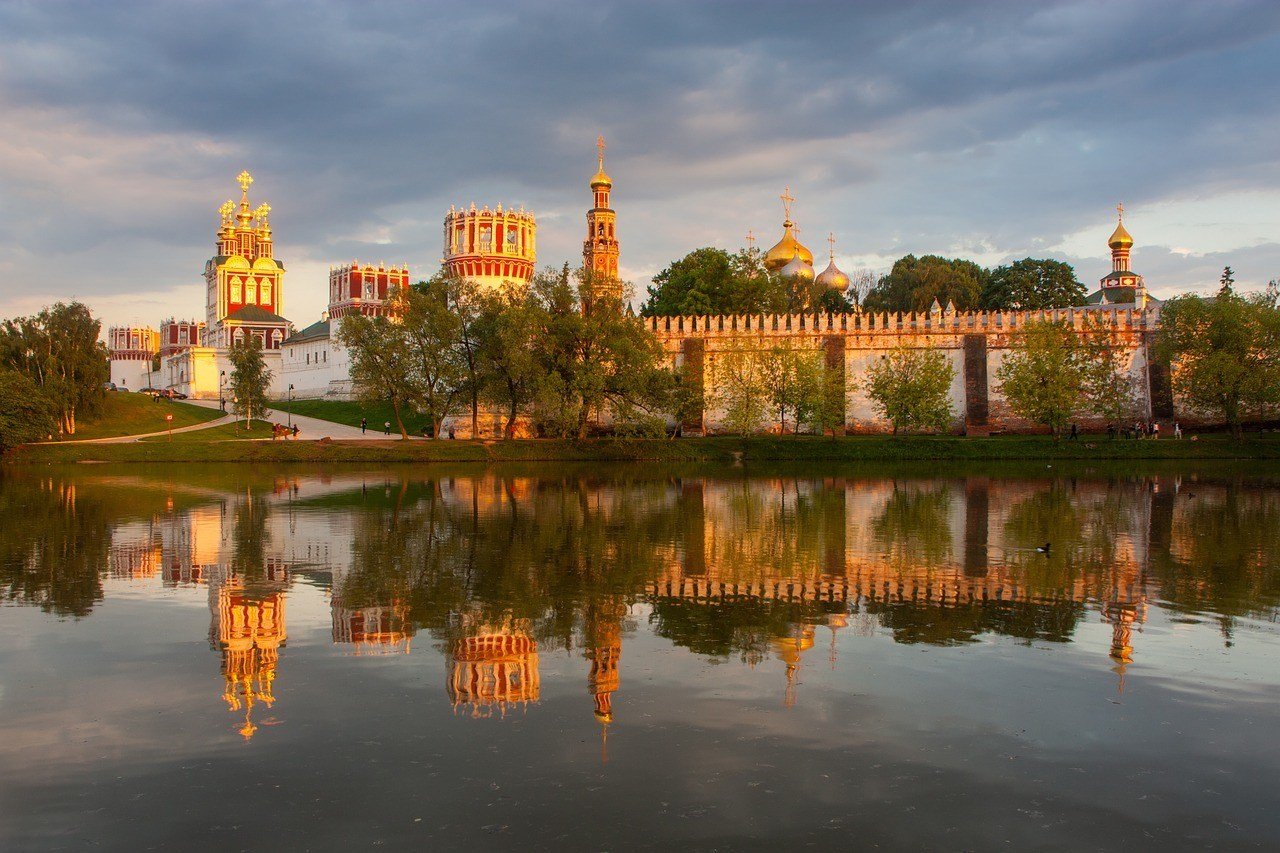
Just outside the convent’s grounds lies the Novodevichy Cemetery. Here, you can visit the graves of famous Russians, including esteemed authors, composers, and politicians. Probably the most intriguing gravestone belongs to Russian politician Nikita Khruschev!
The Novodevichy Convent is located near the Moscow River and offers a peaceful retreat from the busy city. In 2004, it was proclaimed a UNESCO World Heritage Site. The convent remains remarkably well-preserved and is an outstanding example of Moscow Baroque architecture!
Insider Tip: To enter the cathedrals inside the complex, women are advised to cover their heads and shoulders, while men should wear long pants.
Day 2 / Stop 2 – Gorky Central Park of Culture and Leisure
- Why it’s awesome: A large amusement area in the heart of the city offering many attractions!
- Cost: Free!
- Food nearby: Check out Mepkato, located inside Gorky Central Park for a casual meal in a cozy setting. There are indoor and outdoor seating options and the restaurant is child-friendly!
Gorky Central Park of Culture and Leisure is a large green space in the heart of Moscow. The park opened in 1928, and it stretches along the scenic embankment of the Moskva River. It covers an area of 300-acres and offers a lovely contrast from the compact city center.
You’ll find all sorts of wonderful attractions, from boat rides to bike rentals to tennis courts and ping-pong tables, and much more! there are an open-air cinema and festive events and concerts scheduled in the summer months. A wide selection of free fitness classes is also offered on a regular basis, including jogging, roller skating, and dancing!
Although many of the options you’ll find here are more suited for outdoor leisure during the summer, you’ll also a selection of winter attractions, including one of Europe’s largest ice rinks for ice-skating!
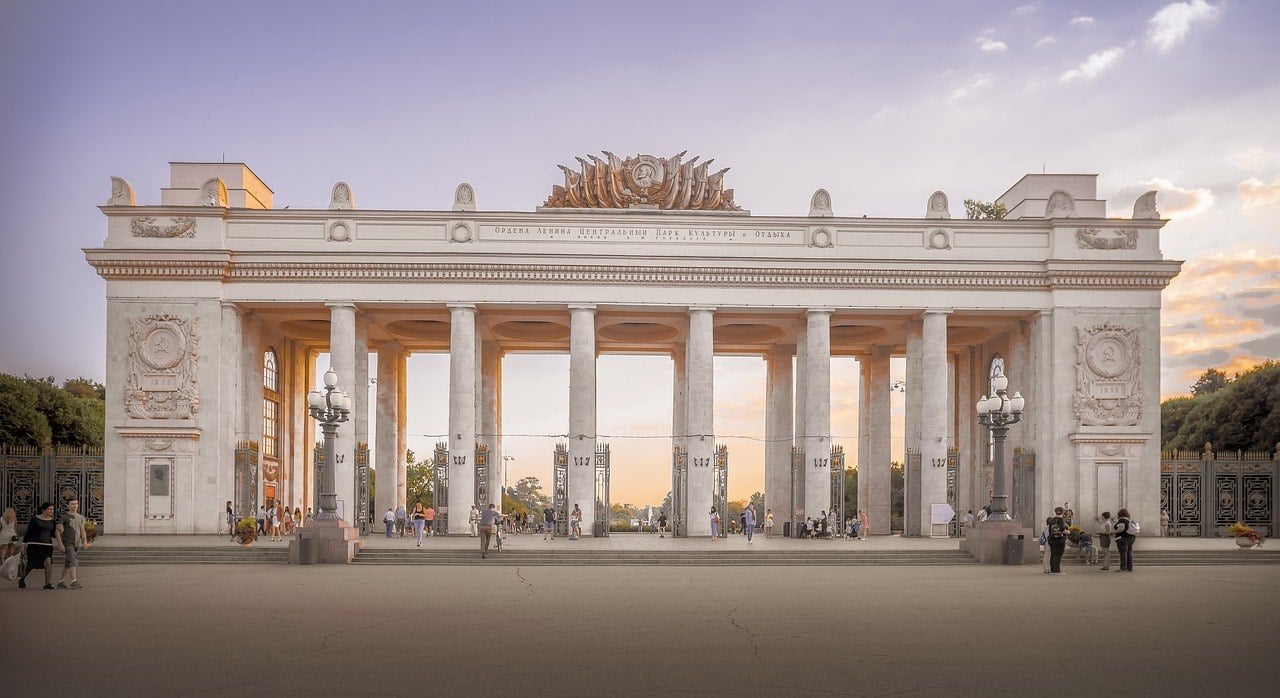
If you’re trying to decide what to do in Moscow with kids, the park also offers several venues designed specifically for kids. Check out the year-round Green School which offers hands-on classes in gardening and art! You can also feed the squirrels and birds at the Golitsinsky Ponds!
The park is very well maintained and kept clean and the entrance is free of charge, although most individual attractions cost money. There is also Wi-Fi available throughout the park.
With so many attractions, you could easily spend all day here! If you’re only planning a 2 day itinerary in Moscow, make sure to plan your time accordingly and map out all the areas you want to see beforehand!
Day 2 / Stop 3 – The State Tretyakov Gallery
- Why it’s awesome: The gallery’s collection consists entirely of Russian art made by Russian artists!
- Food nearby : Brothers Tretyakovs is located right across the street from the gallery. It’s a wonderfully atmospheric restaurant serving top quality food and drinks!
The State Tretyakov Gallery was founded in 1856 by influential merchant and collector Pavel Tretyakov. The gallery is a national treasury of Russian fine art and one of the most important museums in Russia!
It houses the world’s best collection of Russian art and contains more than 130, 000 paintings, sculptures, and graphics! These works have been created throughout the centuries by generations of Russia’s most talented artists!
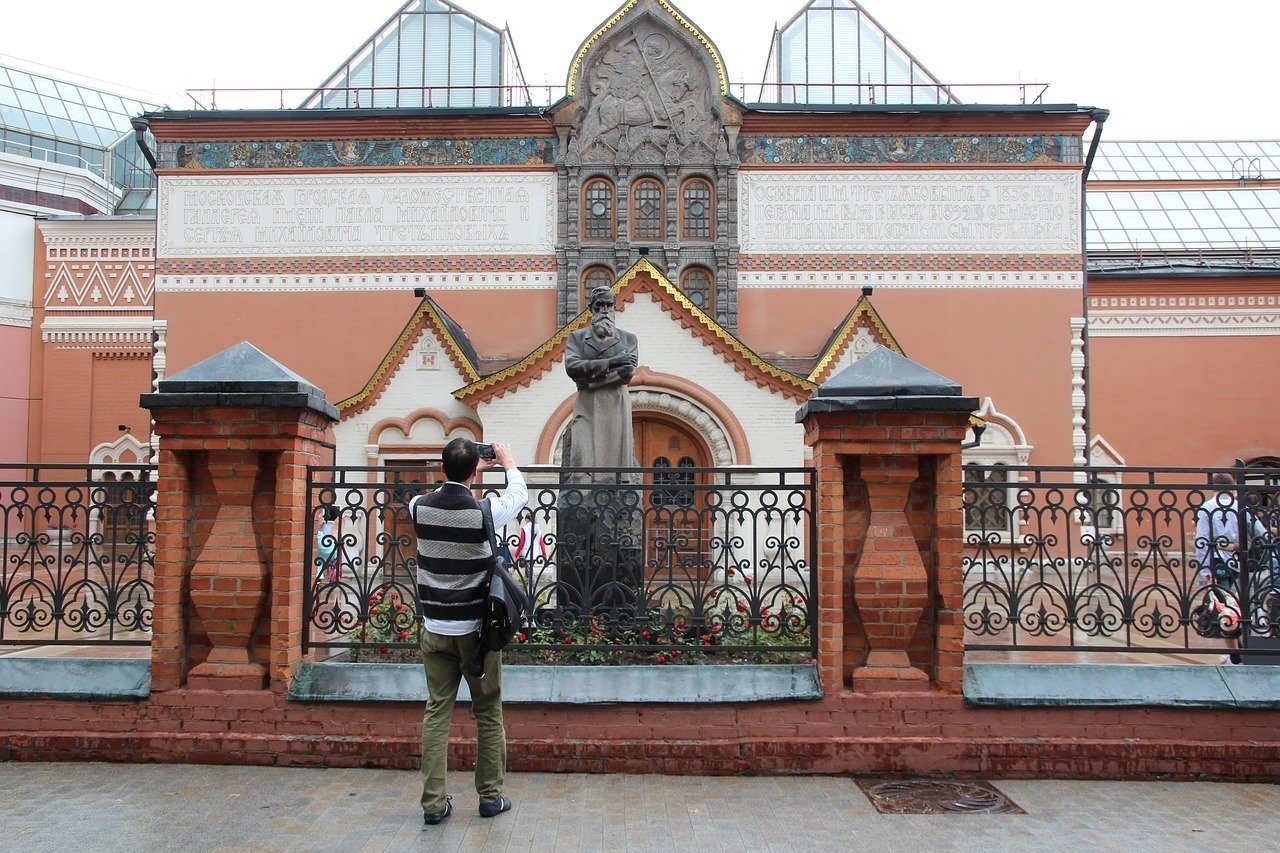
The exhibits range from mysterious 12th-century images to politically charged canvases. The collection is rich and revealing and offers great insight into the history and attitudes of this long-suffering yet inspired people!
All pictures are also labeled in English. If you plan to take your time and see everything inside the museum it will take a good 3-4 hours, so make sure to plan your Moscow trip itinerary accordingly! This gallery is a must-see stop for art lovers, or anyone wanting to explore the local culture and history of Russia in a creative and insightful manner!
Insider Tip: When planning your 2 days in Moscow itinerary, keep in mind that most museums in Moscow are closed on Mondays, this includes The State Tretyakov Gallery!
Day 2 / Stop 4 – All-Russian Exhibition Center
- Why it’s awesome: This large exhibition center showcases the achievements of the Soviet Union in several different spheres.
- Food nearby: Varenichnaya No. 1 serves authentic and homestyle Russian cuisine in an intimate and casual setting.
The All-Russian Exhibition Center is a massive park that presents the glory of the Soviet era! It pays homage to the achievements of Soviet Russia with its many different sites found on the property.
The center was officially opened in 1939 to exhibit the achievements of the Soviet Union. It’s a huge complex of buildings and the largest exhibition center in Moscow. There are several exhibition halls dedicated to different achievements and every year there are more than one hundred and fifty specialized exhibitions!
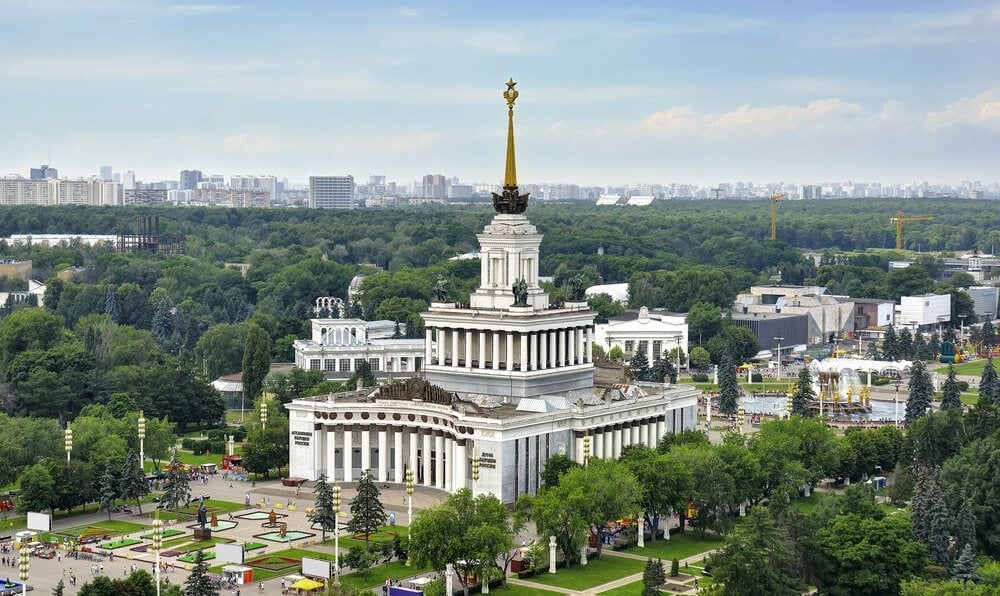
The Peoples Friendship Fountain was constructed in 1954 and is a highlight of the park. The stunning gold fountain features 16 gilded statues of girls, each representing the former Soviet Union republics.
The Stone Flower Fountain was also built in 1954 and is worth checking out. The centerpiece of this large fountain is a flower carved from stones from the Ural Mountains! Along the side of the fountain are various bronze sculptures.
You will find many people zipping around on rollerblades and bicycles across the large area that the venue covers. It’s also home to amusement rides and carousels, making it the perfect place to stop with kids on your Moscow itinerary! Make sure to wear comfortable shoes and allow a few hours to explore all the areas that interest you!
Day 2 / Stop 5 – Bolshoi Theater
- Why it’s awesome: The Bolshoi Theater is a historic venue that hosts world-class ballet and opera performances!
- Cost: Prices vary largely between USD $2.00 – USD $228.00 based on seat location.
- Food nearby: Head to the Russian restaurant, Bolshoi for high-quality food and drinks and excellent service!
The Bolshoi Theater is among the oldest and most renowned ballet and opera companies in the world! It also boasts the world’s biggest ballet company, with more than 200 dancers!
The theater has been rebuilt and renovated several times during its long history. In 2011 it finished its most recent renovation after an extensive six-year restoration that started in 2005. The renovation included an improvement in acoustics and the restoration of the original Imperial decor.
The Bolshoi Theater has put on many of the world’s most famous ballet acts! Tchaikovsky’s ballet Swan Lake premiered at the theater in 1877 and other notable performances of the Bolshoi repertoire include Tchaikovsky’s The Sleeping Beauty and The Nutcracker!
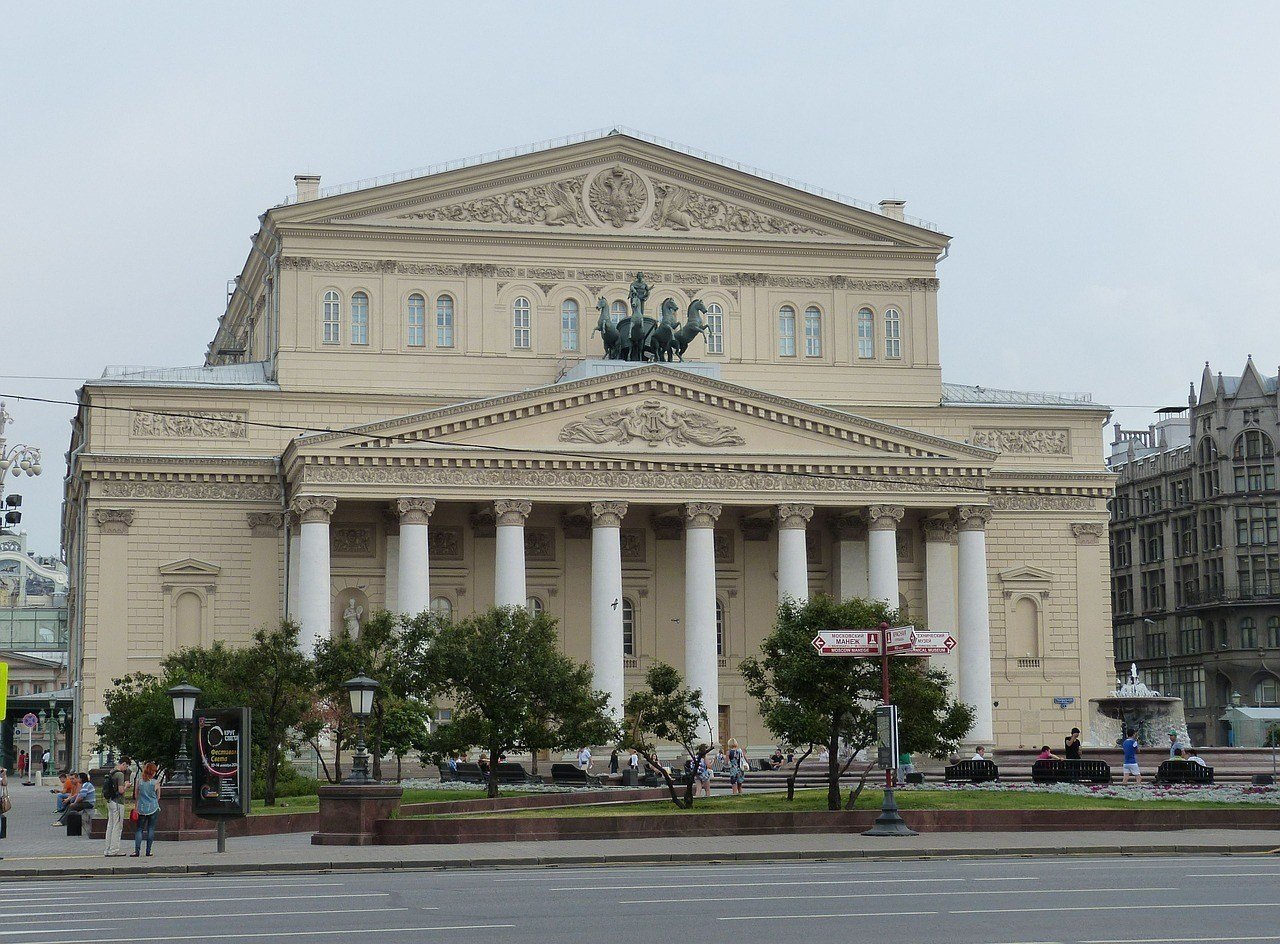
Today, when you visit the theater, you can expect a magical performance from skilled singers, dancers, and musicians with the highest level of technique!
If you don’t have time to see a show, the theater also provides guided tours on select days of the week. Tours are given in both Russian and English and will provide visitors with a more intimate look at the different areas of the theater!
The stage of this iconic Russian theater has seen many outstanding performances. If you’re a fan of the performing arts, the Bolshoi Theater is one of the greatest and oldest ballet and opera companies in the world, making it a must-see attraction on your Moscow itinerary!

Godzillas Hostel
Godzillas Hostel is located in the center of Moscow, just a short walk from all the major tourist attractions and the metro station.
- Towels Included
Cosmonautics Museum | Alexander Garden | Ostankino Tower | Izmaylovo District | Soviet Arcade Museum
Now that we’ve covered what to do in Moscow in 2 days, if you’re able to spend more time in the city you’re going to need more attractions to fill your time. Here are a few more really cool things to do in Moscow we recommend!
Memorial Museum of Cosmonautics
- Hear the timeline of the ‘space race’ from the Russian perspective
- This museum is fun for both adults and children!
- Admission is USD $4.00
The Memorial Museum of Cosmonautics is a museum dedicated to space exploration! The museum explores the history of flight, astronomy, space exploration, space technology, and space in the arts. It houses a large assortment of Soviet and Russian space-related exhibits, and the museum’s collection holds approximately 85,000 different items!
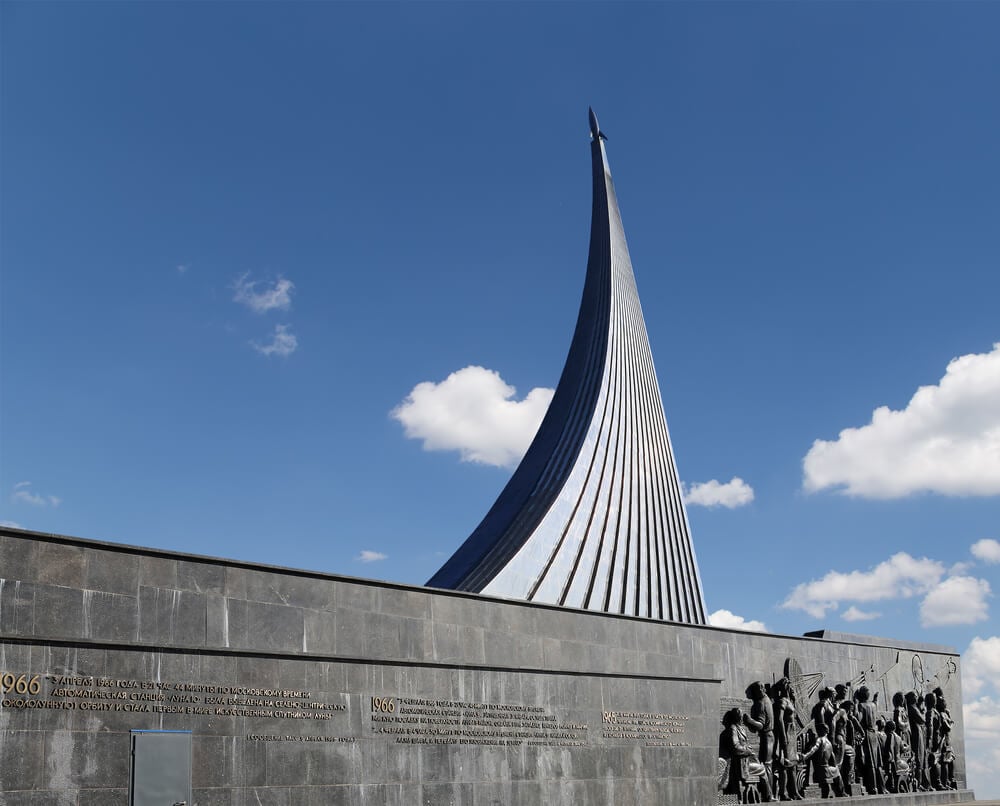
The museum does an excellent job of telling the full story of the exciting space race between the USSR and the US! It highlights the brightest moments in Russian history and humanity and is very interesting and fun for all ages!
If you’re a fan of space or just curious about gaining insight into Russia’s fascinating history of space exploration, make sure to add this to your 3 day itinerary in Moscow!
The Alexander Garden
- A tranquil place to relax near the Red Square
- Green lawns dotted with sculptures and lovely water features
- The park is open every day and has no entrance fee
The Alexander Garden was one of the first urban public parks in Moscow! The garden premiered in 1821 and was built to celebrate Russia’s victory over Napoleon’s forces in 1812!
The park is beautiful and well maintained with paths to walk on and benches to rest on. The park contains three separate gardens: the upper garden, middle garden, and lower garden.
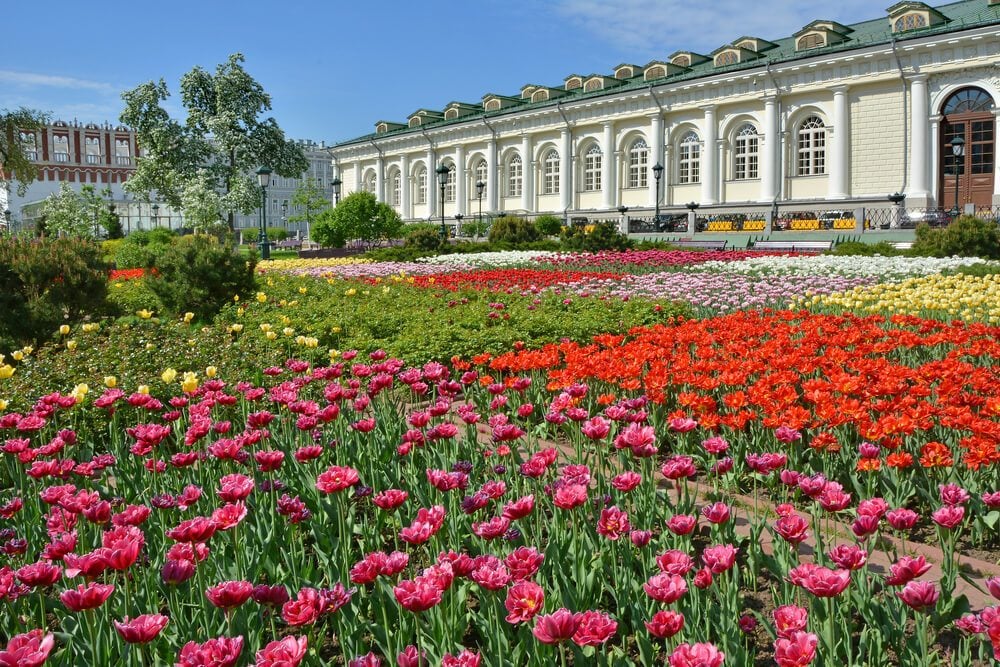
Located in the upper garden, towards the main entrance to the park is the Tomb of the Unknown Soldier with its eternal flame. This monument was created in 1967 and contains the body of a soldier who fell during the Great Patriotic War!
The park stretches along all the length of the western Kremlin wall for about half a mile. Due to its central location in the city, it’ll be easily accessible when you’re out exploring The Red Square.
It provides a bit of relief from the city’s high-energy city streets. Bring a picnic lunch, go for a walk, or just sit and people watch, this is one of the best Moscow sites to wind-down and relax!
Ostankino Television Tower
- Television and radio tower in Moscow
- Currently the tallest free-standing structure in Europe
- Make sure you bring your passport when you visit, you can’t go up without it!
For spectacular views of the city, make sure to add the Ostankino Television Tower to your itinerary for Moscow! This impressive free-standing structure provides stunning views of the city in every direction. The glass floor at the top also provides great alternative views of the city!
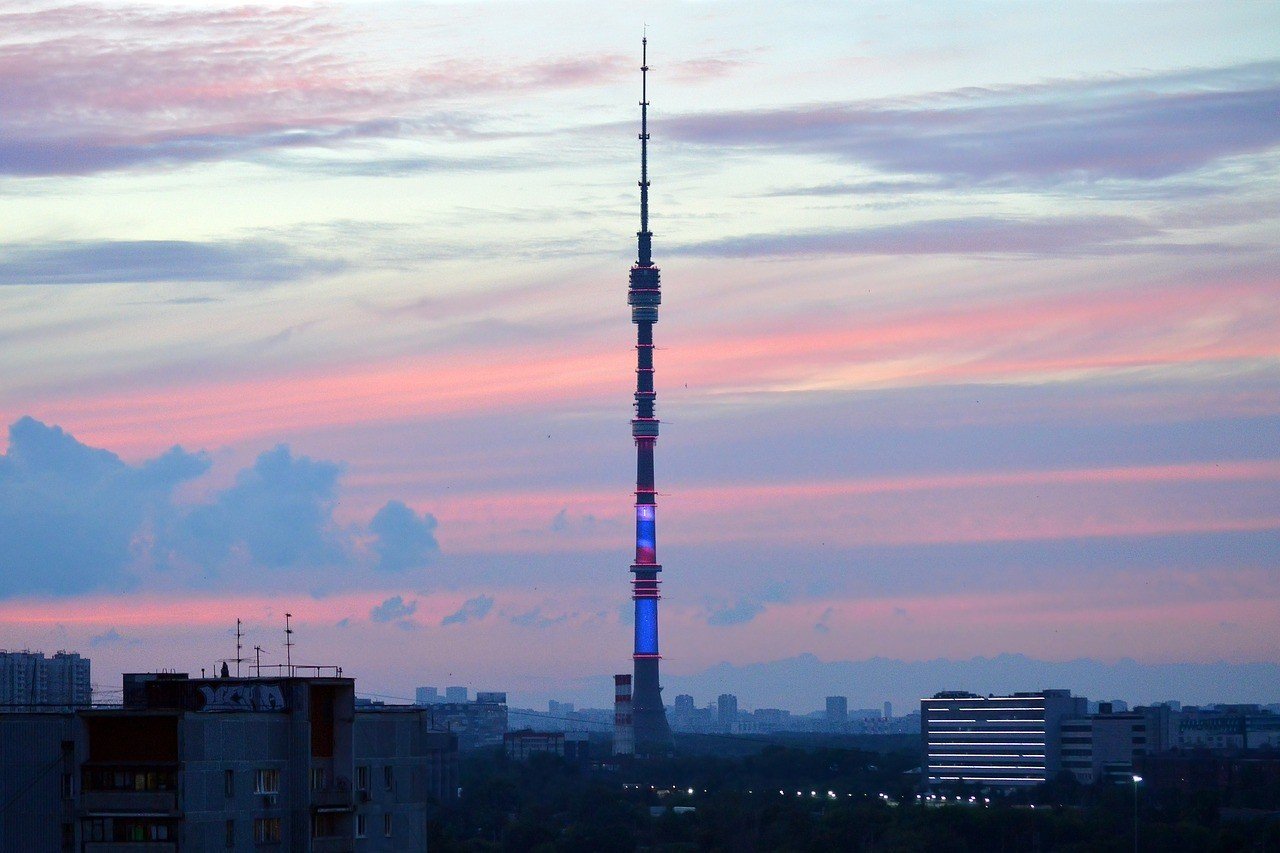
It takes just 58 seconds for visitors to reach the Tower’s observation deck by super fast elevator. The tower is open every day for long hours and is a great site in Moscow to check out! There is even a restaurant at the top where you can enjoy rotating views of the city while you dine on traditional Russian cuisine or European cuisine!
The tower is somewhat of an architectural surprise in a city that is not known for skyscrapers! To see the city from a new perspective, make sure to add this stop to your Moscow itinerary!
Izmaylovo District
- The most popular attractions in this district are the kremlin and the flea market
- Outside of the city center and easy to reach via metro
- Most popular during the summer and on weekends
Travel outside the city center and discover a unique area of the city! The Izmaylovo District is a popular destination for locals and tourists alike, and one of the coolest places to see in Moscow! The two main attractions we recommend checking out are the Kremlin and the flea market.
The Izmailovo Kremlin was established as a cultural center and molded after traditional Russian architecture. This colorful complex is home to several single-subject museums, including a Russian folk art museum and a vodka museum!
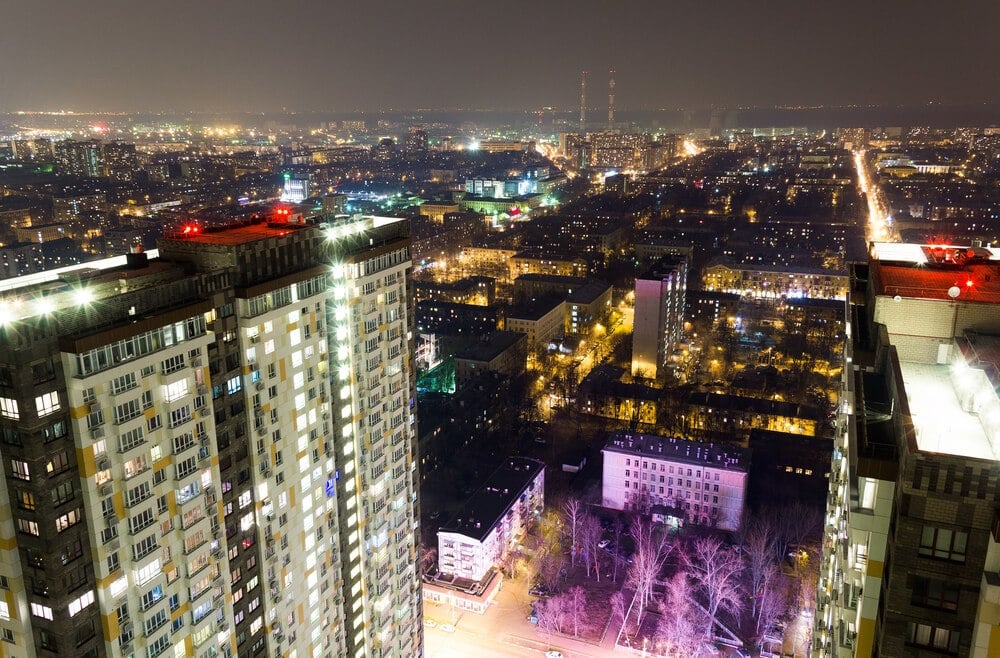
Next to the Kremlin is the Izmailovo open-air market, which dates back to the 17th century! The market is connected to the Izmailovo Kremlin by a wooden bridge. Pick up all your Russian souvenirs here, including traditional handicrafts, paintings, books, retro toys, and Soviet memorabilia!
You will find many hand-made and hand-painted options available at higher prices, as well as mass-produced souvenir options at lower prices!
Museum of Soviet Arcade Games
- Closed on Mondays
- Filled with old arcade games that visitors get to try out!
- The museum also includes a small cafe and burger shop
For something a little different, check out the Museum of Soviet Arcade Games! The museum features roughly 60 machines from the Soviet era, including video games, pinball machines, and collaborative hockey foosball! The machines inside the museum were produced in the USSR in the mid-1970s.
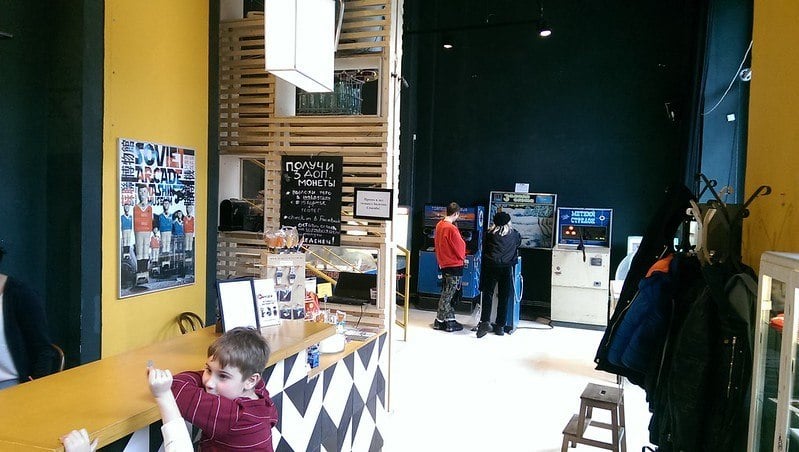
The best part is, most of the games are still playable! Purchase tickets and try the games out for yourself! The museum also has a neat little screening room that plays old Soviet cartoons and an area with Soviet magazines! This unique attraction is a fun addition to a 3 day itinerary in Moscow, and an attraction that all ages will enjoy!
Whether you’re spending one day in Moscow, or more, safety is an important thing to keep in mind when traveling to a big city! Overall, Moscow is a very safe place to visit. However, it is always recommended that tourists take certain precautions when traveling to a new destination!
The police in Moscow is extremely effective at making the city a safe place to visit and do their best to patrol all of the top Moscow, Russia tourist attractions. However, tourists can still be a target for pickpockets and scammers.
Moscow has a huge flow of tourists, therefore there is a risk for pickpocketing. Simple precautions will help eliminate your chances of being robbed. Stay vigilant, keep your items close to you at all times, and don’t flash your valuables!
If you’re planning a solo Moscow itinerary, you should have no need to worry, as the city is also considered safe for solo travelers, even women. Stay in the populated areas, try and not travel alone late at night, and never accept rides from strangers or taxis without a meter and correct signage.
The threat of natural disasters in Moscow is low, with the exception of severe winters when the temperature can dip below freezing! Bring a good, warm jacket if you visit in Winter.
However, please note that Russian views on homsexuality are far less accepting than those in Western Europe. Likewise, Non-Caucasian travellers may sadly encounter racism in Russia .
Don’t Forget Your Travel Insurance for Moscow
ALWAYS sort out your backpacker insurance before your trip. There’s plenty to choose from in that department, but a good place to start is Safety Wing .
They offer month-to-month payments, no lock-in contracts, and require absolutely no itineraries: that’s the exact kind of insurance long-term travellers and digital nomads need.

SafetyWing is cheap, easy, and admin-free: just sign up lickety-split so you can get back to it!
Click the button below to learn more about SafetyWing’s setup or read our insider review for the full tasty scoop.
Now that we’ve covered all the top things to see in Moscow, we thought we’d include some exciting day trips to other areas of the country!
Sergiev Posad (Golden Ring)
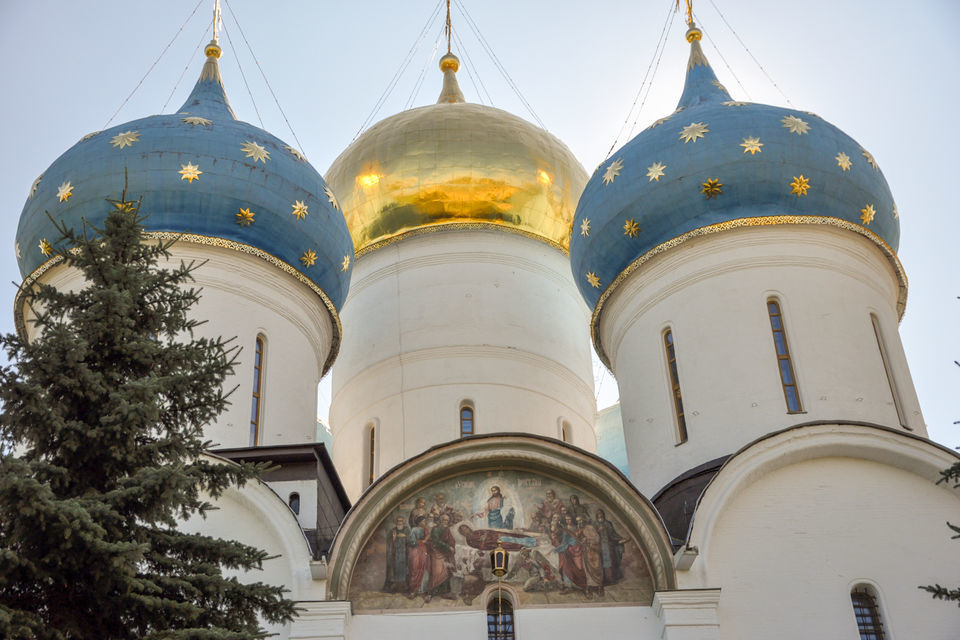
On this 7-hour guided tour, you’ll visit several scenic and historic areas of Russia. Start your day with hotel pick-up as you’re transferred by a comfortable car or minivan to Sergiev Posad. Admire the charming Russian countryside on your drive and enjoy a quick stop to visit the Russian village, Rudonezh!
You’ll see the majestic Saint Spring and the Church of Sergiev Radonezh. You’ll also visit the UNESCO World Heritage Site, Trinity Lavra of St. Sergius, one of the most famous Orthodox sites in Russia!
Lastly, you’ll swing by the local Matreshka market and enjoy a break in a nice Russian restaurant before returning to Moscow!
Day Trip to Vladimir and Suzdal
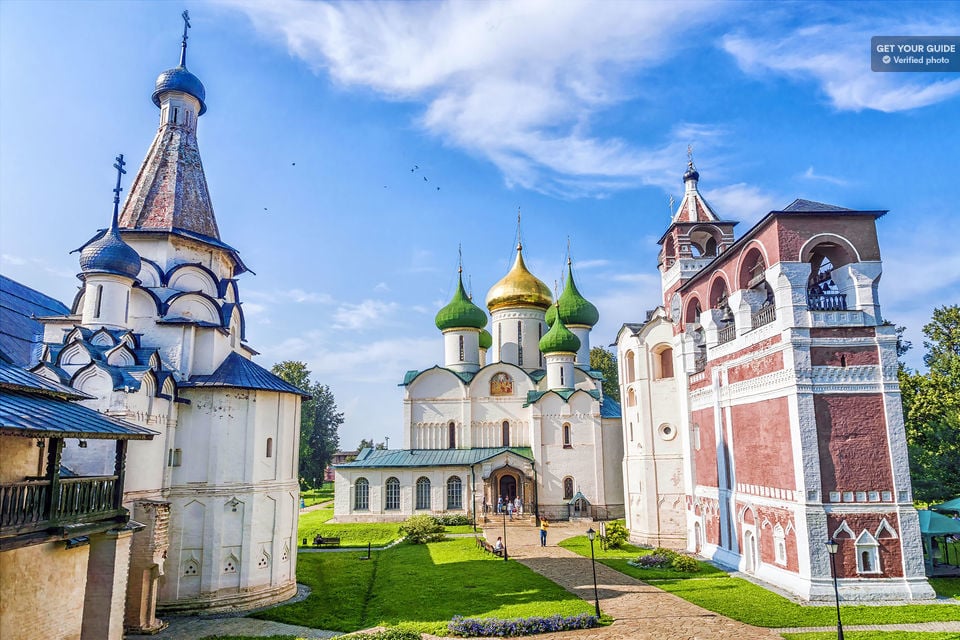
On this 13-hour trip, you’ll discover old Russia, with its picturesque landscapes and white-stoned beautiful churches! You’ll visit the main towns of the famous Golden Ring of Russia – the name for several cities and smaller towns north-east of Moscow.
Your first stop will be in the town of Vladimir, the ancient capital of all Russian principalities. The city dates back to the 11th century and is one of the oldest and the most important towns along the Ring! Next, you’ll visit Suzdal, a calm ancient Russian town north of Vladimir with only 13,000 inhabitants!
The old-style architecture and buildings of Suzdal are kept wonderfully intact. If you’re spending three days in Moscow, or more, this is a great option for exploring the charming areas outside the city!
Zvenigorod Day Trip and Russian Countryside
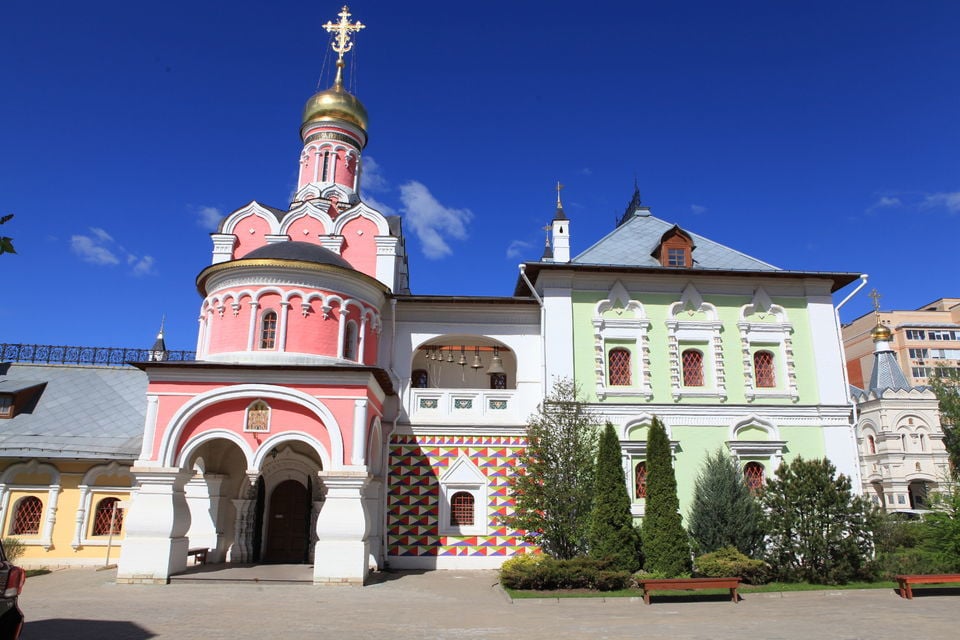
On this 9-hour private tour, you’ll explore the ancient town of Zvenigorod, one of the oldest towns in the Moscow region! As you leave Moscow you’ll enjoy the stunning scenery along the Moscow River, and make a few stops at old churches along the way to Zvenigorod.
Upon arrival, you’ll explore the medieval center, including the 14th-century Savvino-Storozhevsky Monastery. Next, you’ll take a break for lunch (own expense) where you’ll have the chance to try out the Russian cuisine! Next, you’ll visit the Museum of Russian Dessert and sip on tea at a Russian tea ceremony.
The final stop of the day is at the Ershovo Estate, a gorgeous place to walk around and enjoy nature!
Day Trip to St Petersburg by Train visiting Hermitage & Faberge
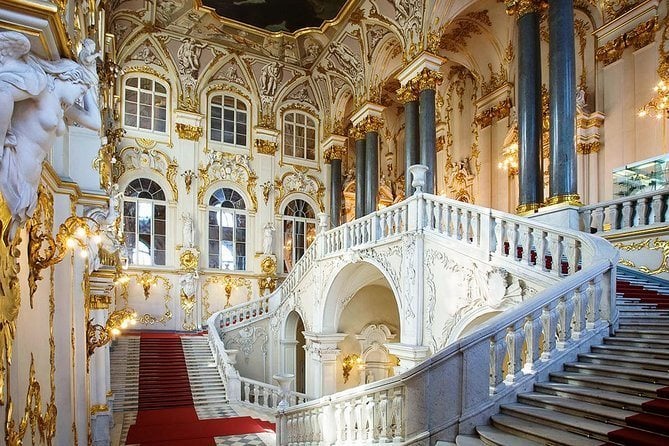
On this full-day tour, you’ll enjoy a a full round trip to St Petersburg where you’ll spend an exciting day exploring another popular Russian city! You’ll be picked up from your hotel in Moscow and be transferred to the train station where you’ll ride the high-speed train ‘Sapsan’ to St Petersburg.
Upon arrival, you’ll start the day by touring the Hermitage Museum and the Winter Palace. Next, you’ll visit the Faberge Museum, where you’ll explore the impressive collection of rare Faberge Eggs! In the afternoon, enjoy a sightseeing boat ride and a traditional 3-course Russian lunch.
If you’re spending 3 days in Moscow, or more, this is an excellent trip to take!
Trip to Kolomna – Authentic Cultural Experience from Moscow
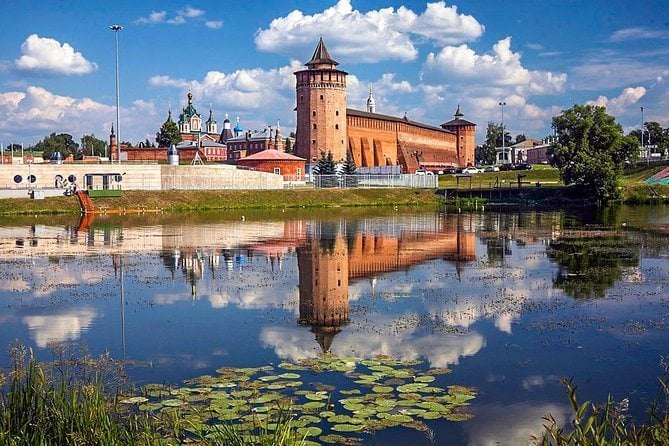
On this 10-hour tour, you’ll escape the city and travel to the historic town of Kolomna! First, you’ll visit the 14th-century Kolomna Kremlin, home to the Assumption Cathedral and an abundance of museums!
Next, enjoy lunch at a local cafe (own expense) before embarking on a tour of the Marshmallow Museum – of course, a marshmallow tasting is provided! Your final stop is the Museum of Forging Settlements, where displays include armor and accessories for fishing and hunting.
Discover this beautiful Russian fairytale city on a private trip, where all of the planning is taken care of for you!

Stash your cash safely with this money belt. It will keep your valuables safely concealed, no matter where you go.
It looks exactly like a normal belt except for a SECRET interior pocket perfectly designed to hide a wad of cash, a passport photocopy or anything else you may wish to hide. Never get caught with your pants down again! (Unless you want to…)
Find out what people want to know when planning their Moscow itinerary.
How many days you need in Moscow?
We recommend that you spend at least two or three days in Moscow to take it all in.
What’s the best month to visit Moscow?
The best time to visit Moscow is over the spring, from March to May as temperatures are mild, crowds are thin and prices are reasonable.
What are some unusual things to do in Moscow?
I mean, queuing up to see an almost 100 year old corpse is pretty unsual! Check out Lenin’s Mausoleum if you fancy it!
What are some fun things to do in Moscow?
The Memorial Museum of Cosmonautics is a fun place to explore the famous space race from the perspective of the ‘other side’!
We hope you enjoyed our Moscow itinerary! We’ve made sure to cover all the Moscow must-sees as well as some unique attractions in the city! Our addition of insider tips, favorite food stops, and day trips from Moscow is an added bonus and will guarantee you make the most out of your exciting Russian vacation!
Immerse yourself in the modern and traditional Russian lifestyle! Get lost in museums, witness awe-inspiring architecture, and indulge in Russian cuisine! Spend the day strolling through all of the charming sites of Moscow, admiring the beautiful scenery and discovering the city’s fairytale-like enchantment!

And for transparency’s sake, please know that some of the links in our content are affiliate links . That means that if you book your accommodation, buy your gear, or sort your insurance through our link, we earn a small commission (at no extra cost to you). That said, we only link to the gear we trust and never recommend services we don’t believe are up to scratch. Again, thank you!
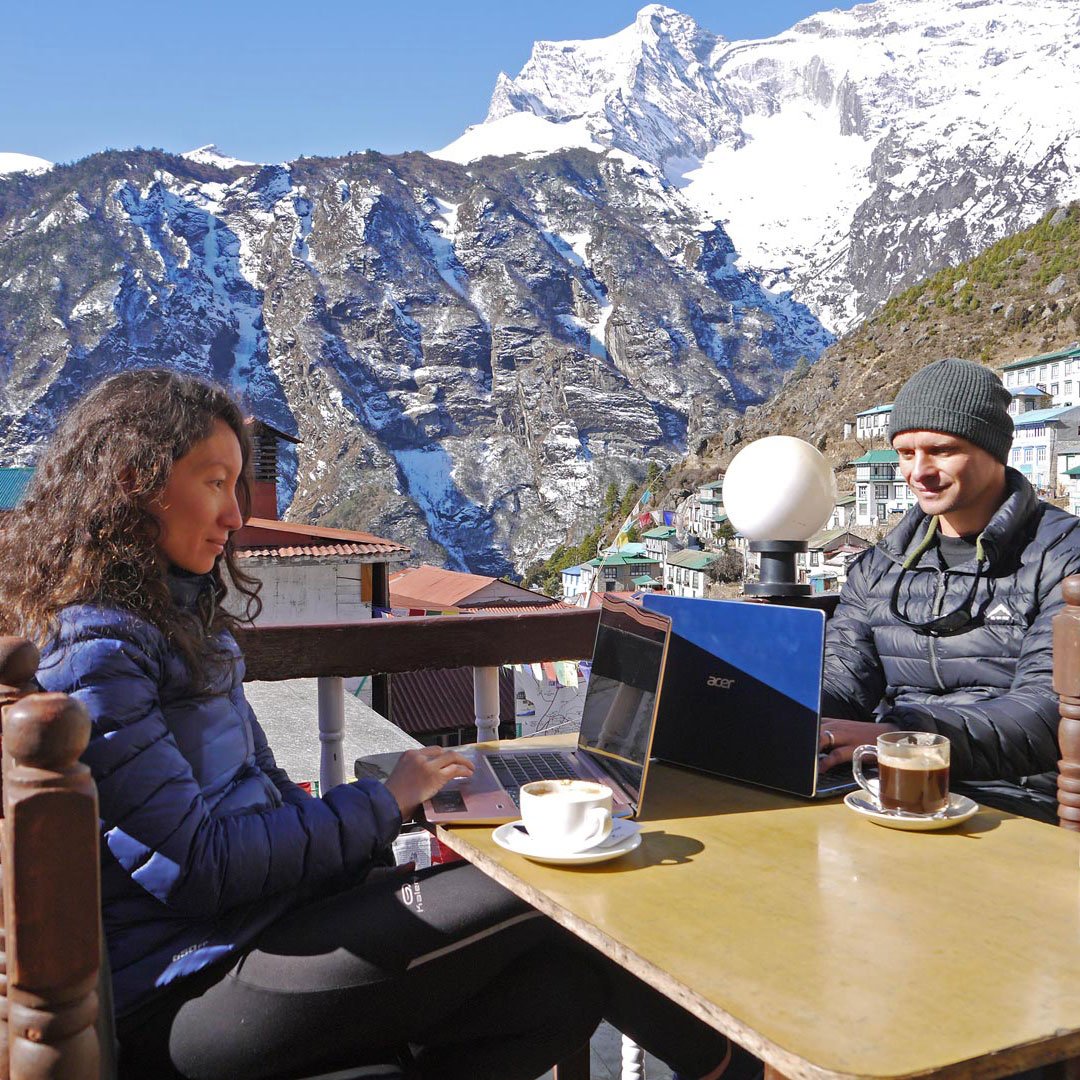
Alya and Campbell
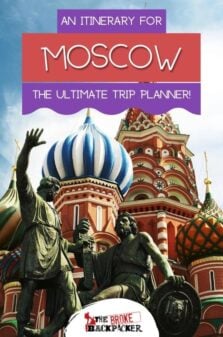
Share or save this post

Leave a Reply Cancel reply
Your email address will not be published. Required fields are marked *
Save my name, email, and website in this browser for the next time I comment.
Notify me of followup comments via e-mail.
Destination guides
Download free Russia travel guides
- St Petersburg
- Golden Ring
- Lake Baikal
- Murmansk (Kola Peninsula)
- Moscow & St Petersburg
- Russia River Cruises
- Expedition Cruises
- Trans-Siberian Tours
- Northern Lights Tours
- Siberia Tours
- Winter Tours
- Students Trips
- Luxury Tours
- Plan My Tour
Start planning my tour
Your Russia, your dates, your mates
- Destination Guides
- Russia Travel Tips
- Russian Visa
- Travel Insurance
- Why 56th Parallel
- Traveller Reviews
Moscow Vibes – Three Day City Escape
Duration 3 days
Price from USD $730 ? Currency Conversion Converted from USD based on the latest exchange rate. Final amount and payment will be in USD. Final conversion rate is determined by your bank.
Trip Style Sightseeing
Time of year All Year
Home / Moscow Tours / Moscow Vibes – Three Day City Escape
- Dates & Prices
This short Moscow tour will give you a true taste of the history, culture and incomparable urban vibe that define one of the world’s largest metropolises. In just three days, this Moscow itinerary takes in all the most iconic sights of this attraction-packed destination. After two and half days getting acquainted with the city, we’ve set time aside for you to explore Moscow your way and discover your own favourite hang-outs in a city overflowing with hidden treasures
3-Day Moscow Tour Highlights:
- Panoramic Tour of Moscow: See Moscow beyond the postcard images on a private excursion by car through the city streets including a drive along the banks of the Moskva River. Visit the famous Bolshoi Theatre, pass by Gorky Park and the Novodevichy Convent, and admire the city from on high at the Sparrow Hill observation platform.
- Moscow Historical City Centre Guided Walking Tour : Immerse yourself in the atmosphere of one of the world’s biggest metropolises and discover local haunts on foot, including the Red Square, the Kremlin and the multi-coloured domes of St Basil’s Cathedral.
- Armory Chamber tour: Explore the endless treasures of this unique museum, displaying the wealth accumulated by Russian rulers from the 12th century until the October Revolution of 1917. Walking through the exhibition halls is a journey through the centuries.
- Moscow Metro Tour : Go deep underground on a subway tour of the famous Moscow metro. The world’s deepest metro system is renowned for its palatial, art-adorned stations, complete with marble columns and chandeliers.
On your first day, you’ll be treated to a panoramic, drive-by tour of Moscow to get a feel for the immense scale of one of the world’s most rapidly developing urban centres. The city’s history unfolds in real-time as you pass lavish imperial mansions, solemn Soviet structures and luxurious modern shopping centres.
Day two kicks off exploring Moscow’s historic centre on foot, followed by a tour of the Kremlin, the seat of Russian power and political intrigue for centuries. Stand in the Red Square, surrounded by the stunning architecture as you hear stories of the people and events behind many of Moscow’s most iconic landmarks.
On your final day, we’ll head beneath the city for a tour of the Moscow Metro and its famously ornate underground stations. Art lovers should hit up one of Moscow’s many world-class galleries such as the Tretyakov State Gallery, the Pushkin Museum or Garage, Moscow’s cutting-edge contemporary art museum. History fans can follow a Soviet trail through the city including Stalin’s Bunker, while those seeking a more indulgent experience can browse trendy neighbourhoods like Kitay Gorod or shop for everything from fashion to kitsch souvenirs at the enchanting Izmaylovo Flea Market. Foodies can head to one of the countless speciality stores sampling vodka, caviar and chocolate.
If you only have a few days to spend in Moscow, this tour will ensure you make the most of your time in the city. Let the experts navigate you through this complex and occasionally overwhelming capital, giving you plenty of time to soak up the city’s most unmissable attractions.
Accomodation
Not Included
Sightseeing
Action rating ?
Type of tour
3 days / 2 nights
Private - Any Date
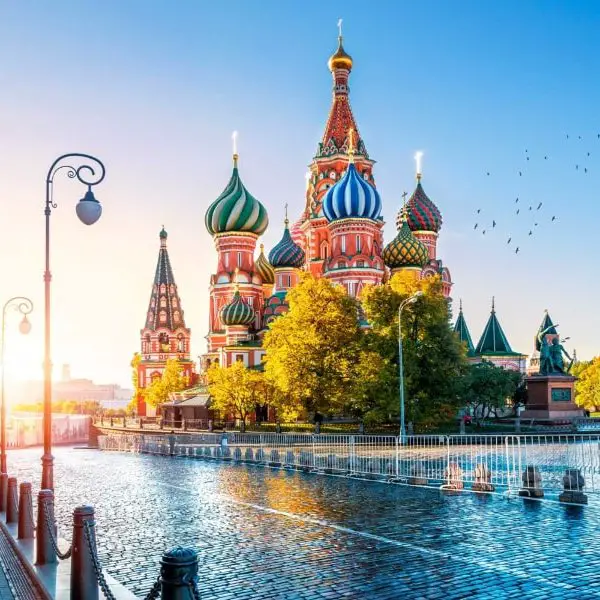
Day 1 Panoramic city tour
Welcome to the glorious capital of Russia, Moscow! You’ll be met by your driver at the airport and taken to your centrally located hotel.
After check-in and rest, meet your private guide at the hotel lobby for a comprehensive tour of Moscow by car. Visit the starkly contrasting Theatre Square to see the stunning Bolshoi Theatre, pass Tverskaya Street, the city’s main boulevard and home to the landmark Yeleseyevskiy Grocery Store.
You’ll enjoy a panoramic drive along the Moskva River, where a huge, controversial state of Peter the Great was erected. Pass by the legendary Gorky Park and the White House before a stop at the architecturally stunning Novodevichy Convent, and the observation platform at Sparrow Hills, for a bird’s eye view over this staggering megalopolis.
Day 2 Red Square and Kremlin
After breakfast at the hotel, your guide will take you on a walking tour of the historical city centre. Stroll through the Red Square, the hub of cultural life in Moscow, with its elaborate ‘stone flower’ fountain and fantasy-like St Basil’s Cathedral – a postcard-perfect symbol of the nation. Admire the grandiose façade of GUM, the city’s most luxurious shopping centre, and visit Alexander’s Garden, with its eternal flame and the chance to watch a changing of the guards.
Break for lunch before continuing on a tour of the Kremlin and Armoury Chamber, famous of its collection of tsarist fashion, with regalia such as jewel-encrusted crowns, orbs and sceptres as well as arms and armour, exotic gifts from the leaders of faraway lands, and an illustrious case of Imperial Faberge eggs.
As an option* spend an evening on a sumptuous dinner cruise, taking in the stunning sights and city lights of this mesmerising metropolis by night.
Day 3 Metro and Arbat Street
Start a day with a tour of Metro, stopping on the way to marvel at some of the most elaborately decorated stations of the world-famous Moscow subway system. Take a stroll along Old Arbat street - the most famous street in Moscow. Through the centuries Arbat used to be one of the most bohemian places in Moscow. Today Arbat is a promenade full of small cozy cafes and street life.
The afternoon is free for you to either enjoy the rest of the day on your own or choose among optional excursions to explore more of Moscow. Visit the Tretyakov Gallery or Pushkin State Museum to admire Russian art. Join locals for a stroll at the Gorky or VDNH park.
Visit beautiful Kolomeskoye Estate or Izmailovo Kremlin, or spend a day exploring the beautiful city of the Golden Ring (Russian province) - Sergiev Posad. In the evening you will be transferred to the airport for your departure to your next destination.

Print this page
Save a printed version of this tour, so you can make a decision later

Send to my inbox
Email yourself or a friend the link for this tour

Ask a question
Have a question about this tour? Our experts will be happy to help
Group airport/train-station arrival and departure transfers
All transportation according to the itinerary with a private driver
4* hotel accommodation in the historical city center (twin/double)
Local licensed English-speaking guide
All activities, indicated in the itinerary, except optional
Entry fees according to the itinerary (skip-the-lines policy)
Russian visa support document
Travel insurance
Russian visa and visa fees. Russian visa can be arranged by 56th Parallel for an additional cost (for Australian citizens only). Apply for concierge visa service here .
Optional excursions/activities
*Private tour. Price is per person, based on min 2 people
Similar tours
Highlights of moscow & st petersburg.
Immerse yourself in the art, history and culture of Russia and explore the contrasting styles of Moscow and St Petersburg in just one week. Experience the iconic landmarks of ...
Golden Ring at a Glance
Take a short detour from Moscow to discover the age-old allure of Russia. Travelling from the capital to the countryside, where golden spires and the onion-shaped domes of ...
Treasures of St Petersburg
This in-depth tour is a fun and fascinating discovery of the legacy of Imperialist Russia, just in one week. A showcase for the wealth and tastes of the Emperors of Russia from ...
Classic Moscow – Art, History and Culture
Breathe in the history of Moscow, explore its Imperial and soviet past, dynamic contemporary culture and lifestyle. On this 5-day tour of Moscow, you'll visit the must-see sights ...
Why travel to Russia with 56th Parallel?
Destination Specialists
Our team offers over 18 years of experience travelling and planning travel in Russia. Delivering outstanding travel experiences in Russia’s capitals and in some of the most stunning & remote locations takes experience, special access and the right connections. We make sure that all the fine details are handled perfectly so you can enjoy your Russia travel experience.
Group & Private Tours
The choice to join a small group on a guaranteed departure or chose to travel on your own dates with your own mates. Each destination we travel to in Russia offers an option between private tours and small group tours. Please note: on our adventure tours in remote destinations, we mostly run group tours to keep the cost down.

Bonded & Licensed
56th Parallel is a fully licensed, insured and accredited travel provider.

From USD $730
Day 1: Panoramic city tour
Day 2: red square and kremlin, day 3: metro and arbat street, not included, start planning your tour.
A destination specialist will follow up on you enquiry shortly. Prefer to chat? Call us on +61 412 587 785 we will be delighted to be of service.
Email this tour to:
Have a question or need specific information.
Send us a note below or call us
Country * Afghanistan Albania Algeria American Samoa Andorra Angola Anguilla Antarctica Antigua and Barbuda Argentina Armenia Aruba Australia Austria Azerbaijan Bahamas Bahrain Bangladesh Barbados Belarus Belgium Belize Benin Bermuda Bhutan Bolivia Bosnia and Herzegowina Botswana Bouvet Island Brazil British Indian Ocean Territory Brunei Darussalam Bulgaria Burkina Faso Burundi Cambodia Cameroon Canada Cape Verde Cayman Islands Central African Republic Chad Chile China Christmas Island Cocos (Keeling) Islands Colombia Comoros Congo Congo, the Democratic Republic of the Cook Islands Costa Rica Cote d'Ivoire Croatia (Hrvatska) Cuba Cyprus Czech Republic Denmark Djibouti Dominica Dominican Republic East Timor Ecuador Egypt El Salvador Equatorial Guinea Eritrea Estonia Ethiopia Falkland Islands (Malvinas) Faroe Islands Fiji Finland France France Metropolitan French Guiana French Polynesia French Southern Territories Gabon Gambia Georgia Germany Ghana Gibraltar Greece Greenland Grenada Guadeloupe Guam Guatemala Guinea Guinea-Bissau Guyana Haiti Heard and Mc Donald Islands Holy See (Vatican City State) Honduras Hong Kong Hungary Iceland India Indonesia Iran (Islamic Republic of) Iraq Ireland Israel Italy Jamaica Japan Jordan Kazakhstan Kenya Kiribati Korea, Democratic People's Republic of Korea, Republic of Kuwait Kyrgyzstan Lao, People's Democratic Republic Latvia Lebanon Lesotho Liberia Libyan Arab Jamahiriya Liechtenstein Lithuania Luxembourg Macau Macedonia, The Former Yugoslav Republic of Madagascar Malawi Malaysia Maldives Mali Malta Marshall Islands Martinique Mauritania Mauritius Mayotte Mexico Micronesia, Federated States of Moldova, Republic of Monaco Mongolia Montserrat Morocco Mozambique Myanmar Namibia Nauru Nepal Netherlands Netherlands Antilles New Caledonia New Zealand Nicaragua Niger Nigeria Niue Norfolk Island Northern Mariana Islands Norway Oman Pakistan Palau Panama Papua New Guinea Paraguay Peru Philippines Pitcairn Poland Portugal Puerto Rico Qatar Reunion Romania Russian Federation Rwanda Saint Kitts and Nevis Saint Lucia Saint Vincent and the Grenadines Samoa San Marino Sao Tome and Principe Saudi Arabia Senegal Seychelles Sierra Leone Singapore Slovakia (Slovak Republic) Slovenia Solomon Islands Somalia South Africa South Georgia and the South Sandwich Islands Spain Sri Lanka St. Helena St. Pierre and Miquelon Sudan Suriname Svalbard and Jan Mayen Islands Swaziland Sweden Switzerland Syrian Arab Republic Taiwan, Province of China Tajikistan Tanzania, United Republic of Thailand Togo Tokelau Tonga Trinidad and Tobago Tunisia Turkey Turkmenistan Turks and Caicos Islands Tuvalu Uganda Ukraine United Arab Emirates United Kingdom United States United States Minor Outlying Islands Uruguay Uzbekistan Vanuatu Venezuela Vietnam Virgin Islands (British) Virgin Islands (U.S.) Wallis and Futuna Islands Western Sahara Yemen Yugoslavia Zambia Zimbabwe
If you have any urgent questions or enquiries, please give us a call +61 412 587 785

IMAGES
COMMENTS
In terms of the travel industry, a metasearch engine is used to compare Online Travel Agencies or OTAs. Metasearch engines like TripAdvisor and Kayak make money by the fee paid to them by the OTA. Let's say that an online trip planner booked a certain OTA through TripAdvisor. This will result in payment to TripAdvisor by the OTA that was booked.
Step 1: Requirement Analysis. The first step in building a custom search engine is to thoroughly understand and analyze the requirements. This involves working with stakeholders to gather their needs and expectations. The team defines the scope, goals, and specific functionality that the search engine must provide.
TripAdvisor Metasearch offers travelers direct booking and allows comparison shopping. Skyscanner. Skyscanner is both a metasearch engine and travel agency. The booking tool is quite popular among gen-Z and millennials. Skyscanner offers its users' destination research and booking travel products like flights, hotels, and cabs. Kayak.
Metasearch helps travelers with one the most important factors when considering travel: price. Travelers use metasearch when they're ready to book, making it a bottom of funnel tool with a high ...
Metasearch engines are a great way for hotels to boost direct bookings online. ... Today, travelers increasingly use the Internet to research and plan trips. This includes destination search, comparing airfares and room rates, as well as looking for travel packages that combine stays with activities and attractions.
Meta search engines allow you to increase brand visibility online significantly and higher ranking. For the competitive travel industry, this is very important. Notably, the meta search engine is a sort of an extension of partnerships with OTAs, which increases sales opportunities. 2. Preferential advertising rates.
travel metasearch engine. Platforms: iOS, Android, Web. Jetradar claims to be "the fastest travel search engine on the web," drawing results from more than 1043 airlines and 200+ booking agencies for flights, hotels, cars, and busses. Jetradar is similar to other travel metasearch engines in filters and sorted results.
Travel metasearch engines will help hoteliers to reign control of their distribution pricing. This means that hotels must take serious steps to create a strong presence in meta sites. But, hoteliers take an off-hands approach. Many are in the mindset that once they are listed, bookings will keep flowing.
The top metasearch sites in the world include Google, Tripadvisor, Kayak, and Trivago. Google is relatively new to the hotel side of metasearch, having launched their Hotels product in 2019. Hotels can not only bid on ad placement, but also add custom text and receive a blue "verified" check mark which builds credibility.
Travel metasearch is a lead generation platform that allows consumers to compare rates from multiple online travel agencies and suppliers, usually in a single grid. The sector has attracted several billion dollars in investment in the last couple of years from Priceline, Expedia, Google and Sequoia Capital, to name a few, and metasearch, in the ...
Metasearch—a search engine where third-party suppliers such as OTAs, brands, and independents are aggregated and compared—has particularly gained popularity in recent years due to its ability to simplify the online shopping process and aggregate competitive hotel prices. To continually innovate and face the challenges presented by COVID-19 ...
The tug-of-war between metasearch engines and OTAs pivots around three main factors: price, convenience, and trust. In the price competition, metasearch engines usually take the crown. By enabling users to directly compare a multitude of flight options, they empower users to secure the cheapest ticket available.
Metasearch marketing is the use of metasearch engines by hotels as an advertising channel to increase exposure, build awareness, and attract bookings. Metasearch advertising places a hotel or destination in search result listings and includes real-time room rates and a direct link to the hotel's website. Depending on the site, hotels may also ...
An Online Travel Agency is a website that traditionally offers both search and booking capabilities. OTA services usually include flights, hotels, and rental cars, with some also offering vacation rentals, cruises, and events/activities. A Metasearch Engine is one overarching search engine that aggregates data from various sources (including ...
A screenshot of Tripadvisor hotel metasearch comparing rates from Hyatt, for example, with those on Booking.com, Trip.com, and Agoda. Source: Tripadvisor. For its part, Trivago notched a net loss ...
As the standard methods of doing business — bookings for OTAs, referrals for metasearch — evolve with new technology, the relationship between online travel agencies (OTAs), and metasearch continues to evolve. Metasearch sites such as Kayak originally presented travelers with a spectrum of inventory before sending to an OTA for booking, Now ...
A meta search engine is a tool that aggregates data from other search engines in order to produce results to the user. In the travel industry, meta search engines aggregate rates and availability of hotels from different sources, mainly OTAs but sometimes directly from the hotels. This makes it easier for users to find a hotel by simply ...
4.7 star rating. Add to Safari. Google Flights, Kayak, and Skyscanner are probably your best bets out of the 24 options considered. "Ability to compare price for many dates at once" is the primary reason people pick Google Flights over the competition.
A slim plurality of travelers in a new Consumer Travel Alliance poll (37 percent) say they click on a meta-search site first. Another 35 percent begin with the airlines' own websites, such as AA.com and Delta.com. About 1 in 5 travelers go directly to an online agency, while only 7 percent call a travel agent and 2 percent visit a search engine ...
3. Marvel at St. Basil's Cathedral. St. Basil's Cathedral is one of the most iconic churches in the world, and it was the single thing we were most excited to see while in Moscow. Built almost 500 years ago, St. Basil's Cathedral is recognized by its colorful domes and whimsical style.
EPIC MOSCOW Itinerary! (2024) Moscow is the heart of Mother Russia. Just the mention of this city conjures images of colorful bulbous pointed domes, crisp temperatures, and a uniquely original spirit! Moscow has an incredibly turbulent history, a seemingly resilient culture, and a unique enchantment that pulls countless tourists to the city ...
Trip request Have your best rest in the restless city of Moscow! Moscow is the biggest city of Russia, with more than 12 million citizens, 400 museums, 11 000 restaurants, and around 500 parks. Our individual tours are here to help you not to get lost in the Russian capital's vibrant rhythm and explore the most exciting spots of Moscow with ...
3-Day Moscow Tour Highlights: Panoramic Tour of Moscow: See Moscow beyond the postcard images on a private excursion by car through the city streets including a drive along the banks of the Moskva River. Visit the famous Bolshoi Theatre, pass by Gorky Park and the Novodevichy Convent, and admire the city from on high at the Sparrow Hill ...